Jummer,

1965
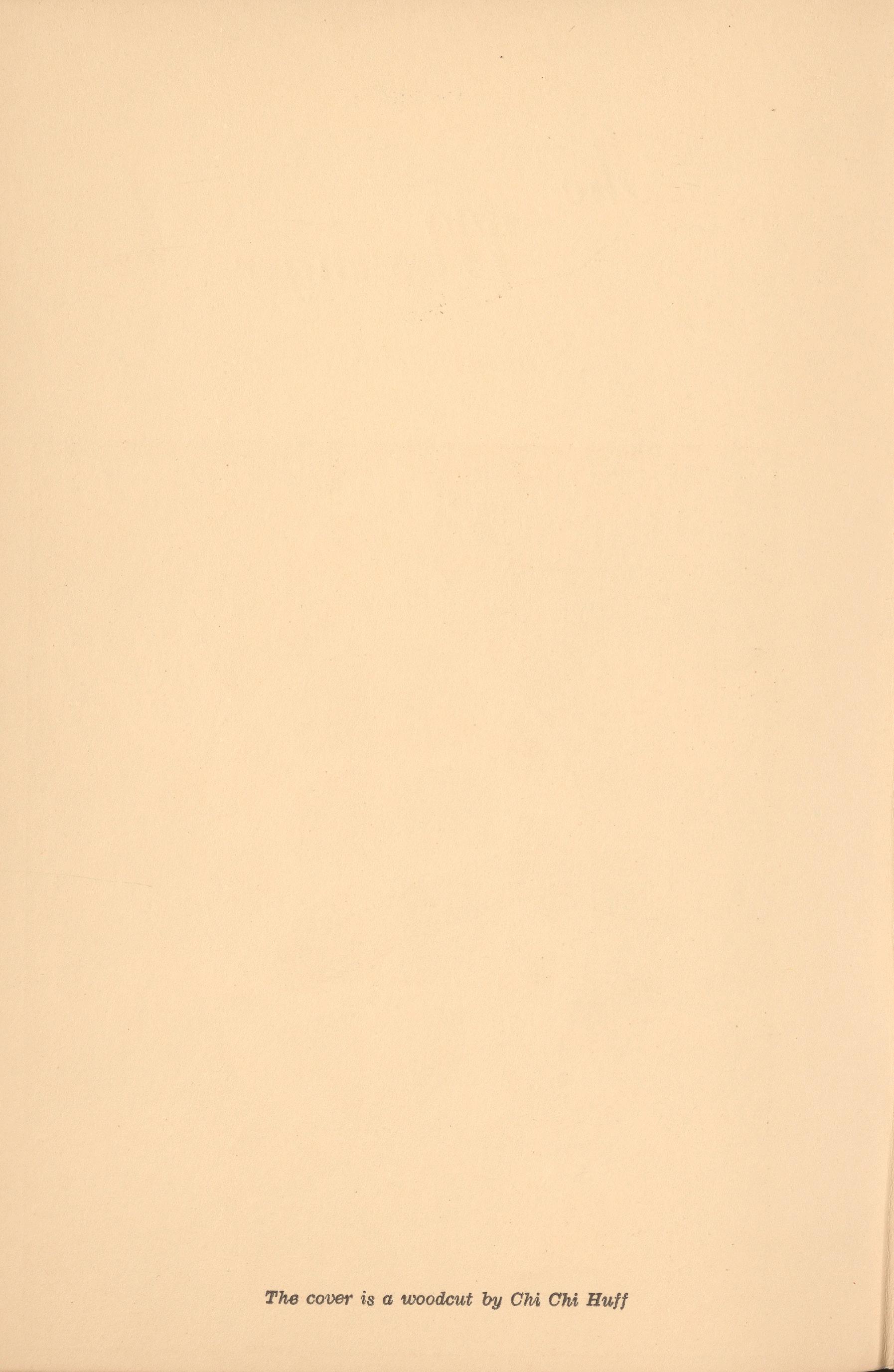
UNIVERSITY
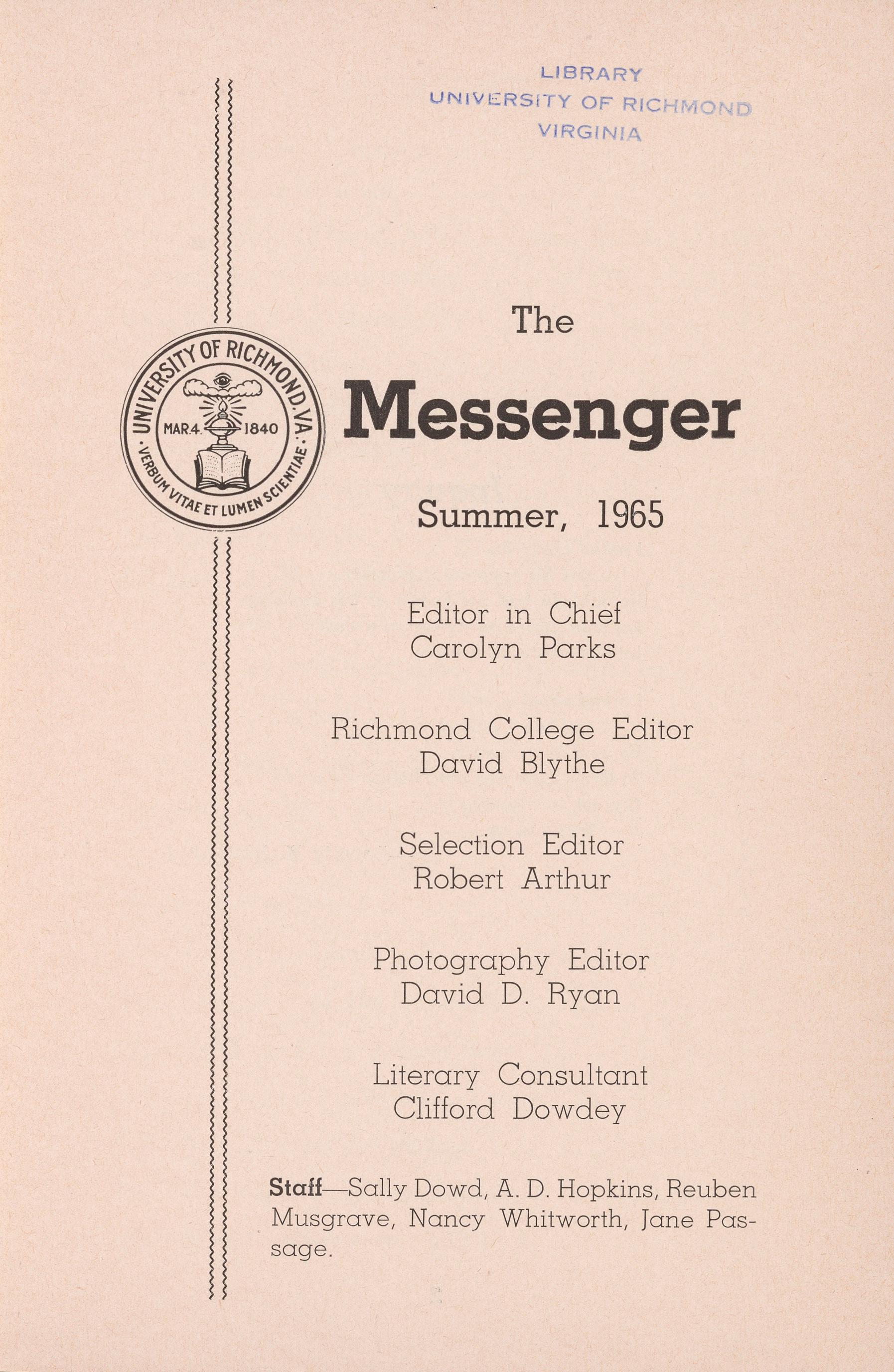


1965

UNIVERSITY

Editor in Chief
Carolyn Parks
Richmond College Editor
David Blythe
Selection Editor
Robert Arthur
Photography Editor
David D. Ryan
Literary Consultant
Clifford Dowdey
Staff-Sally Dowd, A . D. Hopkins, Reuben Musgrave, Nancy Whitworth, Jane Passage.

I asked about man and his apparent conformity. He said He had not known of this similarity , For man should be viewed as a soul. Let him create, let him live
I asked about myself and how I existed. He said to be aware To throw back your arms before the world. Cry out your guiltThen rise up . - Lo re tt a M . B irck h ead
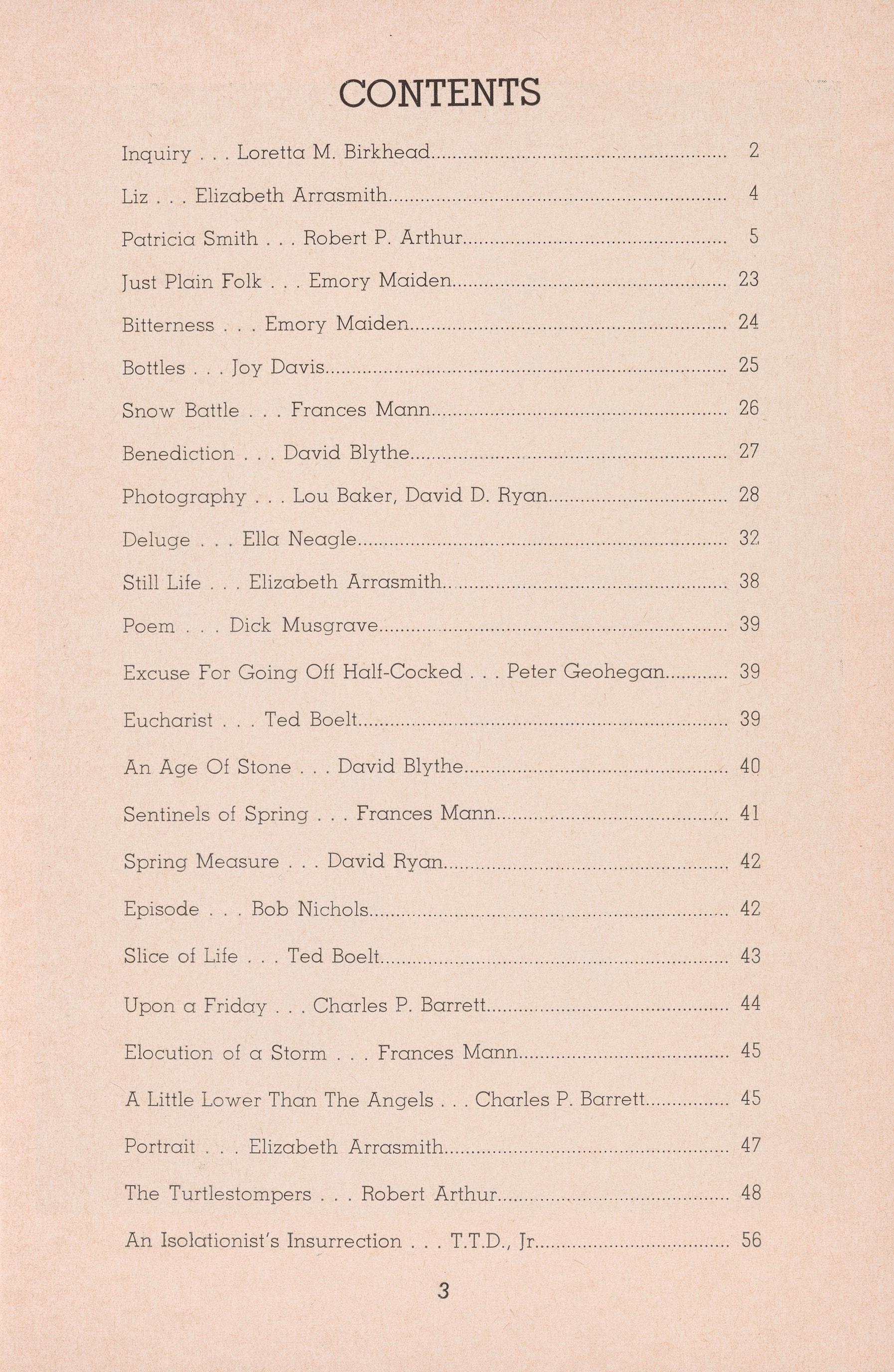
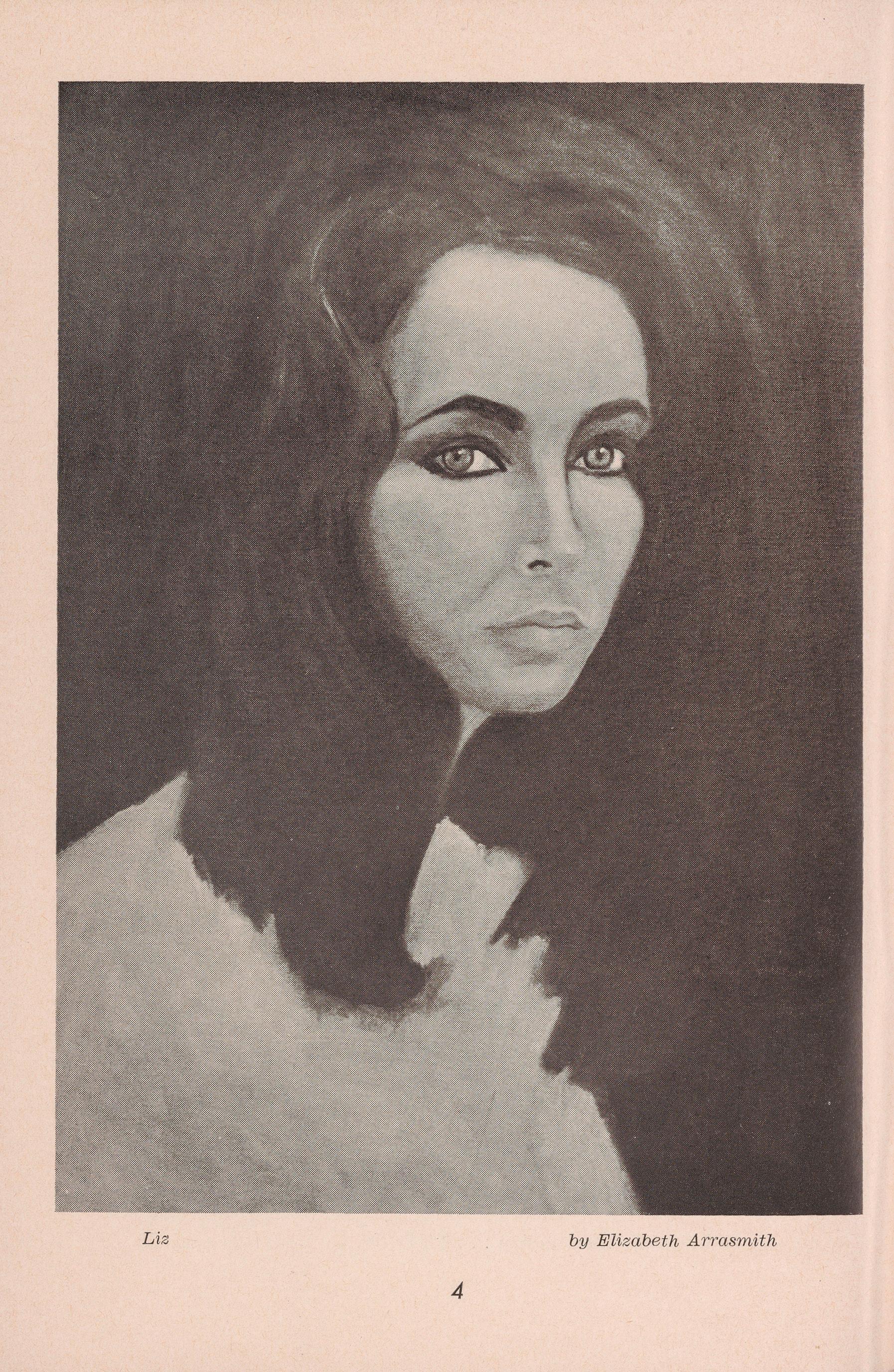
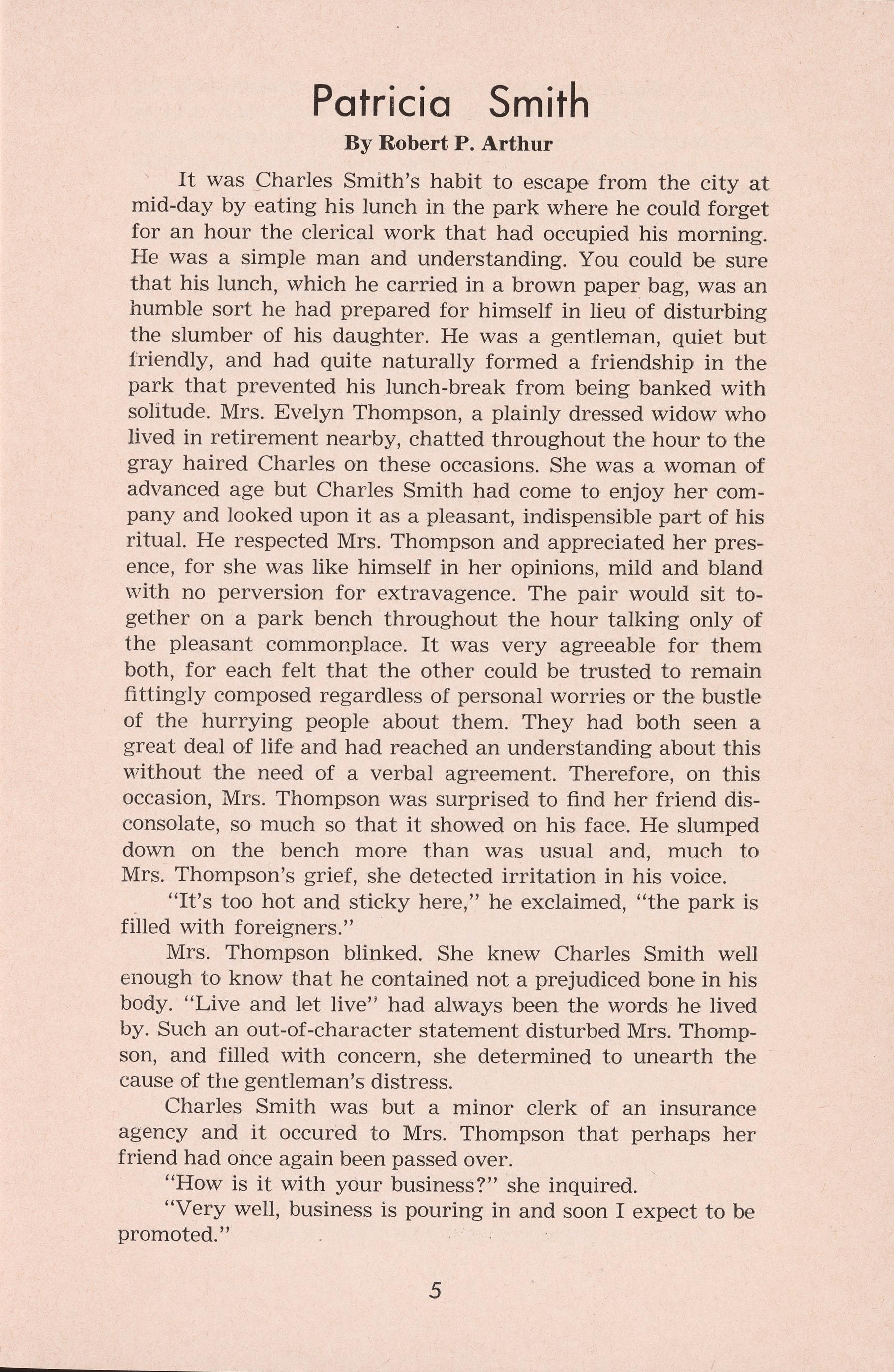
By Robert P. Arthur
It was Charles Smith's habit to escape from the city at mid-day by eating his lunch in the park where he could forget for an hour the clerical work that had occupied his morning. He was a simple man and understanding. You could be sure that his lunch, which he carried in a brown paper bag, was an humble sort he had prepared for himself in lieu of disturbing the slumber of his daughter. He was a gentleman, quiet but friendly, and had quite naturally formed a friendship in the park that prevented his lunch-break from being banked with solitude. Mrs. Evelyn Thompson, a plainly dressed widow who lived in retirement nearby, chatted throughout the hour to the gray haired Charles on these occasions. She was a woman of advanced age but Charles Smith had come to enjoy her company and looked upon it as a pleasant, indispensible part of his ritual. He respected Mrs. Thompson and appreciated her presence, for she was like himself in her opinions, mild and bland with no perversion for extravagence. The pair would sit together on a park bench throughout the hour talking only of the pleasant commonplace. It was very agreeable for them both, for each felt that the other could be trusted to remain fittingly composed regardless of personal worries or the bustle of the hurrying people about them. They had both seen a great deal of life and had reached an understanding about this without the need of a verbal agreement. Therefore, on this occasion, Mrs. Thompson was surprised to find her friend disconsolate, so much so that it showed on his face. He slumped down on the bench more than was usual and, much to Mrs. Thompson's grief, she detected irritation in his voice.
_ "It's too hot and sticky here," he exclaimed, "the park is filled with foreigners."
Mrs. Thompson blinked. She knew Charles Smith well enough to know that he contained not a prejudiced bone in his body. "Live and let live" had always been the words he lived by. Such an out-of-character statement disturbed Mrs. Thompson, and filled with concern, she determined to unearth the cause of the gentleman's distress.
Charles Smith was but a minor clerk of an insurance agency and it occured to Mrs. Thompson that perhaps her friend had once again been passed over.
"How is it with your business?" she inquired.
"Very well, business is pouring in and soon I expect to be promoted.''

Mrs. Thompson blinked again. It was evident that his station in life had nothing to do with his vexation. But to be sure, something was troubling him He was normally a very pleasant gentleman. His health was good, his salary was sufficient to meet his needs and he lived in contentment with a daughter whom he dearly loved. There seemed to be no reason for his discontent. He normally sprinkled their conversations together with tight smiles and gay little laughs but now he was entirely silent. His brow was wrinkled and his eyes were sullen under his knitted brows. He appeared half-ready to sp r ing away but something was holding him back.
To break the t2nsion, Mrs. Thompson reflected and brought up a topic on which she knew that Charles Smith loved to speak.
"How is your daughter? Have all the plans for her wedding been made?"
"She's not going to get married."
"What, I thought everything was set."
"It was but it's not going to come off."
"Why," exclaimed Mrs. Thompson "have you found reason to disapprove of Henry?"
"Of course not," shouted Charles, "why should I disapprove? Henry Martin is a damn sight clearer sighted than my daughter ."
"Well? What has happened?"
Charles Smith's frown grew darker. "All I know is that my daughter has made a damn fool of herself." Mrs Thompson blinked. Never before had she heard him refer to his daughter in anything but glowing terms.
"That seems hard to believe, Charles. You've always said your daughter was level headed enough to be your mother. How could she go wrong?"
"I'd rather not talk about it if you don't mind."
Mrs. Thompson looked at him with curiosity. Charles Smith scowled and looked at the ground . His face was grave and appeared older than Mrs. Thompson knew it to be. She took her knitting from her pocketbook and deciding to change the subject began her work.
"The paper says it's going to be much cooler tonight," s he said.
Charles Smith was so disturbed that he didn't bother to respond to her statement. He hadn't touched his lunch.
"Look here Charles" she said "you don't have to be so rude."
A look of anxiety passed over Charles' face. He had not

meant his state of mind to be contagious. It hadn't occurred to him that he was upsetting Mrs. Thompson. Now that he realized she was upset he was repentant and tried to pull himself together.
"I'm sorry," he said, "I shouldn't have been so unkind but the fact of the matter is that I'm rather distracted."
Mrs. Thompson laughed, "Really, Charles, I would never have suspected ... "
"It's about that damned daughter of mine," he said. "Why don't we go over to the cafe for a cup of coffee and I'll tell you about it. Let's break our rule this one time."
"I think we'd better."
"Good," said Charles with a faint smile. "When I finish the story I'll bet you will agree that it's something that's got to be talked over between friends."
"That's a good bet, I'm sure," said Mrs. Thompson as Charles Smith took her arm.
At the cafe the two friends sat in a booth and faced each other across the table. Coffee was ordered and brought. And this is the story that Charles Smith told his companion.
The girl of whom he spoke was his only daughter. Her name was Patricia and, of course, was sometimes called Pat. She was twenty-one. Charles Smith had no other family and it fell to Pat to bear her father's pampering alone. It is to her credit that she was neither spoiled by, nor made resentful by her father's doting. There was no doubt that this accomplishment was difficult because Charles Smith was extravagant even for a doting parent when it came time for the parceling out of money or praise for his daughter. Just the mention of her name would cause a smile to flicker\ across his face. In most things Charles Smith was easy and constrained but his conservatism lost its hold when it came to his daughter. He thought the world of her. Nothing was too good for Patricia. Charles Smith found it hard to take his eyes off her. You could not blame him, for the fact was that Patricia was the kind of daughter that any parent might be proud of.
She had long brown hair that was as soft as velvet and an extraordinarily pretty face. She did not possess a sultry look but rather the opposite. She had wholesome features and skin that seemed to be well scrubbed; white but tinted with rose so that it seemed to be in perfect taste regardless of the quarters frequented, which for her were many and varied. She blended in perfectly with the out-of-doors whether it was dark and raining or light and filled with sunshine. She was as beautiful in the modest Smith home as she would have been in a
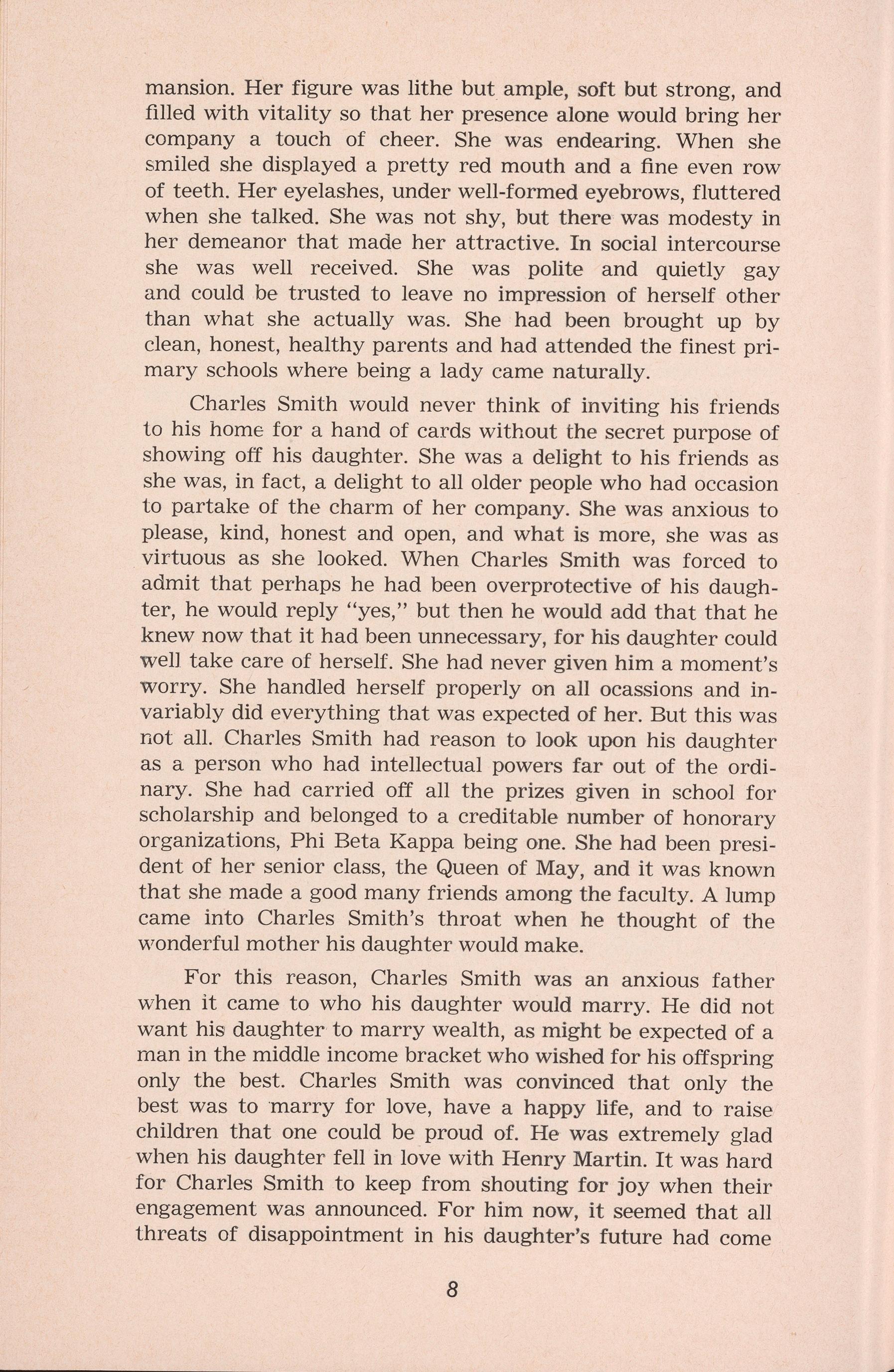
mansion. Her figure was lithe but ample, soft but strong, and filled with vitality so that her presence alone would bring her company a touch of cheer. She was endearing. When she smiled she displayed a pretty red mouth and a fine even row of teeth. Her eyelashes, under well-formed eyebrows, fluttered when she talked. She was not shy, but there was modesty in her demeanor that made her attractive. In social intercourse she was well received. She was polite and quietly gay and could be trusted to leave no impression of herself other than what she actually was. She had been brought up by clean, honest, healthy parents and had attended the finest primary schools where being a lady came naturally .
Charles Smith would never think of inviting his friends to his home for a hand of cards without the secret purpose of showing off his daughter. She was a delight to his friends as she was, in fact, a delight to all older people who had occasion to partake of the charm of her company. She was anxious to please, kind, honest and open, and what is more, she was as virtuous as she looked. When Charles Smith was forced to admit that perhaps he had been overprotective of his daughter, he would reply "yes," but then he would add that that he knew now that it had been unnecessary, for his daughter could well take care of herself. She had never given him a moment's worry. She handled herself properly on all ocassions and invariably did everything that was expected of her . But this was not all . Charles Smith had reason to look upon his daughter as a person who had intellectual powers far out of the ordinary. She had carried off all the prizes given in school for scholarship and belonged to a creditable number of honorary organizations, Phi Beta Kappa being one. She had been president of her senior class, the Queen of May, and it was known that she made a good many friends among the faculty. A lump came into Charles Smith's throat when he thought of the wonderful mother his daughter would make.
For this reason, Charles Smith was an anxious father when it came to who his daughter would marry. He did not want his daughter to marry wealth, as might be expected of a man in the middle income bracket who wished for his offspring only the best. Charles Smith was convinced that only the best was to marry for love, have a happy life, and to raise children that one could be proud of. He was extremely glad when his daughter fell in love with Henry Martin. It was hard for Charles Smith to keep from shouting for joy when their engagement was announced. For him now, it seemed that all threats of disappointment in his daughter 's future had come
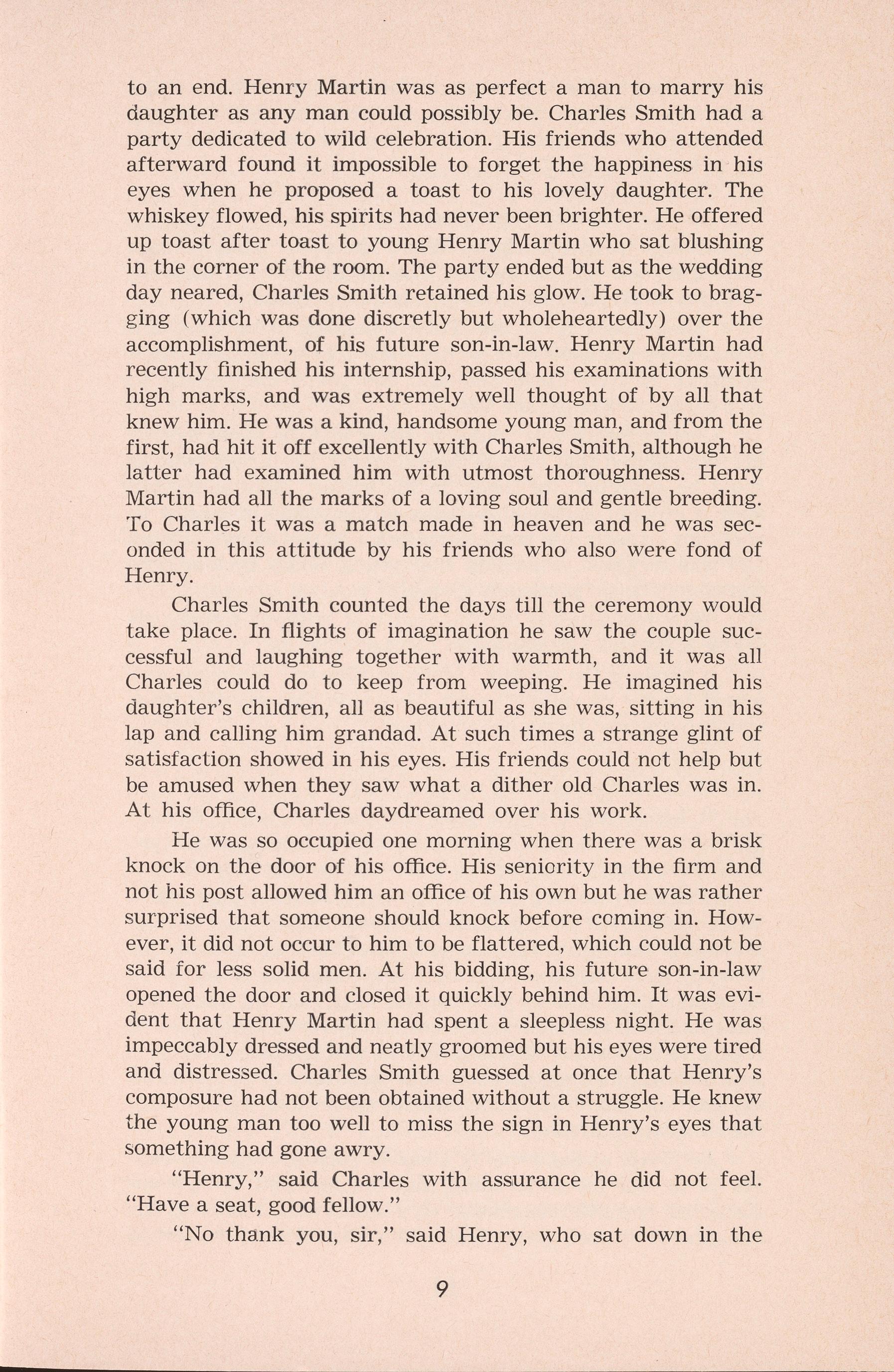
to an end. Henry Martin was as perfect a man to marry his daughter as any man could possibly be. Charles Smith had a party dedicated to wild celebration. His friends who attended afterward found it impossible to forget the happiness in his eyes when he proposed a toast to his lovely daughter. The whiskey flowed, his spirits had never been brighter. He offered up toast after toast to young Henry Martin who sat blushing in the corner of the room. The party ended but as the wedding day neared, Charles Smith retained his glow. He took to bragging (which was done discretly but wholeheartedly) over the accomplishment, of his future son-in-law. Henry Martin had recently finished his internship, passed his examinations with high marks, and was extremely well thought of by all that knew him. He was a kind, handsome young man, and from the first, had hit it off excellently with Charles Smith, although he latter had examined him with utmost thoroughness. Henry Martin had all the marks of a loving soul and gentle breeding. To Charles it was a match made in heaven and he was seconded in this attitude by his friends who also were fond of Henry.
Charles Smith counted the days till the ceremony would take place. In flights of imagination he saw the couple successful and laughing together with warmth, and it was all Charles could do to keep from weeping. He imagined his daughter's children, all as beautiful as she was, sitting in his lap and calling him grandad. At such times a strange glint of satisfaction showed in his eyes. His friends could not help but be amused when they saw what a dither old Charles was in. At his office, Charles daydreamed over his work.
He was so occupied one morning when there was a brisk knock on the door of his office. His seniority in the firm and not his post allowed him an office of his own but he was rather surprised that someone should knock before coming in. However, it did not occur to him to be flattered, which could not be said for less solid men. At his bidding, his future son-in-law opened the door and closed it quickly behind him. It was evident that Henry Martin had spent a sleepless night. He was impeccably dressed and neatly groomed but his eyes were tired and distressed. Charles Smith guessed at once that Henry's composure had not been obtained without a struggle. He knew the young man too well to miss the sign in Henry's eyes that something had gone awry.
"Henry," said Charles with assurance he did not feel. "Have a seat, good fellow."
"No thank you, sir," said Henry, who sat down in the
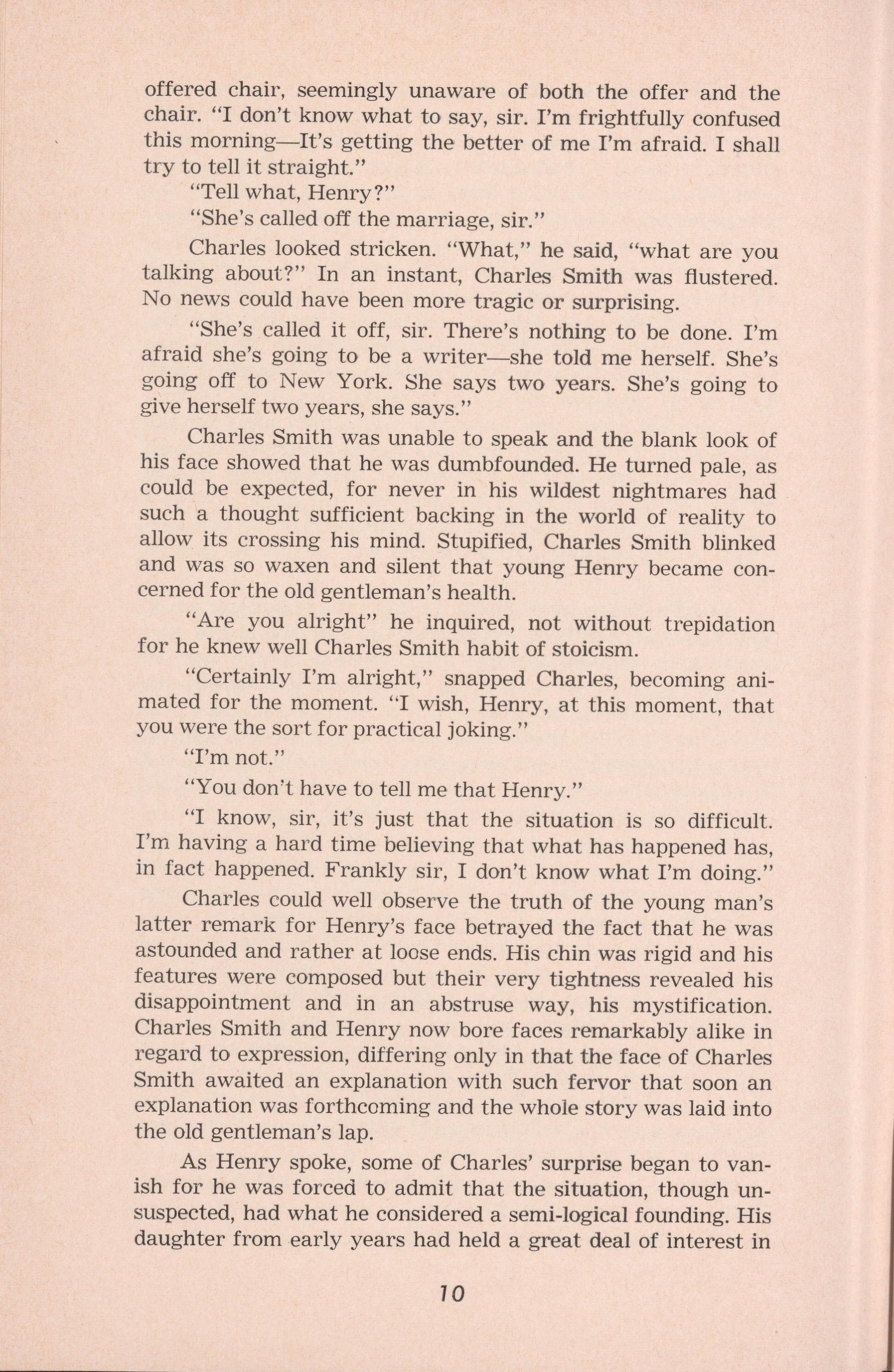
offered chair, seemingly unaware of both the offer and the chair. "I don't know what to say, sir. I'm frightfully confused this morning-It's getting the better of me I'm afraid. I shall try to tell it straight."
"Tell what, Henry?"
"She's called off the marriage, sir."
Charles looked stricken. "What," he said, "what are you talking about?" In an instant, Charles Smith was flustered. No news could have been more tragic or surprising.
"She's called it off, sir. There's nothing to be done. I'm afraid she's going to be a writer-she told me herself. She's going off to New York. She says two years. She's going to give herself two years, she says."
Charles Smith was unable to speak and the blank look of his face showed that he was dumbfounded. He turned pale, as could be expected, for never in his wildest nightmares had such a thought sufficient backing in the world of reality to allow its crossing his mind. Stupified, Charles Smith blinked and was so waxen and silent that young Henry became concerned for the old gentleman's health.
"Are you alright" he inquired, not without trepidation for he knew well Charles Smith habit of stoicism.
"Certainly I'm alright," snapped Charles, becoming animated for the moment. "I wish, Henry, at this moment, that you were the sort for practical joking."
"I'm not."
"You don 't have to tell me that Henry "
"I know, sir, it's just that the situation is so difficult. I'm having a hard time believing that what has happened has, in fact happened. Frankly sir, I don't know what I'm doing."
Charles could well observe the truth of the young man's latter remark for Henry's face betrayed the fact that he was astounded and rather at loose ends. His chin was rigid and his features were composed but their very tightness revealed his disappointment and in an abstruse way, his mystification. Charles Smith and Henry now bore faces remarkably alike in regard to expression, differing only in that the face of Charles Smith awaited an explanation with such fervor that soon an explanation was forthcoming and the whole story was laid into the old gentleman's lap.
As Henry spoke, some of Charles' surprise began to vanish for he was forced to admit that the situation, though unsuspected, had what he considered a semi-logical founding. His daughter from early years had held a great deal of interest in

literature. In fact, Charles had encouraged her all he could and was proud of her successes, which were modest to be sure, along those lines.
In tender years, she began scribbling verses in her spare time and for ,her age they were quite good and Charles had been justly proud; what is more, if the truth were told, he had been downright boastful of his daughter's talent and always managed to turn a conversation in pursuit of her praise. He had fond memories of his daughter reciting her little lyrics in front of the fireplace, projecting her voice with all the skill of a young Cicero. Charles was a bad reader and to him her poems were extraordinarily good, but at the same time, h e would have been equally as pleased if her talents had lain in rope-skipping. He would have been proud of his daughter's accomplishments no matter what they were and would have encouraged her in any direction she chose for herself.
She chose, in her adolescent years, on top of all her other activities to switch to short stories and of course he was consulted before the switch became official. He told his daughter that if she was inclined to switch then switch she should and the matter was settled. The recitation stopped as a result but as a consolation, Charles now had a story to read each Sunday after Church and each Wednesday night after supper. Patricia listened attentively to her father's criticism and responded to his suggestions for tighter plots, stronger characters, etc, with fervor matched only by Charles' enthusiasm. It was a sad day for Charles when he confessed that he could offer his daughter no more help and admitted that she had passed the point where his scant ability could be of use. When Patricia reached college, Charles Smith served as a willing audience and nothing more but the personal closeness that resulted made it well worth while for both parties. Patricia's stories dealt with things that had been so dear to her; family closeness, personal beliefs taught by her father, crossed her pages. At times, the stories seemed to be love letters to the world, an attitude Charles regarded as being endearing as commendable. Her stories were intensely personal and served to round out the mutual understanding between father and daughter. However, as intimate as they were, they served another end, which added to Charles' delight and heaped coal, so to speak, on the fire of a father's pride. The stories had won several literary prizes from the college. Some were very touching in a commercial sense and highly thought of by the faculty, so much so that Patricia found herself possessing a small but pleasing literary reputation.
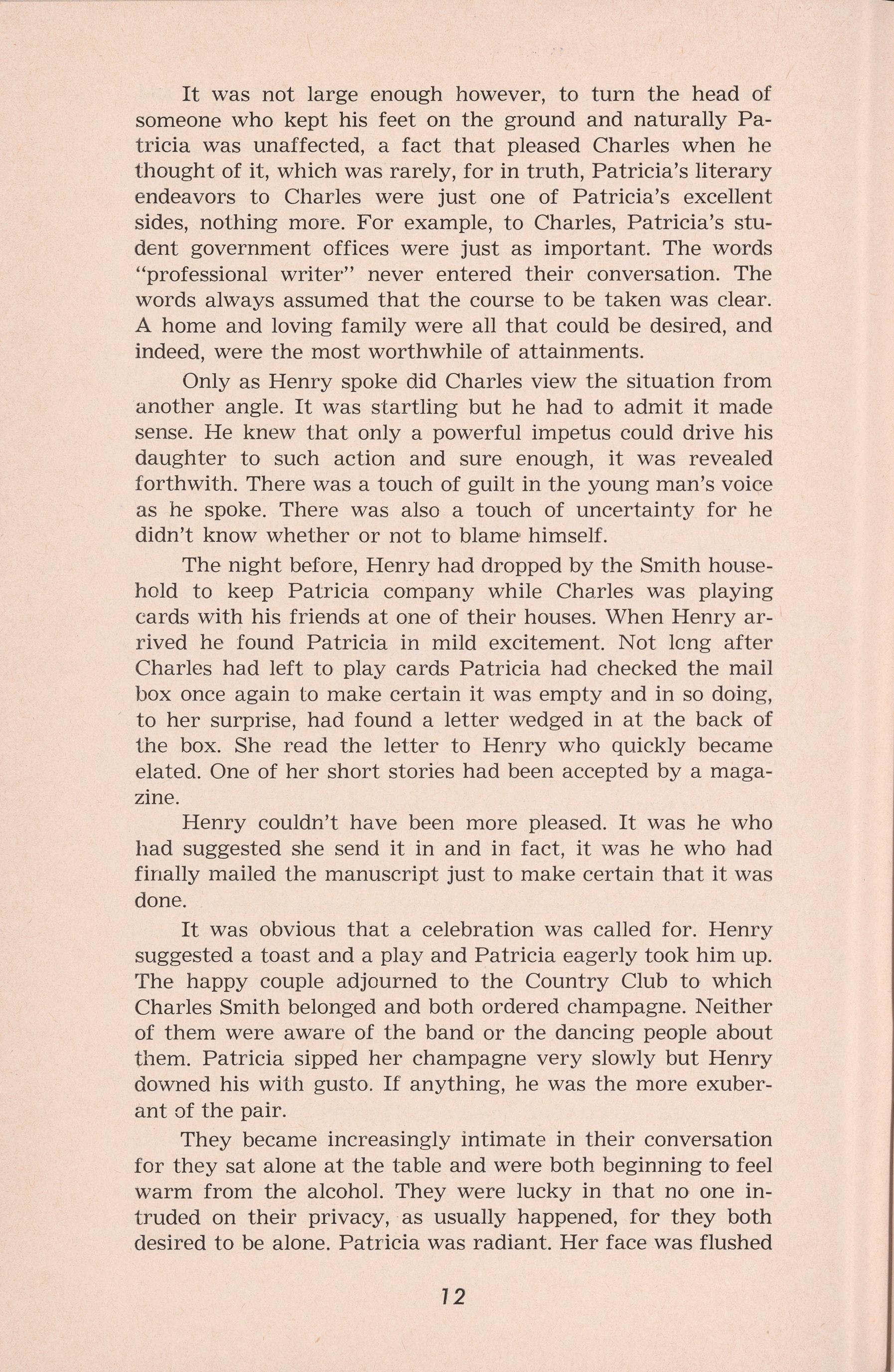
It was not large enough however, to turn the head of someone who kept his feet on the ground and naturally Patricia was unaffected, a fact that pleased Charles when he thought of it, which was rarely, for in truth, Patricia's literary endeavors to Charles were just one of Patricia's excellent sides, nothing more. For example, to Charles, Patricia's student government offices were just as important. The words "professional writer" never entered their conversation. The words always assumed that the course to be taken was clear. A home and loving family were all that could be desired, and indeed, were the most worthwhile of attainments.
Only as Henry spoke did Charles view the situation from another angle. It was startling but he had to admit it made sense. He knew that only a powerful impetus could drive his daughter to such action and sure enough, it was revealed forthwith. There was a touch of guilt in the young man's voice as he spoke. There was also a touch of uncertainty for he didn't know whether or not to blame himself.
The night before, Henry had dropped by the Smith household to keep Patricia company while Charles was playing cards with his friends at one of their houses. When Henry arrived he found Patricia in mild excitement. Not long after Charles had left to play cards Patricia had checked the mail box once again to make certain it was empty and in so doing, to her surprise, had found a letter wedged in at the back of the box. She read the letter to Henry who quickly became elated. One of her short stories had been accepted by a magazine.
Henry couldn't have been more pleased. It was he who had suggested she send it in and in fact, it was he who had finally mailed the manuscript just to make certain that it was done.
It was obvious that a celebration was called for. Henry suggested a toast and a play and Patricia eagerly took him up. The happy couple adjourned to the Country Club to which Charles Smith belonged and both ordered champagne. Neither of them were aware of the band or the dancing people about them. Patricia sipped her champagne very slowly but Henry downed his with gusto. If anything, he was the more exuberant of the pair.
They became increasingly intimate in their conversation for they sat alone at the table and were both beginning to feel warm from the alcohol. They were lucky in that no one intruded on their privacy, ·as usually happened, for they both desired to be alone. Patricia was radiant. Her face was flushed

and her eyes flashed with gaiety .' They foc u sed on ly on Hemy and were so sublime that the latter could barely control his emotions. The words between the lovers flew soft and fast. Henry spoke of things he had never spoke of before;
It was regrettable, perhaps, that from the lips of Henry came the name Paul Gauguin for soon a discussion of art was launched . atld Henry was left far behind. Patricia spoke of his technique, his innovations, his desertion of family. Henry listened to her with admiration; it was beautiful to him that Patricia could be so interested and talk so eloquently-the champagne had evidently loosened the young woman's control for her hands began to express the inexpressible by gestures that ,,vere lovely to watch. Henry goaded her on by asking questions and showing delight in what she said-never before had he seen her express her appreciation of art with such sincerity. He ordered two more glasses of champagne and they were quickly brought. The champagne fizzled in the crystal glasses as if in accord with the tone of the conversation. Then Henry made a mistake.
He began to speak of the trials an artist must face. He touched again on Gauguin and went to Joyce. From Joyce he went to Flaubert and from Flaubert to Poe, to Pound to Keats, and finally to Proust. He spoke of the separation, the setbacks, the dismay the artist must experience and he spoke with a layman's knowledge of the commitment an artist must make .
Almost instantly, Henry noticed that Patricia was becoming excited. Her face was animated and she elaborated on Henry's statements with a touch of reverence in her voice. Henry listened with attention and pride. Suddenly, the idea of Patricia continuing her writing seemed important to him and he, being concerned over any desire Patricia possessed, suggested that she take her writing more seriously . Patricia nodded; her mood was ebullent. Her manner betrayed that she was deeply affected by the joy she had every right to feel. She raised her glass to her lips and took a swallow . She was the picture of health as Henry gazed at her. Henry felt with a glow of warmth that she was the most beautiful, the most solid woman in the room . Patricia was reluctant to admit that she had never before had as many as two glasses of champagne at one sitting and this of course prompted Henry to tease her. She brushed off his good natured taunts and turned the conversation back to literature. Henry racked his brain and found that he had nothing further to say about the subject His stock of knowledge had been already so diminished
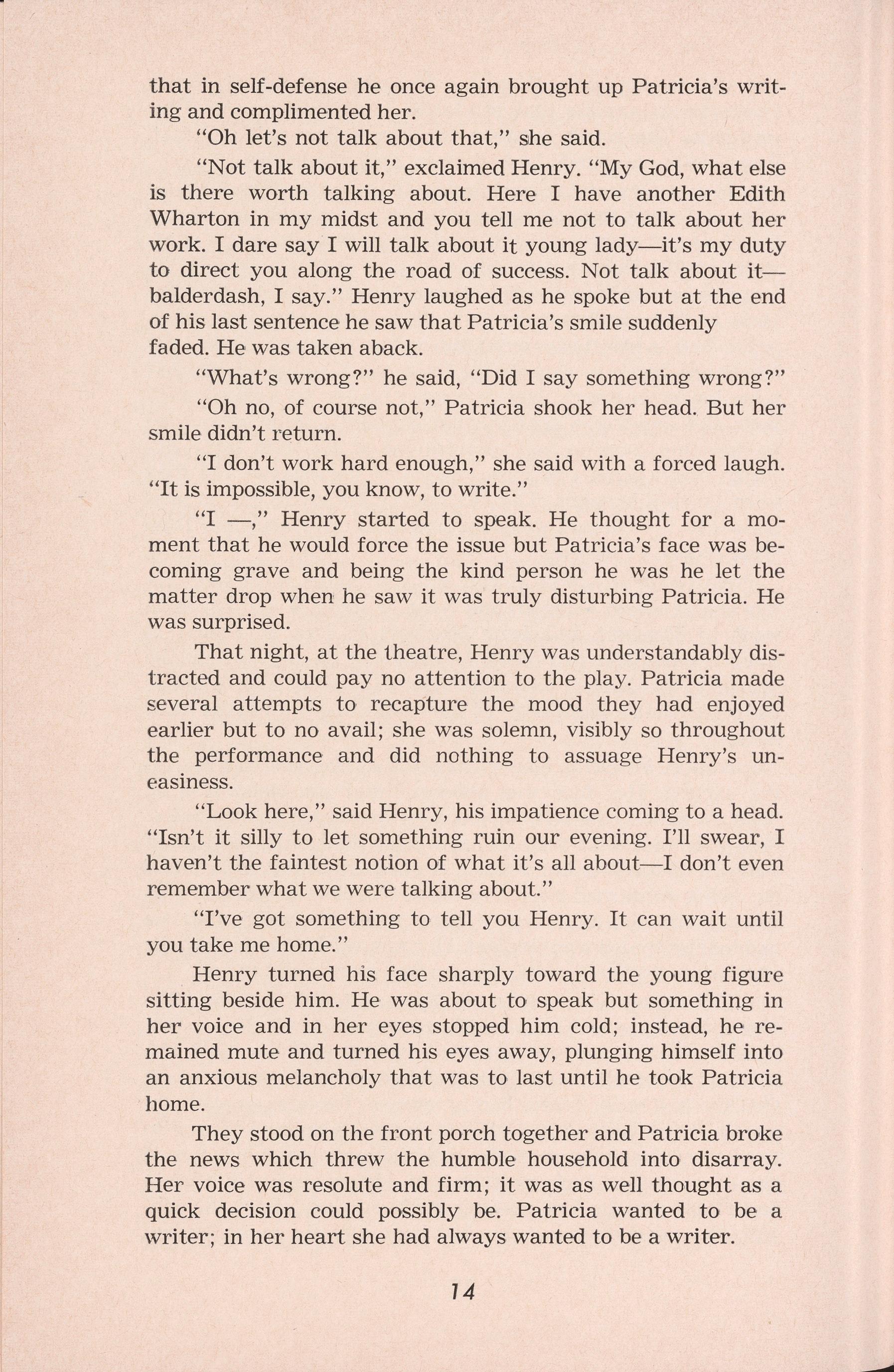
that in self-defense he once again brought up Patricia's writing and complimented her.
"Oh let's not talk about that," she said.
"Not talk about it," exclaimed Henry. "My God, what else is there worth talking about. Here I have another Edith Wharton in my midst and you tell me not to talk about her work. I dare say I will talk about it young lady - it's my duty to direct you along the road of success. Not talk about itbalderdash, I say." Henry laughed as he spoke but at the end of his last sentence he saw that Patricia's smile suddenly faded. He was taken aback.
"What's wrong?" he said, "Did I say something wrong?"
"Oh no, of course not," Patricia shook her head. But her smile didn't return.
"I don't work hard enough," she said with a forced laugh. "It is impossible, you know, to write."
"I -," Henry started to speak. He thought for a moment that he would force the issue but Patricia's face was becoming grave and being the kind person he was he let the matter drop when he saw it was truly disturbing Patricia. He was surprised.
That night, at the theatre, Henry was understandably distracted and could pay no attention to the play. Patricia made several attempts to recapture the mood they had enjoyed earlier but to no avail; she was solemn, visibly so throughout the performance and did nothing to assuage Henry's uneasiness.
"Look here," said Henry, his impatience coming to a head . "Isn't it silly to let something ruin our evening. I'll swear, I haven't the faintest notion of what it's all about-I don't even remember what we were talking about."
"I've got something to tell you Henry It can wait until you take me home."
Henry turned his face sharply toward the young figure sitting beside him. He was about to speak but something in her voice and in her eyes stopped him cold; instead, he remained mute and turned his eyes away, plunging himself into an anxious melancholy that was to last until he took Patricia home.
They stood on the front porch together and Patricia broke the news which threw the humble household into disarray. Her voice was resolute and firm; it was as well thought as a quick decision could possibly be. Patricia wanted to be a writer; in her heart she had always wanted to be a writer.
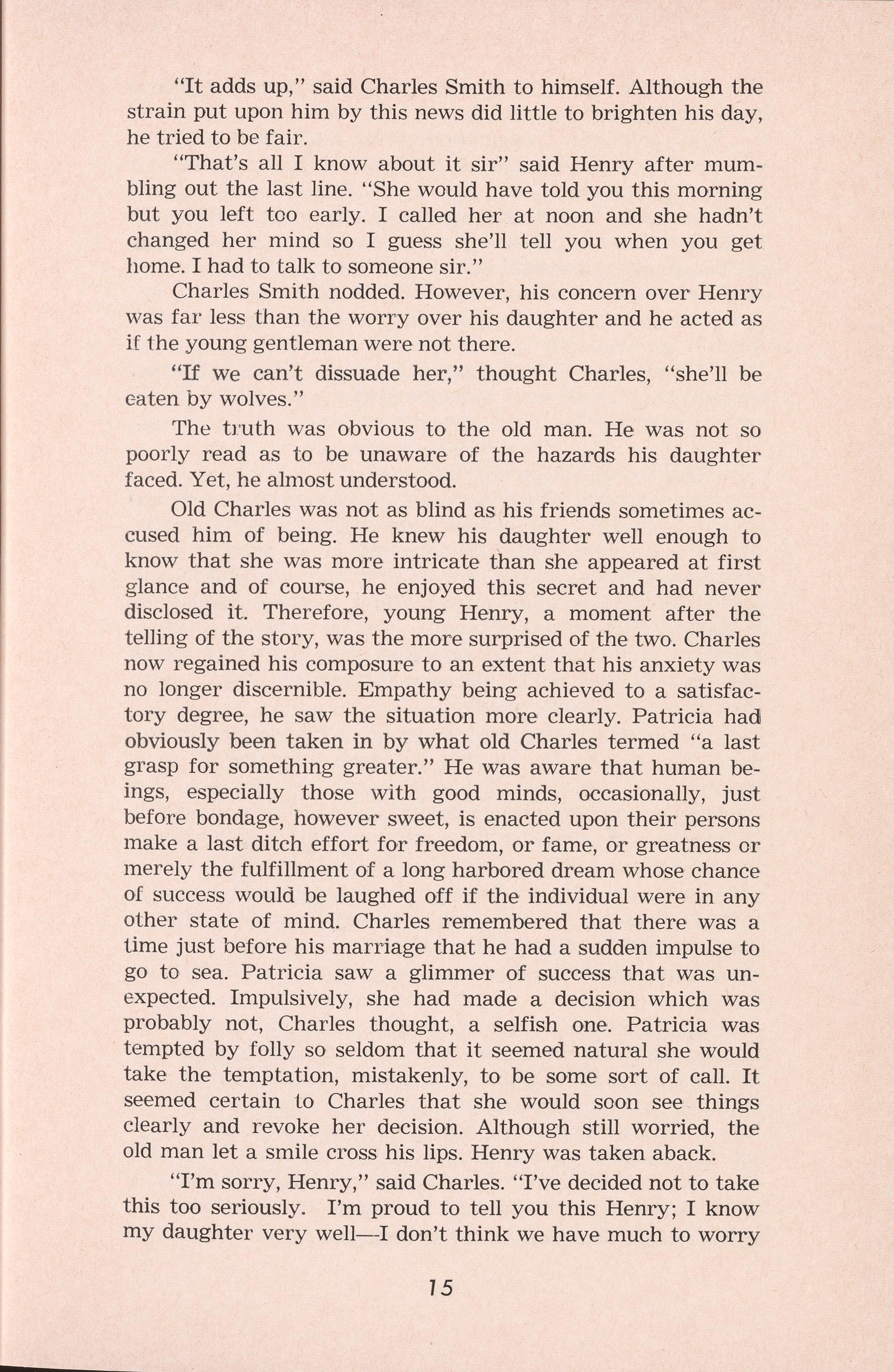
"It adds up," said Charles Smith to himself. Although the strain put upon him by this news did little to brighten his day, he tried to be fair.
"That's all I know about it sir" said Henry after mumbling out the last line. "She would have told you this morning but you left too early. I called her at noon and she hadn't changed her mind so I guess she'll tell you when you get home. I had to talk to someone sir."
Charles Smith nodded. However, his concern over Henry was far less than the worry over his daughter and he acted as if the young gentleman were not there.
"If we can't dissuade her," thought Charles, "she'll be eaten by wolves."
The truth was obvious to the old man. He was not so poorly read as to be unaware of the hazards his daughter faced. Yet, he almost understood.
Old Charles was not as blind as his friends sometimes accused him of being. He knew his daughter well enough to know that she was more intricate than she appeared at first glance and of course, he enjoyed this secret and had never disclosed it. Therefore, young Henry, a moment after the telling of the story, was the more surprised of the two. Charles now regained his composure to an extent that his anxiety was no longer discernible. Empathy being achieved to a satisfactory degree, he saw the situation more clearly. Patricia had obviously been taken in by what old Charles termed "a last grasp for something greater." He was aware that human beings, especially those with good minds, occasionally, just before bondage, however sweet, is enacted upon their persons make a last ditch effort for freedom, or fame, or greatness or merely the fulfillment of a long harbored dream whose chance of success would be laughed off if the individual were in any other state of mind. Charles remembered that there was a time just before his marriage that he had a sudden impulse to go to sea. Patricia saw a glimmer of success that was unexpected. Impulsively, she had made a decision which was probably not, Charles thought, a selfish one. Patricia was tempted by folly so seldom that it seemed natural she would take the temptation, mistakenly, to be some sort of call. It seemed certain to Charles that she would soon see things clearly and revoke her decision. Although still worried, the old man let a smile cross his lips. Henry was taken aback.
"I'm sorry, Henry," said Charles. "I've decided not to take this too seriously. I'm proud to tell you this Henry; I know my daughter very well-I don't think we have much to worry
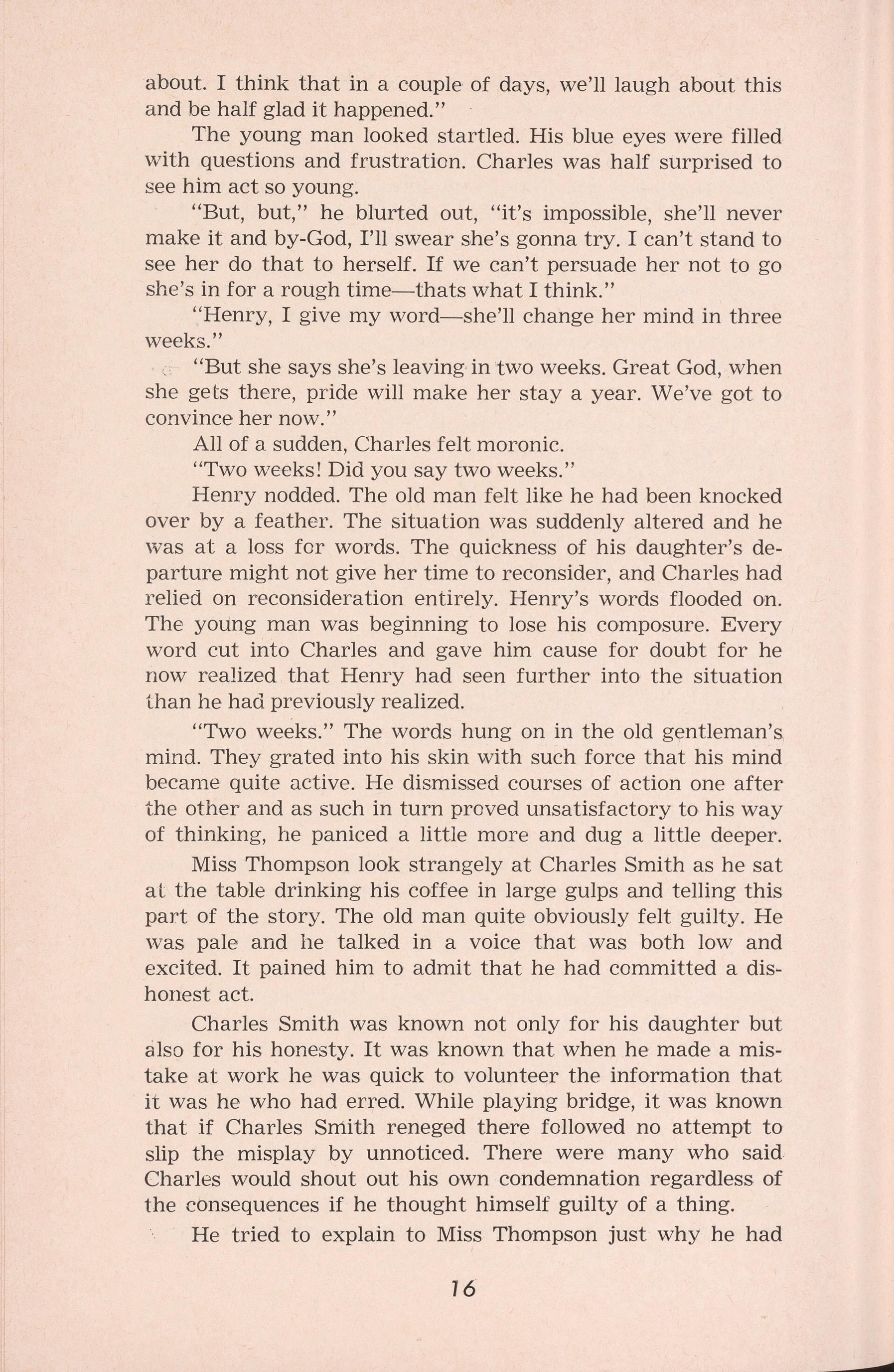
about. I think that in a couple of days, we'll laugh about this and be half glad it happened."
The young man looked startled. His blue eyes were filled with questions and frustration. Charles was half surprised to see him act so young.
"But, but," he blurted out, "it's impossible, she'll never make it and by-God, I'll swear she's gonna try. I can't stand to see her do that to herself. If we can't persuade her not to go she's in for a rough time-thats what I think."
"Henry, I give my word-she'll change her mind in three weeks."
"But she says she's leaving , in two weeks. Great God, when she gets there, pride will make her stay a year. We've got to convince her now."
All of a sudden, Charles felt moronic.
"Two weeks! Did you say two weeks."
Henry nodded. The old man felt like he had been knocked over by a feather. The situation was suddenly altered and he was at a loss for words. The quickness of his daughter's departure might not give her time to reconsider, and Charles had relied on reconsideration entirely. Henry's words flooded on. The young man was beginning to lose his composure. Every word cut into Charles and gave him cause for doubt for he now realized that Henry had seen further into the situation than he had previously realized.
"Two weeks." The words hung on in the old gentleman's mind. They grated into his skin with such force that his mind became quite active. He dismissed courses of action one after the other and as such in turn proved unsatisfactory to his way of thinking, he paniced a little more and dug a little deeper.
Miss Thompson look strangely at Charles Smith as he sat al the table drinking his coffee in large gulps and telling this part of the story. The old man quite obviously felt guilty. He was pale and he talked in a voice that was both low and excited. It pained him to admit that he had committed a dishonest act.
Charles Smith was known not only for his daughter but also for his honesty. It was known that when he made a mistake at work he was quick to volunteer the information that it was he who had erred. While playing bridge, it was known that if Charles Smith reneged there followed no attempt to slip the misplay by unnoticed. There were many who said Charles would shout out his own condemnation regardless of the consequences if he thought himself guilty of a thing.
He tried to explain to Miss Thompson just why he had
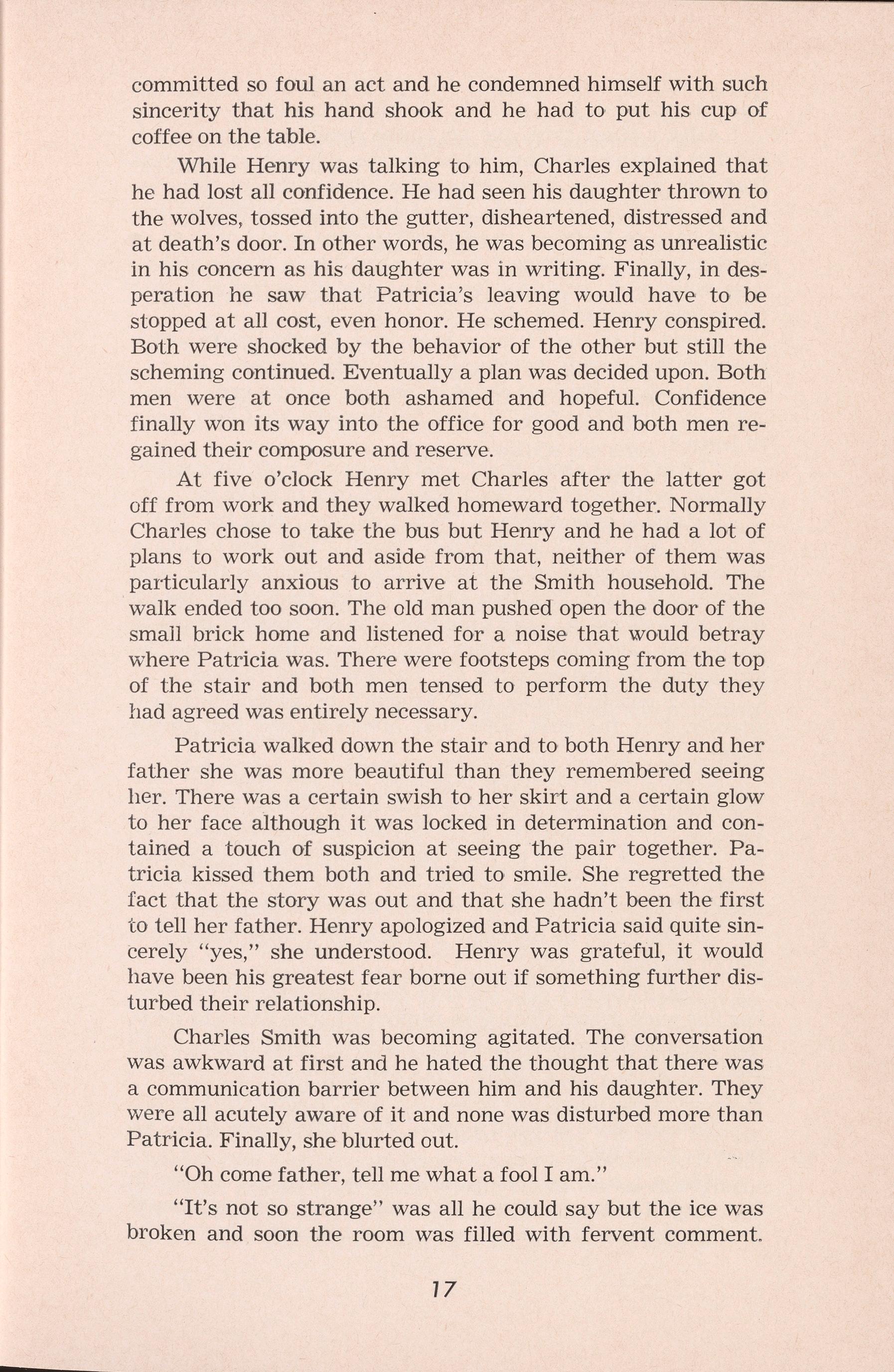
committed so foul an act and he condemned himself with such sincerity that his hand shook and he had to put his cup of coffee on the table.
While Henry was talking to him, Charles explained that he had lost all confidence. He had seen his daughter thrown to the wolves, tossed into the gutter, disheartened, distressed and at death's door. In other words, he was becoming as unrealistic in his concern as his daughter was in writing. Finally, in desperation he saw that Patricia's leaving would have to be stopped at all cost, even honor. He schemed. Henry conspired. Both were shocked by the behavior of the other but still the scheming continued. Eventually a plan was decided upon. Both men were at once both ashamed and hopeful. Confidence finally won its way into the office for good and both men regained their composure and reserve.
At five o'clock Henry met Charles after the latter got off from work and they walked homeward together. Normally Charles chose to take the bus but Henry and he had a lot of plans to work out and aside from that, neither of them was particularly anxious to arrive at the Smith household. The walk ended too soon. The old man pushed open the door of the small brick home and listened for a noise that would betray where Patricia was. There were footsteps coming from the top of the stair and both men tensed to perform the duty they had agreed was entirely necessary.
Patricia walked down the stair and to both Henry and her father she was more beautiful than they remembered seeing her. There was a certain swish to her skirt and a certain glow to her face although it was locked in determination and contained a touch of suspicion at seeing the pair together. Patricia kissed them both and tried to smile. She regretted the fact that the story was out and that she hadn't been the first to tell her father. Henry apologized and Patricia said quite sincerely "yes," she understood. Henry was grateful, it would have been his greatest fear borne out if something further disturbed their relationship.
Charles Smith was becoming agitated. The conversation was awkward at first and he hated the thought that there was a communication barrier between him and his daughter. They were all acutely aware of it and none was disturbed more than Patricia. Finally, she blurted out.
"Oh come father, tell me what a fool I am."
"It's not so strange" was all he could say but the ice was broken and soon the room was filled with fervent comment
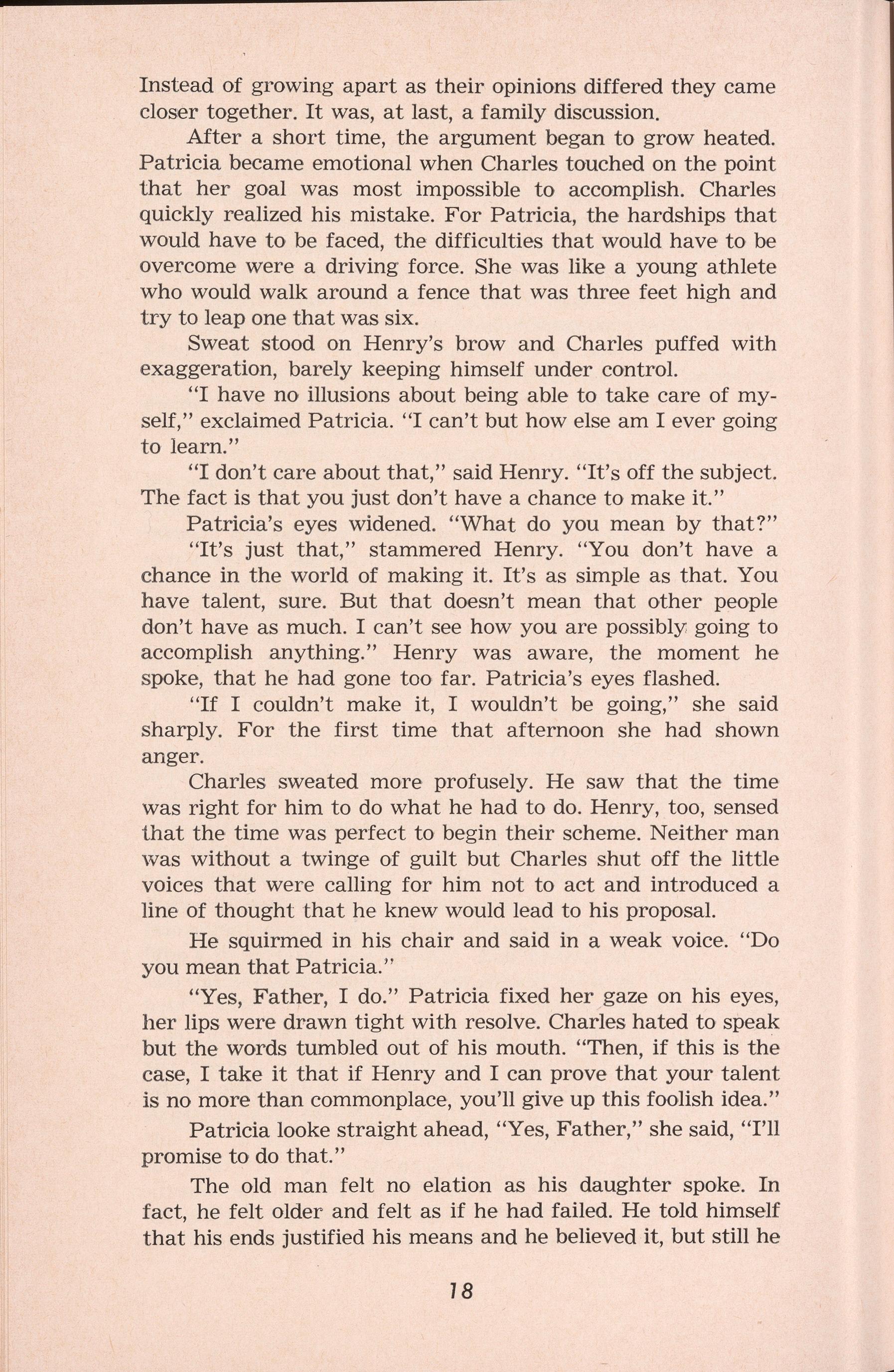
Instead of growing apart as their opinions differed they came closer together. It was, at last, a family discussion.
After a short time, the argument began to grow heated. Patricia became emotional when Charles touched on the point that her goal was most impossible to accomplish. Charles quickly realized his mistake. For Patricia, the hardships that would have to be faced, the difficulties that would have to be overcome were a driving force. She was like a young athlete who would walk around a fence that was three feet high and try to leap one that was six.
Sweat stood on Henry's brow and Charles puffed with exaggeration, barely keeping himself under control.
"I have no illusions about being able to take care of myself," exclaimed Patricia. "I can't but how else am I ever going to learn."
"I don't care about that," said Henry. "It's off the subject. The fact is that you just don't have a chance to make it."
Patricia's eyes widened. "What do you mean by that?"
"It's just that," stammered Henry. "You don't have a chance in the world of making it. It's as simple as that. You have talent, sure. But that doesn't mean that other people don't have as much. I can't see how you are possibly, going to accomplish anything." Henry was aware, the moment he spoke, that he had gone too far. Patricia's eyes flashed.
"If I couldn't make it, I wouldn't be going," she said sharply. For the first time that afternoon she had shown anger.
Charles sweated more profusely. He saw that the time was right for him to do what he had to do. Henry, too, sensed that the time was perfect to begin their scheme. Neither man was without a twinge of guilt but Charles shut off the little voices that were calling for him not to act and introduced a line of thought that he knew would lead to his proposal.
He squirmed in his chair and said in a weak voice. "Do you mean that Patricia."
"Yes, Father, I do." Patricia fixed her gaze on his eyes, her lips were drawn tight with resolve. Charles hated to speak but the words tumbled out of his mouth. "Then, if this is the case, I take it that if Henry and I can prove that your talent is no more than commonplace, you'll give up this foolish idea."
Patricia looke straight ahead, "Yes, Father," she said, "I'll promise to do that."
The old man felt no elation as his daughter spoke. In fact, he felt older and felt as if he had failed. He told himself that his ends justified his means and he believed it, but still he
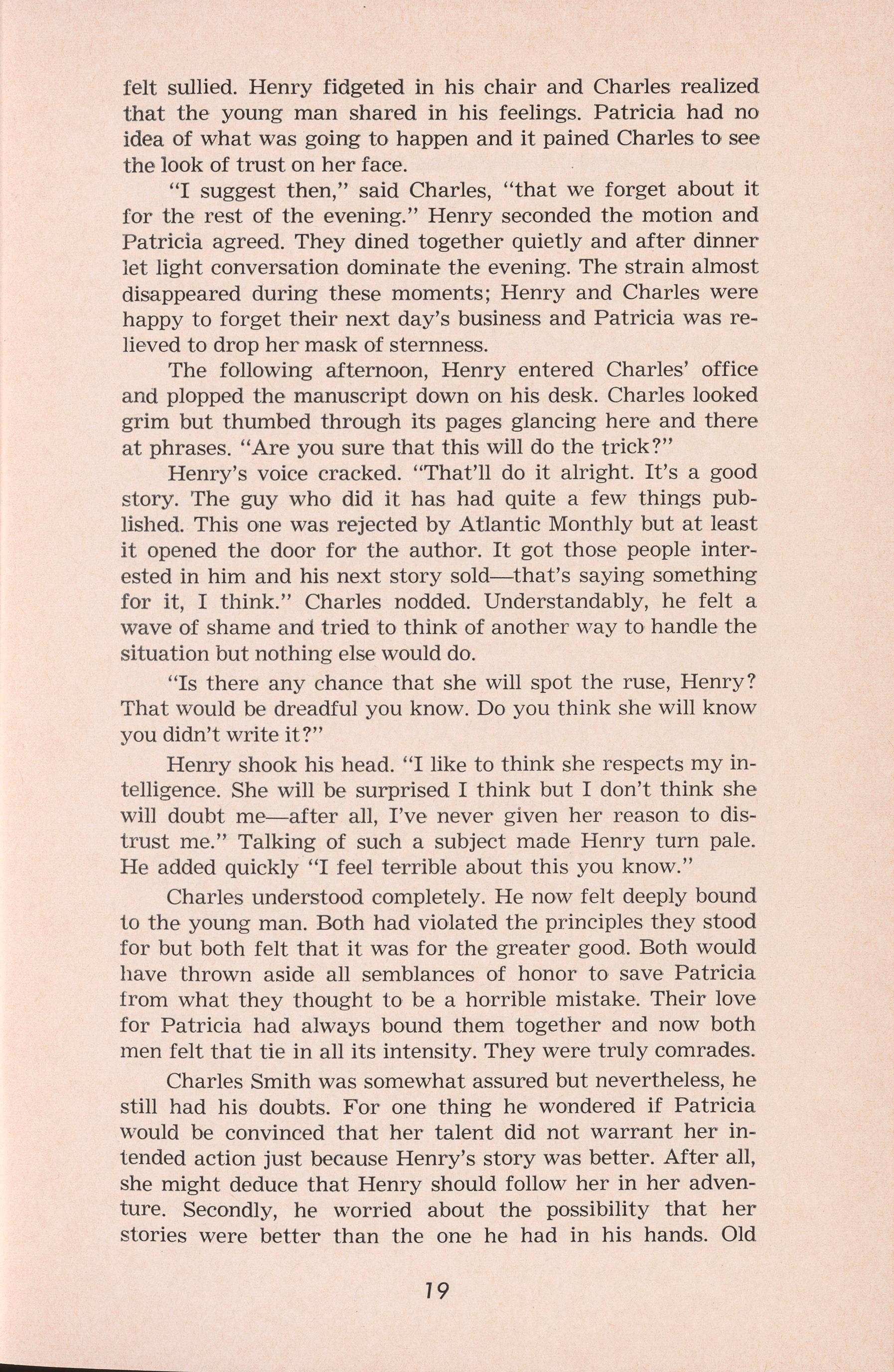
felt sullied. Henry fidgeted in his chair and Charles realized that the young man shared in his feelings. Patricia had no idea of what was going to happen and it pained Charles to see the look of trust on her face.
"I suggest then," said Charles, "that we forget about it for the rest of the evening." Henry seconded the motion and Patricia agreed. They dined together quietly and after dinner let light conversation dominate the evening. The strain almost disappeared during these moments; Henry and Charles were happy to forget their next day's business and Patricia was relieved to drop her mask of sternness.
The following afternoon, Henry entered Charles' office and plopped the manuscript down on his desk. Charles looked grim but thumbed through its pages glancing here and there at phrases. "Are you sure that this will do the trick?"
Henry's voice cracked. "That'll do it alright. It's a good story. The guy who did it has had quite a few things published. This one was rejected by Atlantic Monthly but at least it opened the door for the author. It got those people interested in him and his next story sold-that's saying something f or it, I think." Charles nodded. Understandably, he felt a w ave of shame and tried to think of another way to handle the situation but nothing else would do.
"Is there any chance that she will spot the ruse, Henry? That would be dreadful you know. Do you think she will know you didn't write it?"
Henry shook his head. "I like to think she respects my int elligence. She will be surprised I think but I don't think she will doubt me-after all, I've never given her reason to dist r ust me." Talking of such a subject made Henry turn pale . He added quickly "I feel terrible about this you know."
Charles understood completely. He now felt deeply bound to the young man. Both had violated the principles they stood for but both felt that it was for the greater good . Both would have thrown aside all semblances of honor to save Patricia from what they thought to be a horrible mistake. Their love for Patricia had always bound them together and now both men felt that tie in all its intensity. They were truly comrades.
Charles Smith was somewhat assured but nevertheless, he still had his doubts. For one thing he wondered if Patricia would be convinced that her talent did not warrant her intended action just because Henry's story was better. After all, she might deduce that Henry should follow her in her adventure. Secondly, he worried about the possibility that her stories were better than the one he had in his hands. Old
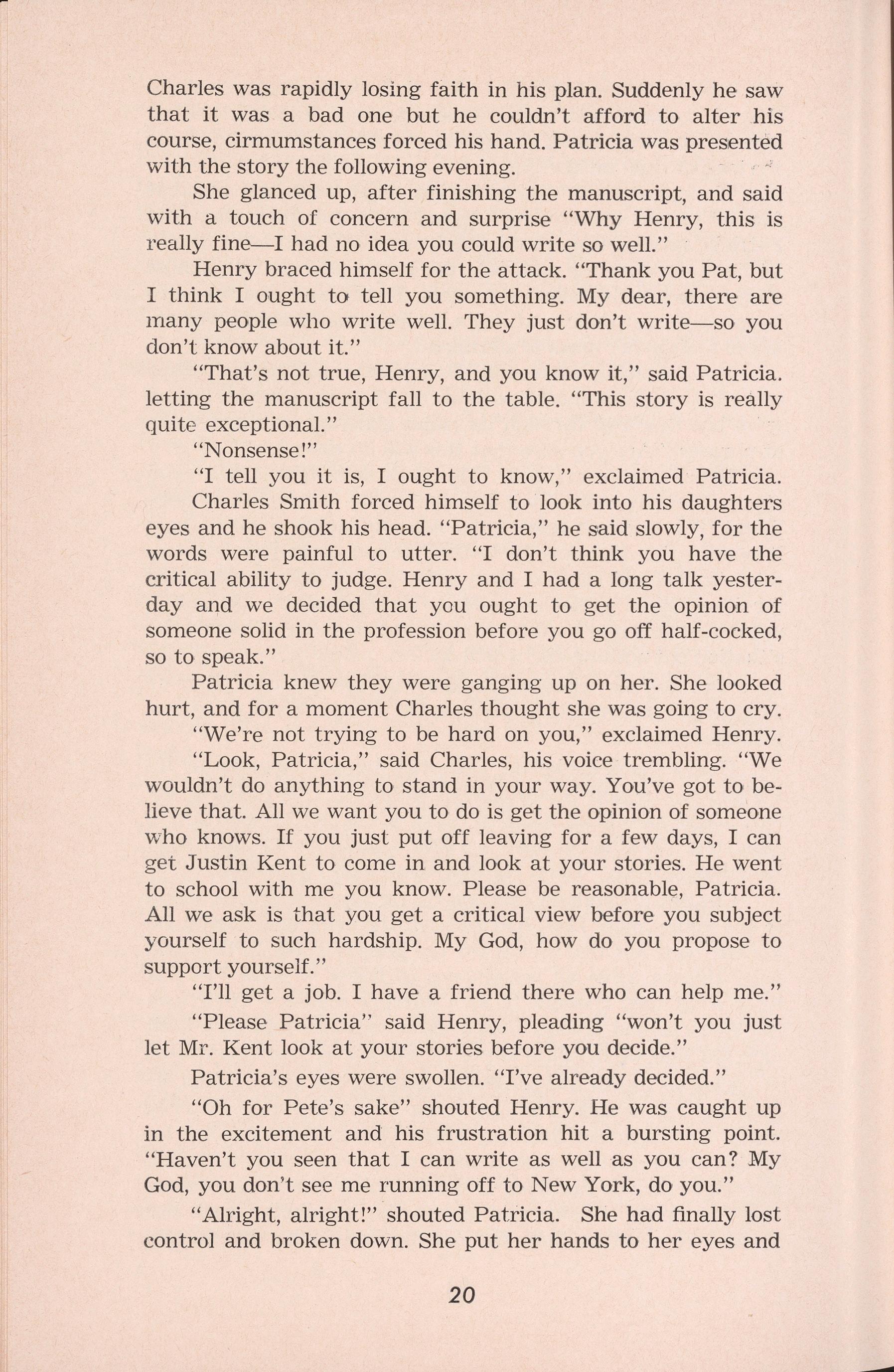
Charles was rapidly losing faith in his plan. Suddenly he saw that it was a bad one but he couldn't afford to alter his course, cirmumstances forced his hand. Patricia was presented with the story the following evening.
She glanced up, after finishing the manuscript, and said with a touch of concern and surprise "Why Henry, this is really fine--I had no idea you could write so well."
Henry braced himself for the attack. "Thank you Pat, but I think I ought to tell you something. My dear, there are many people who write well. They just don't write-so you don't know about it."
"That's not true, Henry, and you know it," said Patricia. letting the manuscript fall to the table. "This story is really quite exceptional."
"Nonsense!"
"I tell you it is, I ought to know," exclaimed Patricia. Charles Smith forced himself to look into his daughters eyes and he shook his head. "Patricia," he said slowly, for the words were painful to utter. "I don't think you have the critical ability to judge. Henry and I had a long talk yesterday and we decided that you ought to get the opinion of someone solid in the profession before you go off half-cocked, so to speak."
Patricia knew they were ganging up on her. She looked hurt, and for a moment Charles thought she was going to cry. "We're not trying to be hard on you," exclaimed Henry. "Look, Patricia," said Charles, his voice trembling. "We wouldn't do anything to stand in your way. You've got to believe that. All we want you to do is get the opinion of someone who knows. If you just put off leaving for a few days, I can get Justin Kent to come in and look at your stories. He went to school with me you know. Please be reasonable, Patricia. All we ask is that you get a critical view before you subject yourself to such hardship. My God, how do you propose to support yourself."
"I'll get a job. I have a friend there who can help me."
"Please Patricia'' said Henry, pleading "won't you just let Mr. Kent look at your stories before you decide."
Patricia's eyes were swollen. "I've already decided."
"Oh for Pete's sake" shouted Henry. He was caught up in the excitement and his frustration hit a bursting point. "Haven't you seen that I can write as well as you can? My God, you don't see me running off to New York, do you."
"Alright, alright!" shouted Patricia. She had finally lost control and broken down. She put her hands to her eyes and
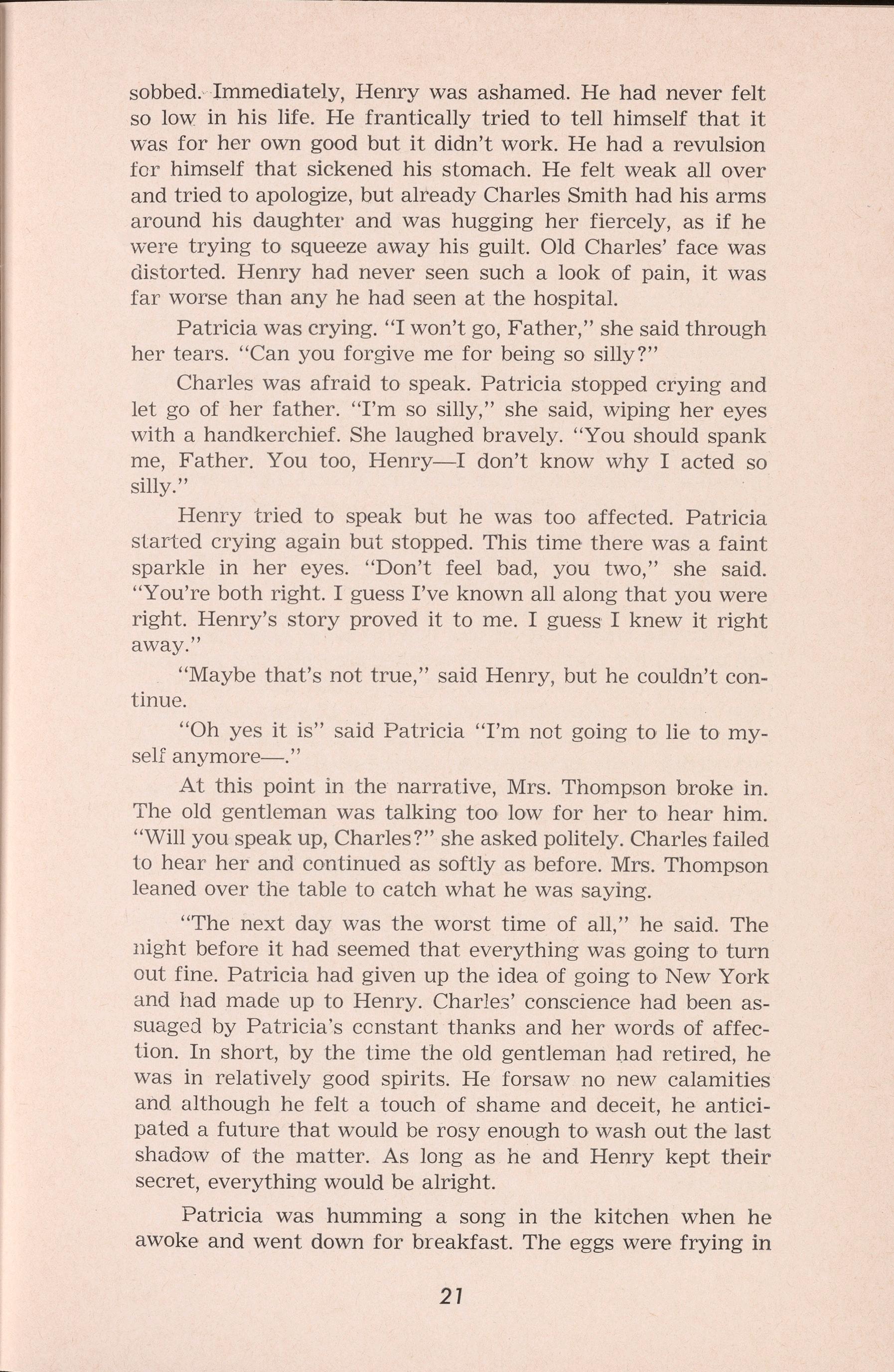
sobbed. , Immediately, Henry was ashamed. He had never felt so low in his life. He frantically tried to tell himself that it was for her own good but it didn't work. He had a revulsion for himself that sickened his stomach. He felt weak all over and tried to apologize, but already Charles Smith had his arms around his daughter and was hugging her fiercely, as if he were trying to squeeze away his guilt. Old Charles' face was distorted. Henry had never seen such a look of pain, it was far worse than any he had seen at the hospital.
Patricia was crying. "I won't go, Father," she said through her tears. "Can you forgive me for being so silly?"
Charles was afraid to speak. Patricia stopped crying and let go of her father. "I'm so silly," she said, wiping her eyes with a handkerchief. She laughed bravely. "You should spank me, Father. You too, Henry-I don't know why I acted so silly."
Henry tried to speak but he was too affected. Patricia started crying again but stopped. This time there was a faint sparkle in her eyes. "Don't feel bad, you two," she said. "You're both right. I guess I've known all along that you were right. Henry's story proved it to me. I guess I knew it right away."
"Maybe that's not true," said Henry, but he couldn't continue.
"Oh yes it is" said Patricia "I'm not going to lie to myself anymore-."
At this point in the narrative, Mrs. Thompson broke in. The old gentleman was talking too low for her to hear him. "Will you speak up, Charles?" she asked politely. Charles failed to hear her and continued as softly as before. Mrs. Thompson leaned over the table to catch what he was saying.
"The next day was the worst time of all," he said. The night before it had seemed that everything was going to turn out fine. Patricia had given up the idea of going to New York and had made up to Henry. Charle3' conscience had been assuaged by Patricia's constant thanks and her words of affection. In short, by the time the old gentleman bad retired, he was in relatively good spirits. He forsaw no new calamities and although he felt a touch of shame and deceit, he anticipated a future that would be rosy enough to wash out the last shadow of the matter. As long as he and Henry kept their secret, everything would be alright.
Patricia was humming a song in the kitchen when he awoke and went down for breakfast. The eggs were frying in
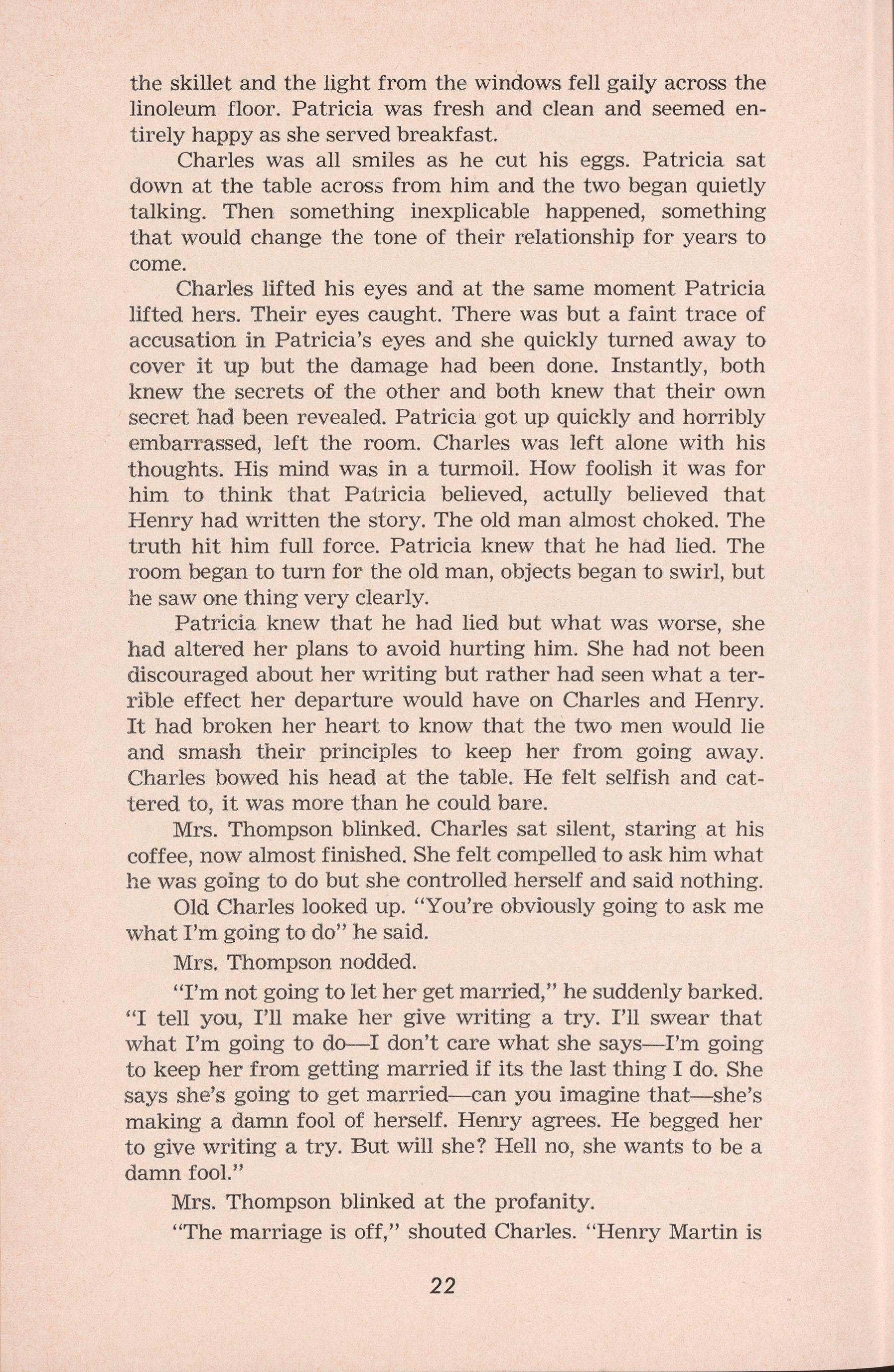
the skillet and the light from the windows fell gaily across the linoleum floor. Patricia was fresh and clean and seemed entirely happy as she served breakfast.
Charles was all smiles as he cut his eggs. Patricia sat down at the table across from him and the two began quietly talking. Then something inexplicable happened, something that would change the tone of their relationship for years to come.
Charles lifted his eyes and at the same moment Patricia lifted hers. Their eyes caught. There was but a faint trace of accusation in Patricia's eyes and she quickly turned away to cover it up but the damage had been done. Instantly, both knew the secrets of the other and both knew that their own secret had been revealed. Patricia got up quickly and horribly e mbarrassed, left the room. Charles was left alone with his thoughts. His mind was in a turmoil. How foolish it was for him to think that Patricia believed, actully believed that Henry had written the story. The old man almost choked. The truth hit him full force. Patricia knew that he had lied. The room began to turn for the old man, objects began to swirl, but he saw one thing very clearly.
Patricia knew that he had lied but what was worse, she had altered her plans to avoid hurting him. She had not been discouraged about her writing but rather had seen what a terrible effect her departure would have on Charles and Henry. It had broken her heart to know that the two men would lie and smash their principles to keep her from going away. Charles bowed his head at the table. He felt selfish and cattered to, it was more than he could bare.
Mrs. Thompson blinked. Charles sat silent, staring at his coffee, now almost finished. She felt compelled to ask him what he was going to do but she controlled herself and said nothing. Old Charles looked up. "You're obviously going to ask me what I'm going to do" he said.
Mrs. Thompson nodded.
"I'm not going to let her get married," he suddenly barked. "I tell you, I'll make her give writing a try. I'll swear that what I'm going to do-I don't care what she says-I'm going to keep her from getting married if its the last thing I do. She says she's going to get married-can you imagine that-she's making a damn fool of herself. Henry agrees. He begged her to give writing a try. But will she? Hell no, she wants to be a damn fool."
Mrs. Thompson blinked at the profanity.
"The marriage is off," shouted Charles. "Henry Martin is

a damn lot clearer sighted than my daughter. I don't disapprove of Henry Martin, you know that-but she's not going to get married, I'll tell you that."
Mrs. Thompson was surprised. From the first she had thought that Charles Smith was thinking along different lines.
"If she gets married," said Charles, "can you imagine what her relationship with Henry and me will be like in five years, in ten years? The way we stopped her. I hesitate to think."
Mrs. Thompson too, hesitated to think. She had seen a great deal of life and could well see that calamity, but she also saw something further, something Charles refused to realize. She saw that the father and <laugher relationship that could have been so fruitful, had now been destroyed. The only question was, was it for better or worse. Mrs. Thompson didn't say.
Peter talked to Mary, Mary talked to Paul, Paul took a piece of chalk, And wrote it on the wall.
"We're great because, We 're wholesome and untouched, We ' re right, but there are wrongs, But we lambast them in our folk songs. "
Mary sighed, ''I'm sexy "
Paul said "I'm so cute"
Peter strummed his guitar, in his Brooks Brothers suit.
They sing with passion, They sing with feeling, Their mouths drip with honey, And in the face of it all, in rolls money.
It's tough being a star, All the pressure and fame, All the travel and the time, But I really don't think they mind.
You see their strength is with them, They will be forever strong. Their shirts will be Gant, with pressed collars as long as Joe Average spends his dollars.
-Emory Maiden
Boy, I'm doing you a favor When I was your age I wo rked, worked hard Fifty cents a day was my wage
I was bucking steel, twelve long hours a day , I got strong hands, and fifty lousy cents for pay
Times has changed, so has this damn nation, You 've got it easy, loafing, calling it getting an educa tio n.
I've worked hard, .,;,;thmy mind and with tools , You can 't match my wisdom , even with your schools .
You can go for a hundred years , You expect me to keep you fe d, /'ff support you, worthless pup , but you won't match what's in my ha nd .
You look soft with your looks , I come home sweaty and greas y. You sit there behind that book , Boy, have you got it easy
I went to school sure, made good grades, my study hou rs we re f e w , I graduated top of my class , out of a class of thirty-two .
I was good at sports, had coffege offers some, and a fe w m o re Instead, I stayed home, to keep the wolf from the doo r.
They were hard times, I worked snow, sun, or shade . You fumble with physics, Boy, have you got it made
/' ff let you live in my house , and profit from my labor , but don 't ever forget, who done you this here favo r.
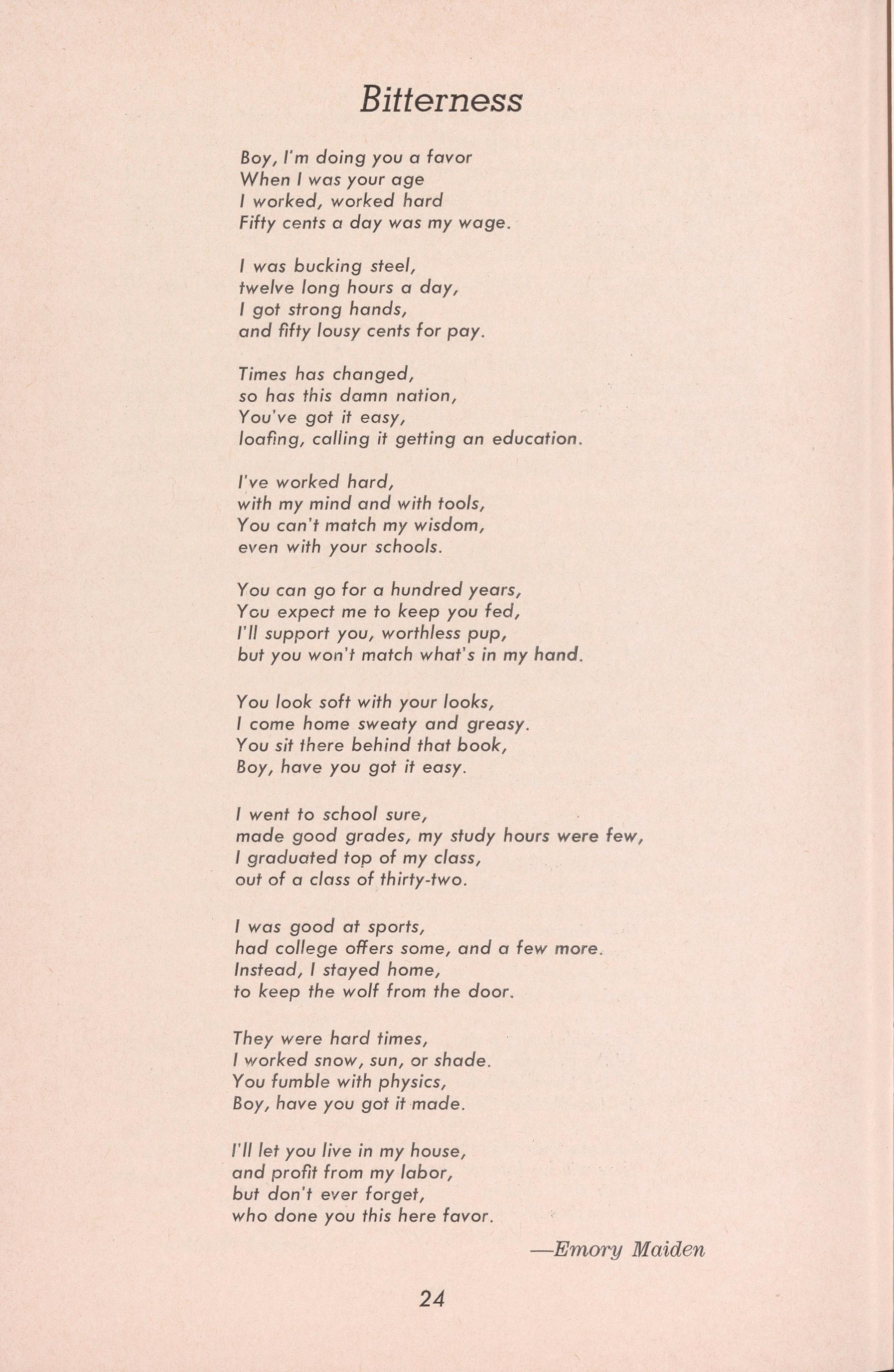
-E mory M ai den

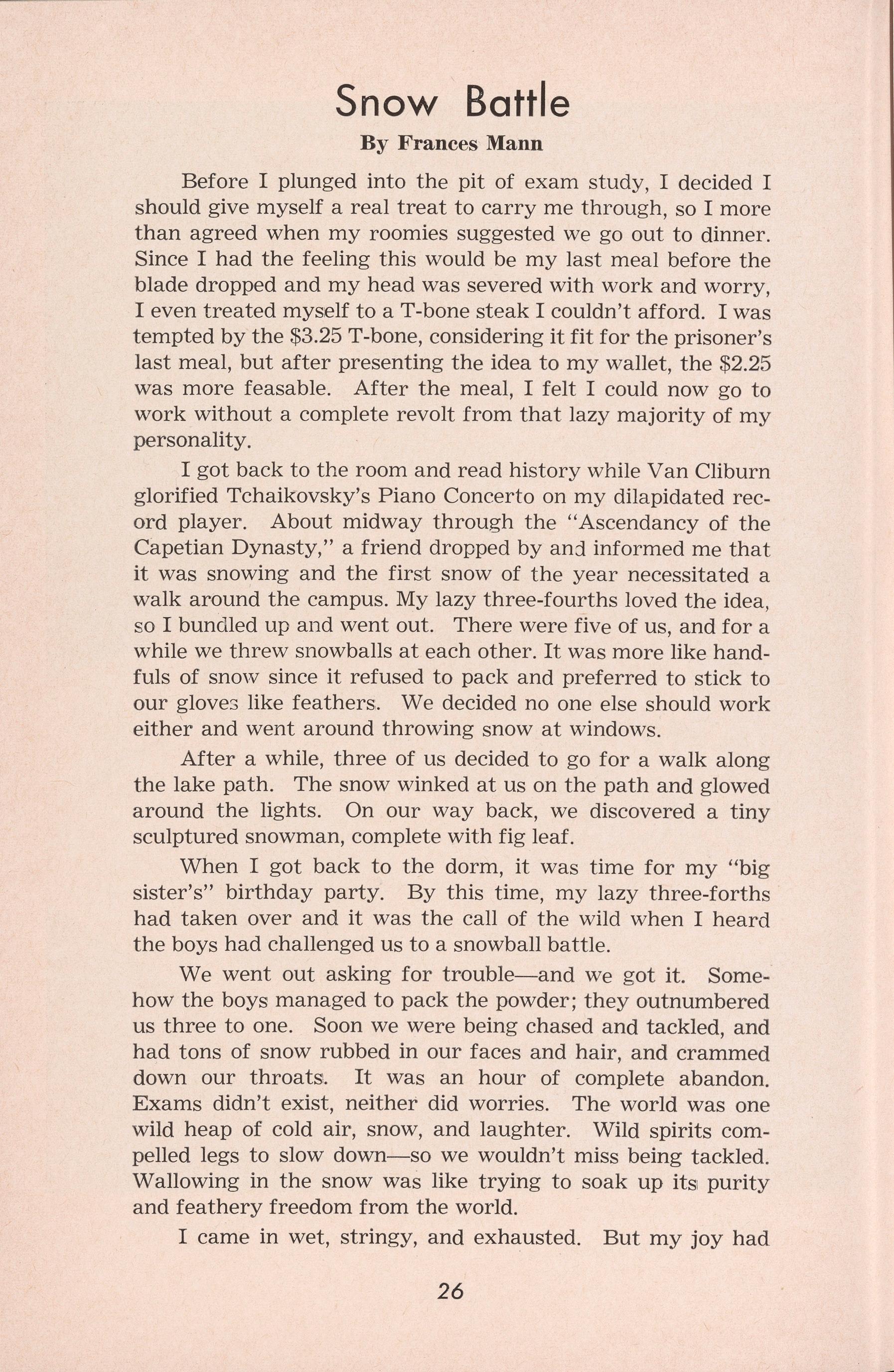
By Frances Mann
Before I plunged into the pit of exam study, I decided I should give myself a real treat to carry me through, so I more than agreed when my roomies suggested we go out to dinner. Since I had the feeling this would be my last meal before the blade dropped and my head was severed with work and worry, I even treated myself to a T-bone steak I couldn't afford. I was tempted by the $3.25 T-bone, considering it fit for the prisoner's last meal, but after presenting the idea to my wallet , the $2.25 was more feasable. After the meal, I felt I could now go to work without a complete revolt from that lazy majority of my personality.
I got back to the room and read history while Van Cliburn glorified Tchaikovsky's Piano Concerto on my dilapidated record player. About midway through the "Ascendancy of the Capetian Dynasty," a friend dropped by and informed me that it was snowing and the first snow of the year necessitated a walk around the campus. My lazy three-fourths loved the idea, so I bundled up and went out. There were five of us, and for a while we threw snowballs at each other. It was more like handfuls of snow since it refused to pack and preferred to stick to our glove3 like feathers. We decided no one else should work either and went around throwing snow at windows.
After a while, three of us decided to go for a walk along the lake path. The snow winked at us on the path and glowed around the lights . On our way back, we discovered a tiny sculptured snowman, complete with fig leaf.
When I got back to the dorm, it was time for my "big sister's" birthday party. By this time, my lazy three-forths had taken over and it was the call of the wild when I heard the boys had challenged us to a snowball battle.
We went out asking for trouble-and we got it. Somehow the boys managed to pack the powder; they outnumbered us three to one. Soon we were being chased and tackled, and had tons of snow rubbed in our faces and hair, and crammed down our throatS! It was an hour of complete abandon . Exams didn't exist, neither did worries. The world was one wild heap of cold air, snow, and laughter. Wild spirits compelled legs to slow down-so we wouldn't miss being tackled . Wallowing in the snow was like trying to soak up itsi purity and feathery freedom from the world.
I came in wet, stringy, and exhausted. But my joy had
had a good workout and I was left with the happy glow you get when you break out of that shell of organization and sensibility into freedom of spirit. I looked out the window and saw two boys walking down the road in the blue light. One was playing a harmonica; the tune was neither sad nor gay . It lay somewhere between resignation and hope.
Merciful church door.
I hear your creaks from where I am, And though now unable to swing you alone I remember well your knobless face . Many were the times I pushed you open
While my heart was closing And I knew better
But I would never chide you . You were to be entered, And I entered you.
Merciful glass sprinkled so with gems You still sparkle for me I see, and I return your wink but not your touch. So fragile So delicate you were, but Your stained lines were enough to frighten me
Far away
From that day when you took the light Of the all-powerful sun into your bosom
And bent it to your wish was I afraid But my fear of you never left your range , For you could twist sunlight in your precious hands . What chance had I.
Glorious altar yearning night.
You were the light of all seasons
When you wore a purple robe and Held a candle in your Psalm
But sturdy as you were Age took what it wanted of you, And your candle diminished . Drippings hid your message for all time . And in your melting heat
You knew of the moon as it waxed and waned . You knew of the flood when it washed away your purple robe
You knew, but you were underwater. You were never understood Robbed of your robe
You were left naked and alone . Soon winds began to stir, And reigns fell at your base.
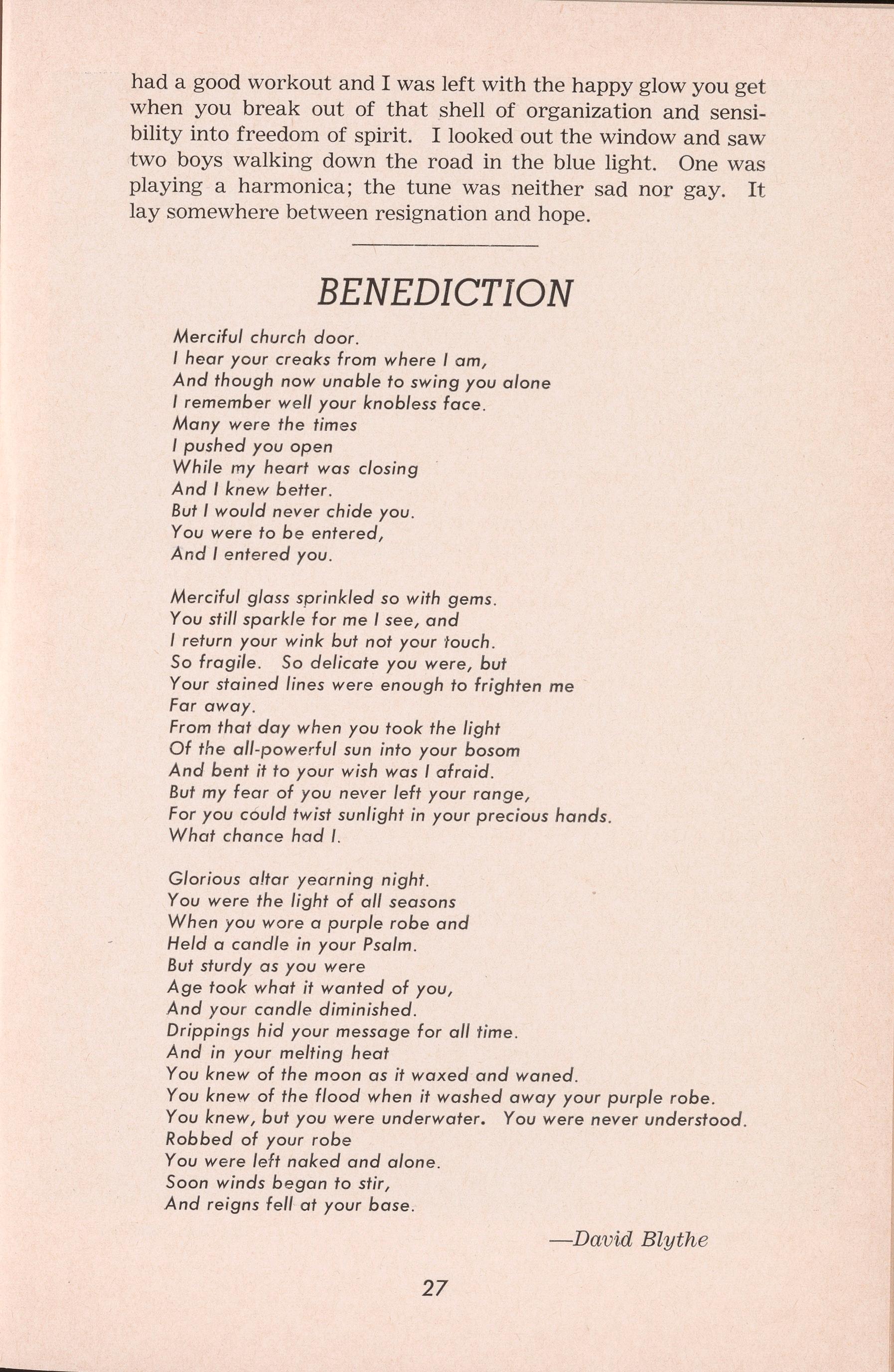
-Da v id Blyth e
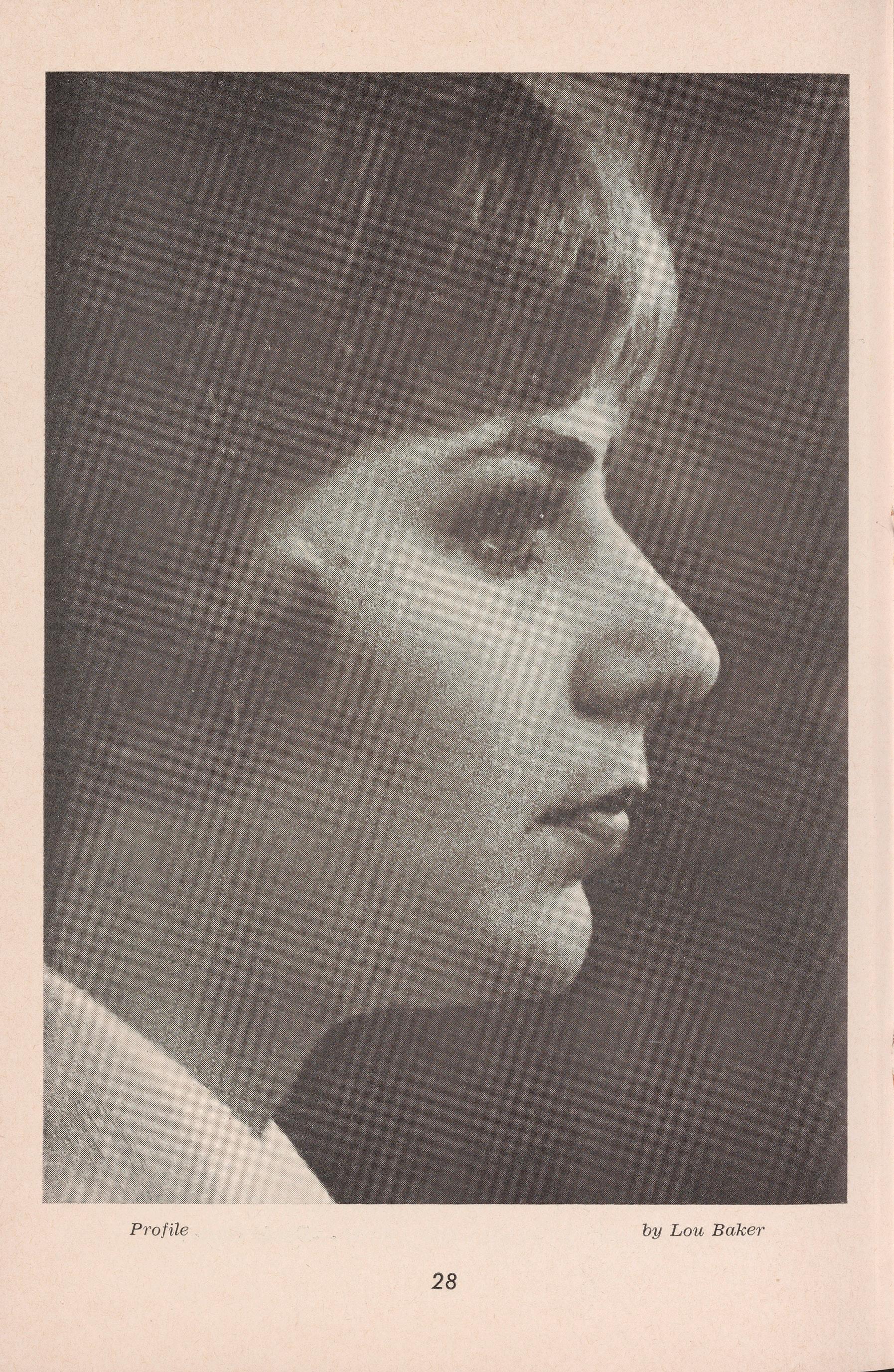
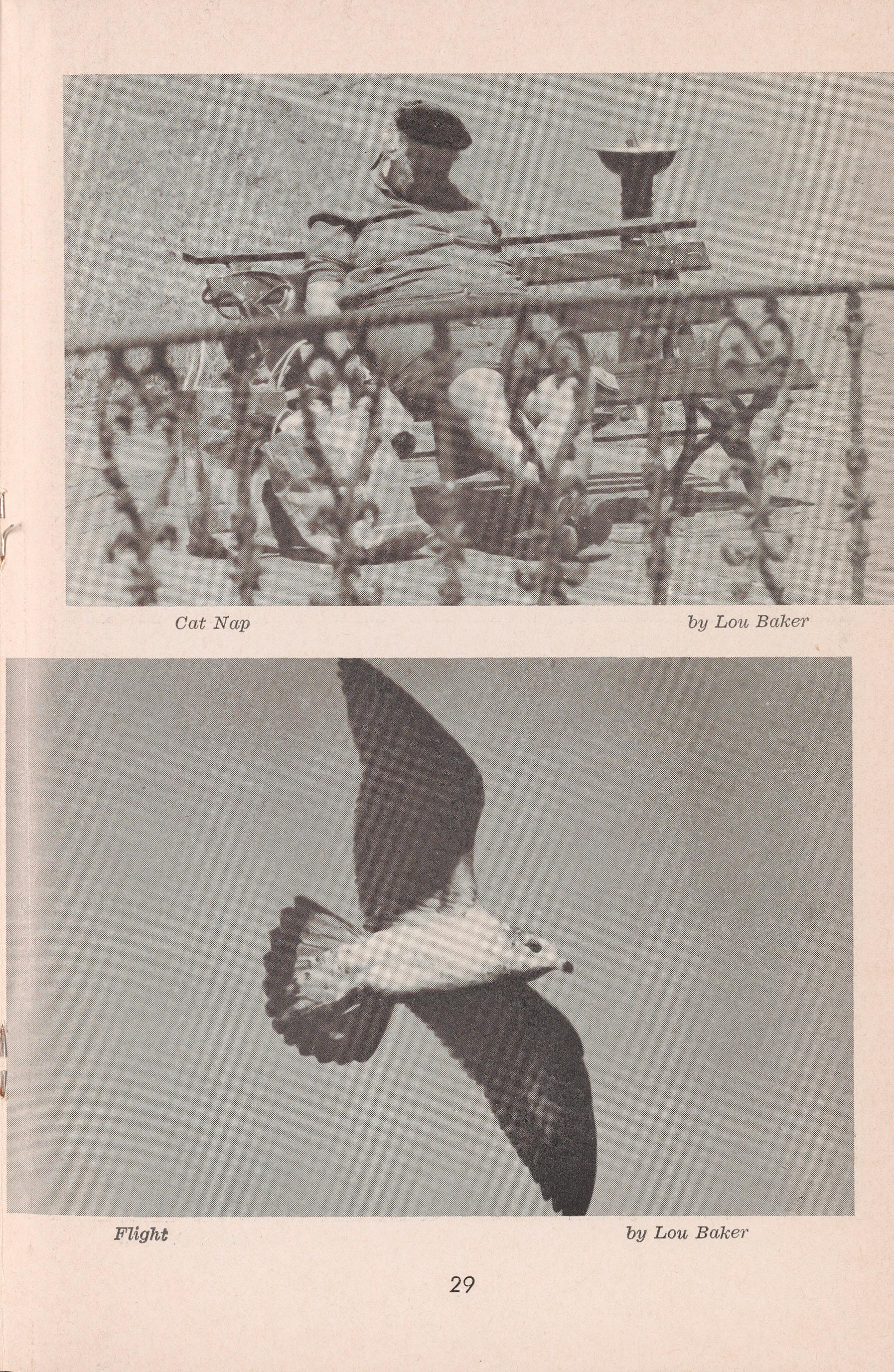
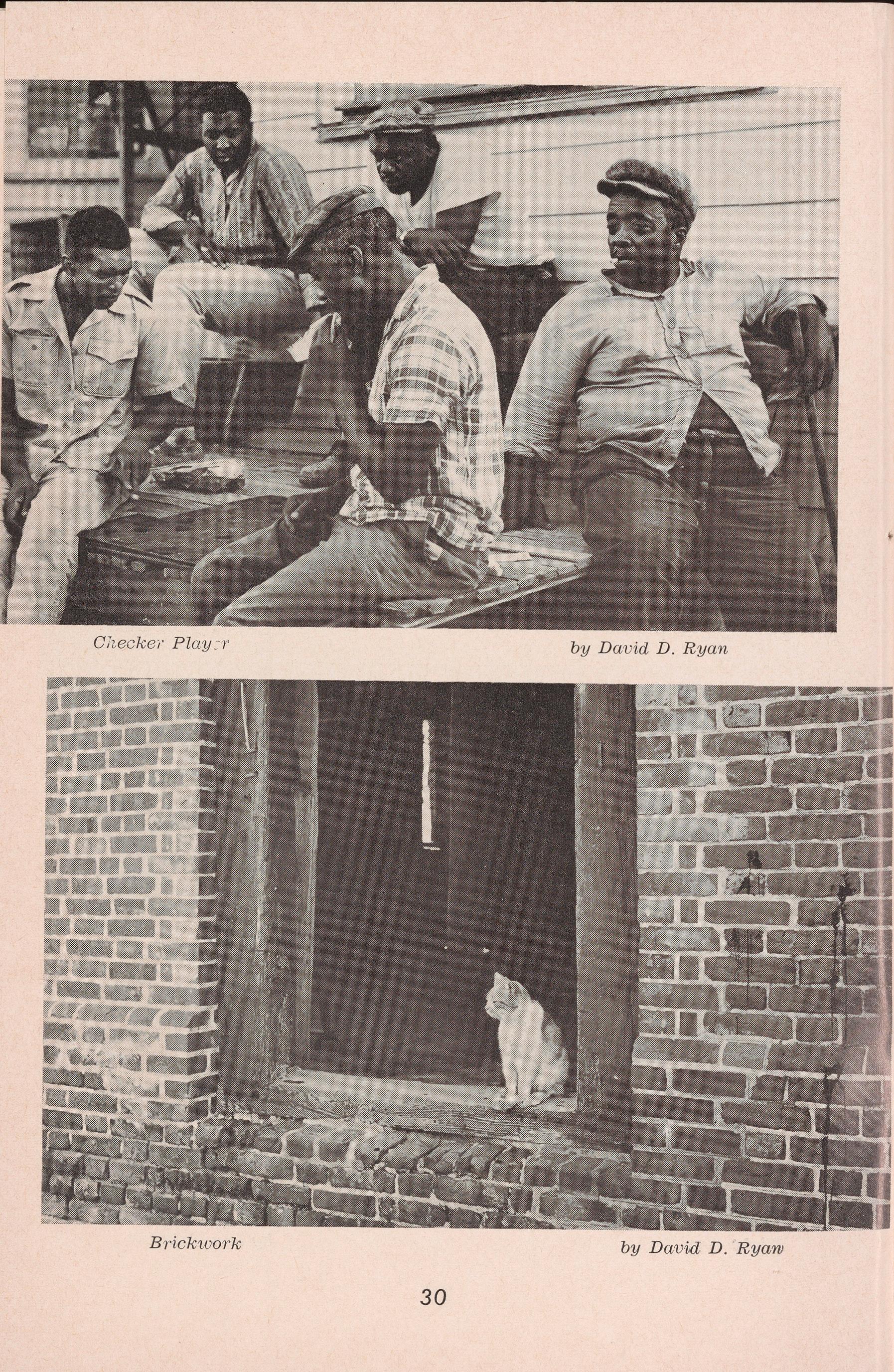
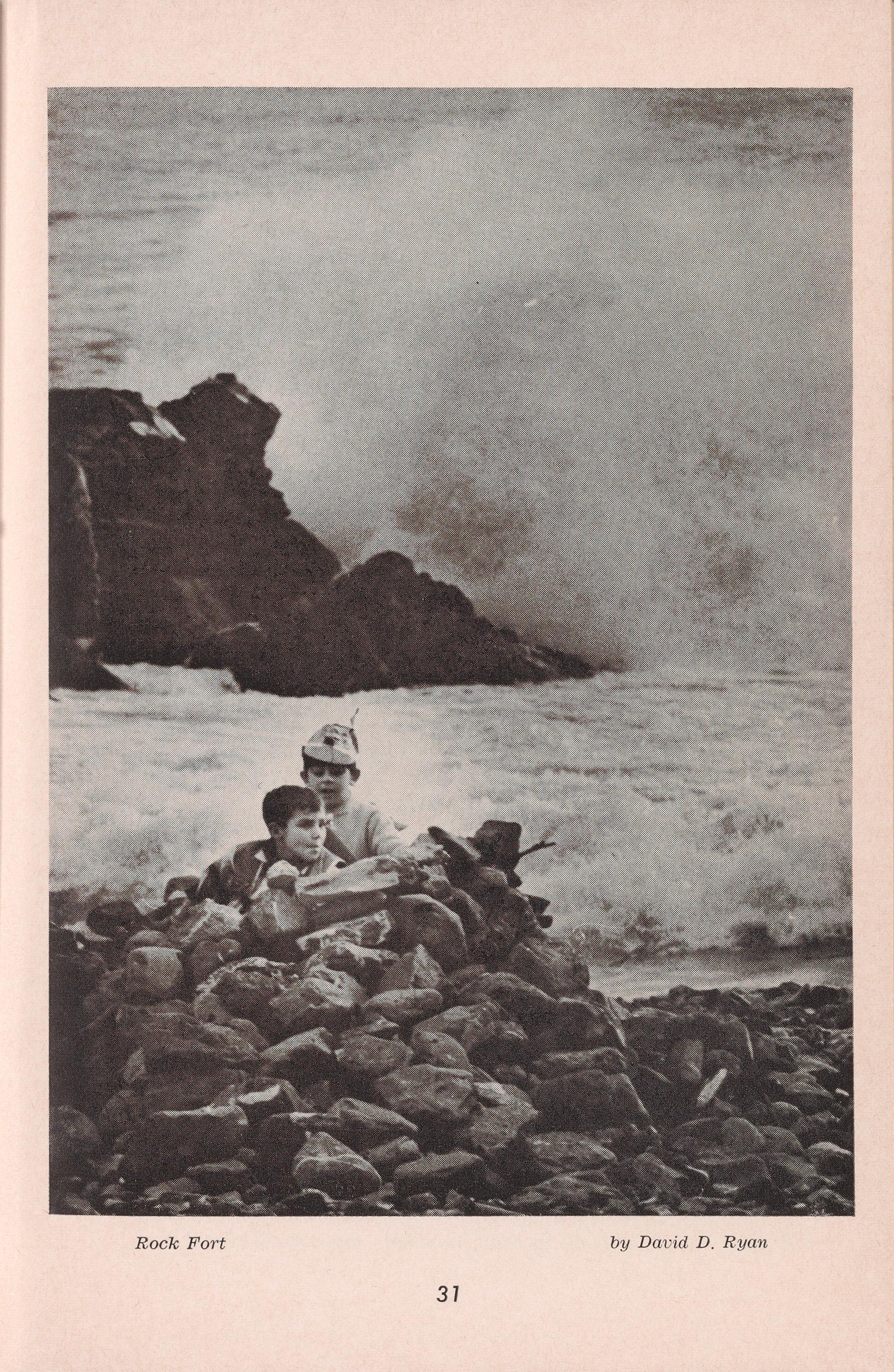
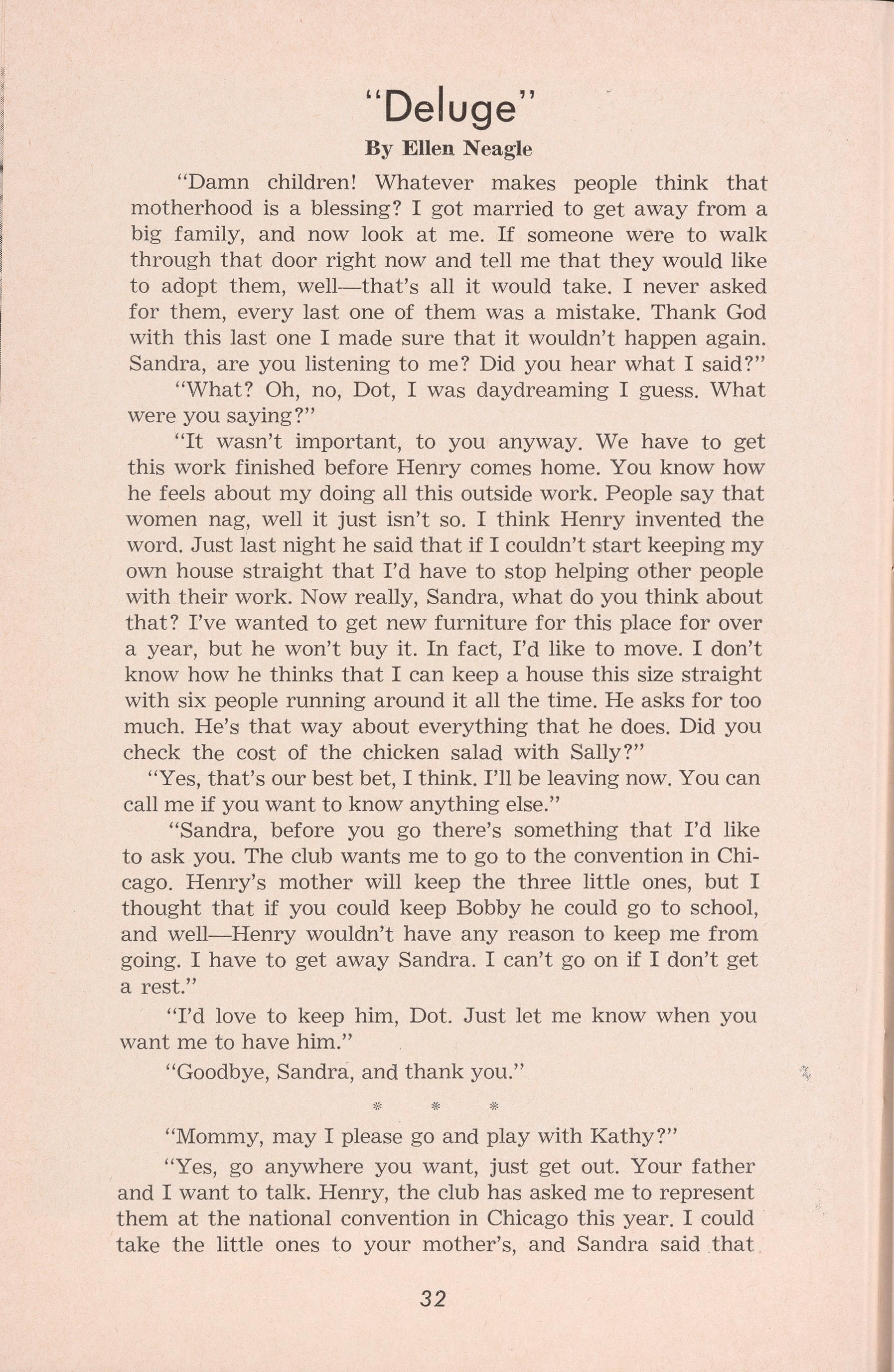
By Ellen Neagle
"Damn children! Whatever makes people think that motherhood is a blessing? I got married to get away from a big family, and now look at me . If someone were to walk through that door right now and tell me that they would like to adopt them, well-that's all it would take. I never asked for them, every last one of them was a mistake . Thank God with this last one I made sure that it wouldn't happen again. Sandra, are you listening to me? Did you hear what I said?"
"What? Oh, no, Dot, I was daydreaming I guess . What were you saying?"
"It wasn't important, to you anyway. We have to get this work finished before Henry comes home. You know how he feels about my doing all this outside work. People say that women nag, well it just isn't so. I think Henry invented the word. Just last night he said that if I couldn't srtart keeping my own house straight that I'd have to stop helping other people with their work. Now really, Sandra, what do you think about that? I've wanted to get new furniture for this place for over a year, but he won't buy it. In fact, I'd like to move. I don't know how he thinks that I can keep a house this size straight with six people running around it all the time. He asks for too much. He's that way about everything that he does. Did you check the cost of the chicken salad with Sally?"
"Yes, that's our best bet, I think. I'll be leaving now. You can call me if you want to know anything else."
"Sandra, before you go there's something that I'd like to ask you. The club wants me to go to the convention in Chicago. Henry's mother will keep the three little ones, but I thought that if you could keep Bobby he could go to school, and well-Henry wouldn't have any reason to keep me from going. I have to get away Sandra. I can't go on if I don't get a rest."
"I'd love to keep him, Dot. Just let me know when you want me to have him."
"Goodbye, Sandra, and thank you "
"Mommy, may I please go and play with Kathy?"
"Yes, go anywhere you want, just get out. Your father and I want to talk. Henry, the club has asked me to represent them at the national convention in Chicago this year. I could take the little ones to your mother's, and Sandra said that
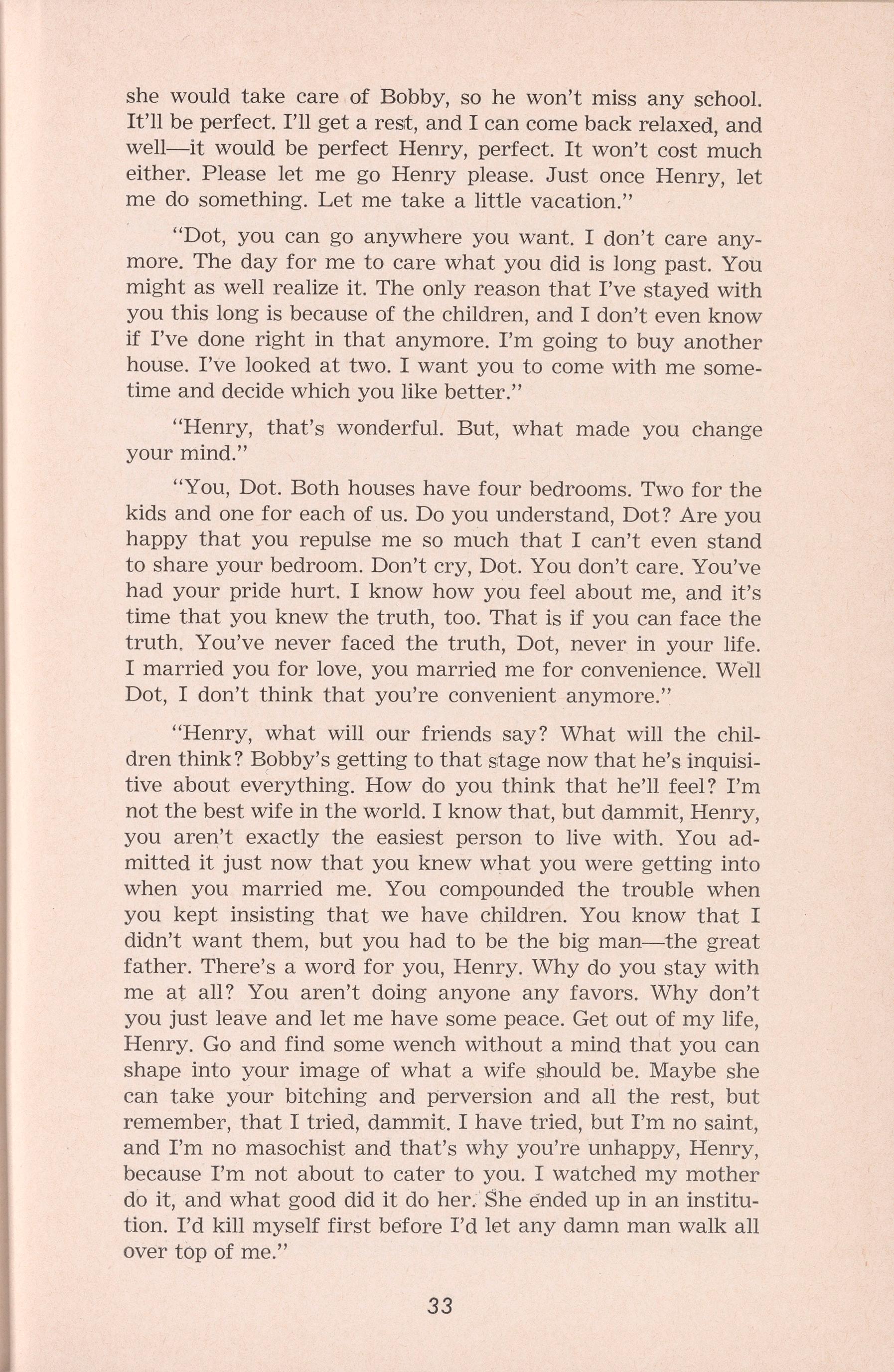
she would take care of Bobby, so he won't miss any school. It'll be perfect. I'll get a rest, and I can come back relaxed, and well-it would be perfect Henry, perfect. It won't cost much either. Please let me go Henry please. Just once Henry, let me do something. Let me take a little vacation."
"Dot, you can go anywhere you want. I don't care anymore. The day for me to care what you did is long past. You might as well realize it. The only reason that I've stayed with you this long is because of the children, and I don't even know if I've done right in that anymore. I'm going to buy another house. I've looked at two. I want you to come with me sometime and decide which you like better."
"Henry, that's wonderful. But, what made you change your mind."
"You, Dot. Both houses have four bedrooms. Two for the kids and one for each of us. Do you understand, Dot? Are you happy that you repulse me so much that I can't even stand to share your bedroom. Don't cry, Dot. You don't care. You've had your pride hurt. I know how you feel about me, and it's time that you knew the truth, too. That is if you can face the truth . You've never faced the truth, Dot, never in your life. I married you for love, you married me for convenience. Well Dot, I don't think that you're convenient anymore."
"Henry, what will our friends say? What will the children think? Bobby's getting to that stage now that he's inquisitive about everything. How do you think that he'll feel? I'm not the best wife in the world. I know that, but dammit, Henry, you aren't exactly the easiest person to live with. You admitted it just now that you knew what you were getting into when you married me. You compounded the trouble when you kept insisting that we have children. You know that I didn't want them, but you had to be the big man-the great father. There's a word for you, Henry. Why do you stay with me at all? You aren't doing anyone any favors. Why don't you just leave and let me have some peace. Get out of my life, Henry. Go and find some wench without a mind that you can shape into your image of what a wife should be. Maybe she can take your bitching and perversion and all the rest, but remember , that I tried, dammit. I have tried, but I'm no saint , and I'm no masochist and that's why you're unhappy, Henry, because I'm not about to cater to you. I watched my mother do it, and what good did it do her. She ended up in an institution . I'd kill myself first before I'd let any damn man walk all over top of me."
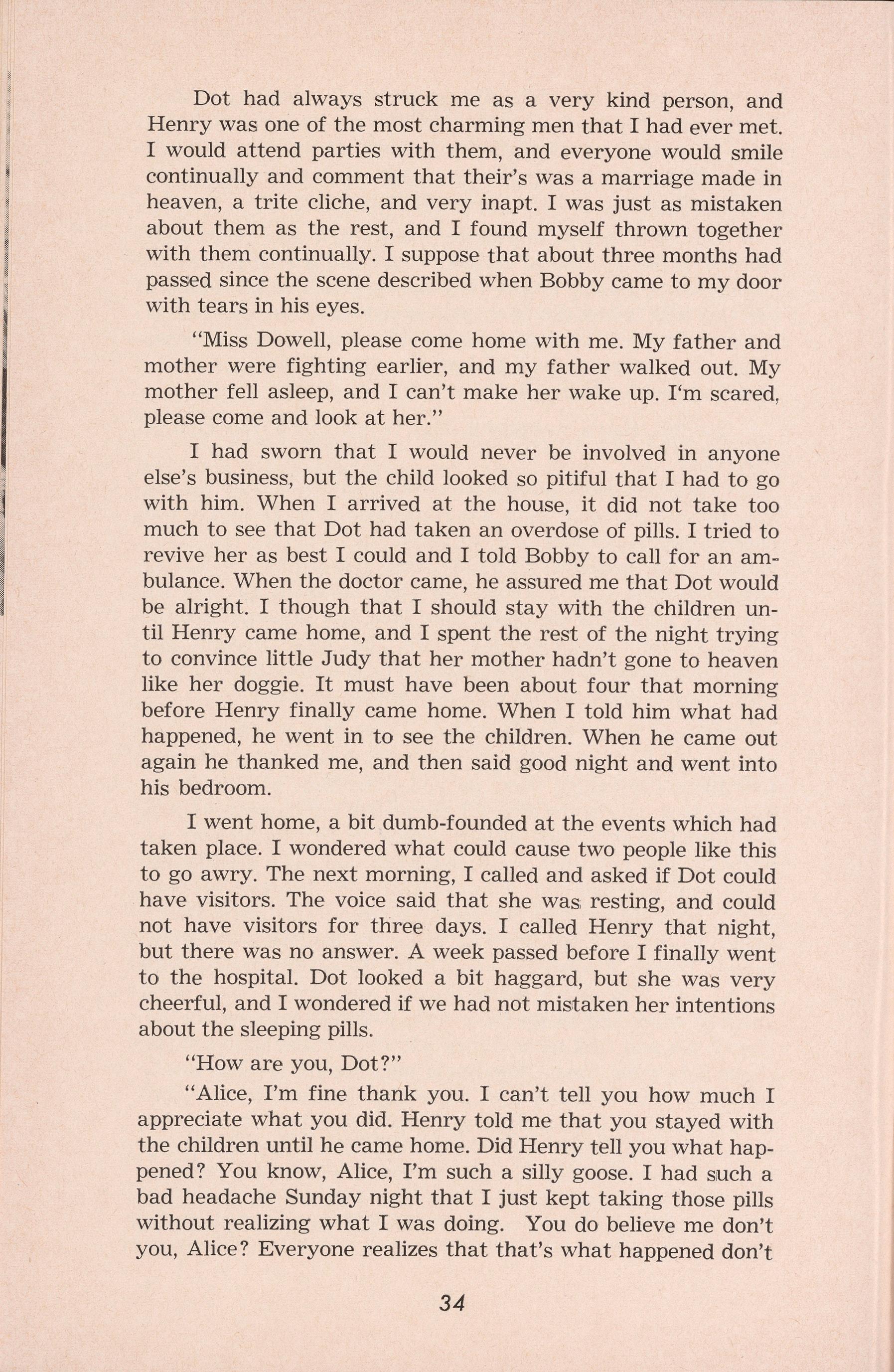
Dot had always struck me as a very kind person, and Henry was one of the most charming men that I had ever met. I would attend parties with them , and everyone would smile continually and comment that their's was a marriage made in heaven, a trite cliche, and very inapt. I was just as mistaken about them as the rest, and I found myself thrown together with them continually. I suppose that about three months had passed since the scene described when Bobby came to my door with tears in his eyes.
"Miss Dowell, please come home with me. My father and mother were fighting earlier, and my father walked out. My mother fell asleep, and I can't make her wake up. I'm scared , please come and look at her."
I had sworn that I would never be involved in anyone else's business, but the child looked so pitiful that I had to go with him. When I arrived at the house, it did not take too much to see that Dot had taken an overdose of pills. I tried to revive her as best I could and I told Bobby to call for an ambulance. When the doctor came, he assured me that Dot would be alright. I though that I should stay with the children until Henry came home, and I spent the rest of the night trying to convince little Judy that her mother hadn't gone to heaven like her doggie. It must have been about four that morning before Henry finally came home. When I told him what had happened, he went in to see the children. When he came out again he thanked me, and then said good night and went into his bedroom.
I went home, a bit dumb-founded at the events which had taken place. I wondered what could cause two people like this to go awry. The next morning, I called and asked if Dot could have visitors. The voice said that she was resting, and could not have visitors for three days. I called Henry that night, but there was no answer. A week passed before I finally went to the hospital. Dot looked a bit haggard, but she was very cheerful, and I wondered if we had not mistaken her intentions about the sleeping pills.
"How are you, Dot?"
"Alice, I'm fine thank you. I can ' t tell you how much I appreciate what you did. Henry told me that you stayed with the children until he came home. Did Henry tell you what happened? You know, Alice, I'm such a silly goose. I had such a bad headache Sunday night that I just kept taking those pills without realizing what I was doing. You do believe me don't you, Alice? Everyone realizes that that's what happened don't

they? They don't think that I'd do anything like commit suicide. Do they, Alice, do they? People misunderstand things like this. People misunderstand. Especially Henry. He mis.understands. Have you seen the children? The doctor won't let me see them, something about exciting me too much. Can you imagine a doctor saying that a mother's children would excite her too much? I hate doctors. They set themselves up as gods. How do they know what people feel? They don't have feelings, they're just machines. They don't understand."
"When do you think that you'll be able to come home?"
"I don't know. There's some business about Henry having to sign some papers or something. Henry doesn't want to sign them because he knows that I'll want to come home and get back to the old routine. Henry wants me to stay in here for a while and get a rest. Henry's so kind. He always puts my happiness above that of his own. Alice, I'm very tired."
"I'll go, Dot, I understand. I'll try to stop by again, but I'm sure that you'll be home before I do."
"I'm going to talk to Henry. Maybe he'll let me come home tomorrow. I know that he wants me home. If I promise to take care of myself and rest during the day, I'm sure that he'll sign the paper. Will you talk to him, please, Alice, tell him that I don't like it here. Tell him how they treat me. Tell him that the doctor doesn't understand."
I told Dot that I would, and felt guilty about it because I had no inte:o.tion of talking to Henry. I decided to stay as far away from their house and affairs as possible. Dot came home three days after that, but I didn't go to visit her. The children played in my yard, and I sometimes invited them in for milk and cookies. It was one of these days that Bobby questioned:
tioned, "Miss Dowell, do you know why parents always fight?"
"Why, Bobby, what ever makes you think a thing like that?"
"Well, ours do. All the time, Miss Dowell. Mommy doesn't love Daddy. She said so. She said that if she had any courage that she would get rid of him. What's courage, Miss Dowell? Is that like money?"
"No, Bobby. Courage isn't like money, but I'm sure that your parents don't mean everything that they say. You should know that when you are angry that you say things that you really don't mean."
"Yes, ma'am."
I couldn't sleep that night. Little Bobby's face kept ap-

pearing before me and I wondered what would happen to him and his sisters. I wondered how two people who seem so right for each other could be so ill-mated. I made up my mind that I would go and see Dot the next thing. There was nothing that I could do, but I had to go. I called before I went and Dot seemed pleased at the prospect of having company. When I arrived, I was stunned at the condition which the house was in.
"Alice, please excuse the mess, but Henry insists that I rest, and well-he just doesn't know the fine points of housekeeping. He's so dear, I don't know what I would do without him. You should get married, Alice, there's so much joy in being near the man you love. Really, Alice, really you must believe me. Bobby told me that he talked to you yesterday . You mustn't let anything that he says make you wonder about u s . Children don't always understand. Anyway I gave him a good spanking, an,d you can be sure that he won't bother you a g ain with his prattle. You won't be bothered. Henry thought that I was too severe, but you have to be , you can't gain respect without sterness. Are you looking at the cut on my cheek , Alice? I was messing around in the kitchen, and the knife flew up at me. Henry put some medicine on it for me. Henry always does kind things like that. Henry wants the best for me."
Dot, I thought, you're trying too hard You're pressing the issue too much. Don't you realize that the more you talk about something the less people believe. That's why they don't understand, Dot. They aren't without heart, but they a ren't without a mind either. Henry loved you once, but you didn't even try. Why must you pretend? Why?
"Alice, what are you thinking about? You certainly daydream a lot. What you need is to settle down and raise a family. You'll see it does wonders for you. Look at me. Four lovely children and a wonderful husband."
Just about this time a car drove up. It was Henry. When he came into the room I could tell that he seemed angry about something. He said, "Hello," and then he looked at Dot.
"You had to do it, didn't you, Dot? You had to try to ruin Bobby's life too."
"Henry, whatever do you mean? What will Alice think?"
I told them that I had to leave anyway, and I was relieved to be out of there. I found out the rest of the details about what happened later.
"Dot, why did you do it to him? Do you realize that you

broke your son's rib when you beat on him last night? That's why he couldn't stop crying, Dot; not because he didn't have any self-control. The nurse called me from school so that she could get permission to take him to the hospital. She said that you told her to call me because you couldn't be bothered. Is that right, Dot , are you so warped that you don't even care what happens to your own son? You've made me into a sickhearted beast, but you'll not hurt my children. You're going back to the hospital, Dot, and this time you aren't getting out. Never, Dot, do you hear me! Never! You can plead all you want . The doctors do understand you, Dot, they understand you only too well, and I'm sure that if they had a choice that they wouldn't take you either. You're sick, Dot, and you're not ugly outside, Dot, but in your heart, and you make those around you that way."
"No, Henry, not that. Don't send me back. You made me that way. It's your fault . If you try to send me back you'll regret it. I warn you. I warn you, Henry, don't try anything. Just don't, do you hear me Henry? Are you listening? I'm brave now, Henry, I won't let you crush me. You won't ruin me the way my father ruined my mother . I'm not insane, Henry, and you won't make anyone believe it. I'll tell them the truth about you, Henry, I'll tell them all. I hate you. I hate you, but you're going to stay with me, Henry, and I'm going to make you regret every last breath that you take."
"No, Dot, you're wrong, I'm not going to let you stay. You're going, and you're going tonight. There's not a doctor in the country who would side with you."
The phone rang about eight o'clock. "Alice, will you please come down here? The most wonderful thing has happened. I feel a new freedom that I've never known. Henry is never going to leave me now. I only hope that people will understand.''
I went down to the house and I found the door ajar. I went in a few steps, and just stood there. I couldn't move, or think. There was Dot, sitting on the floor in a pool of blood. The last blood that Henry would ever need. She was right. He would never be able to leave her now .
"Alice, look I'm free, I'm free, Alice, I had the courage, I knew I could do it if I could only find the courage. Do you understand?"
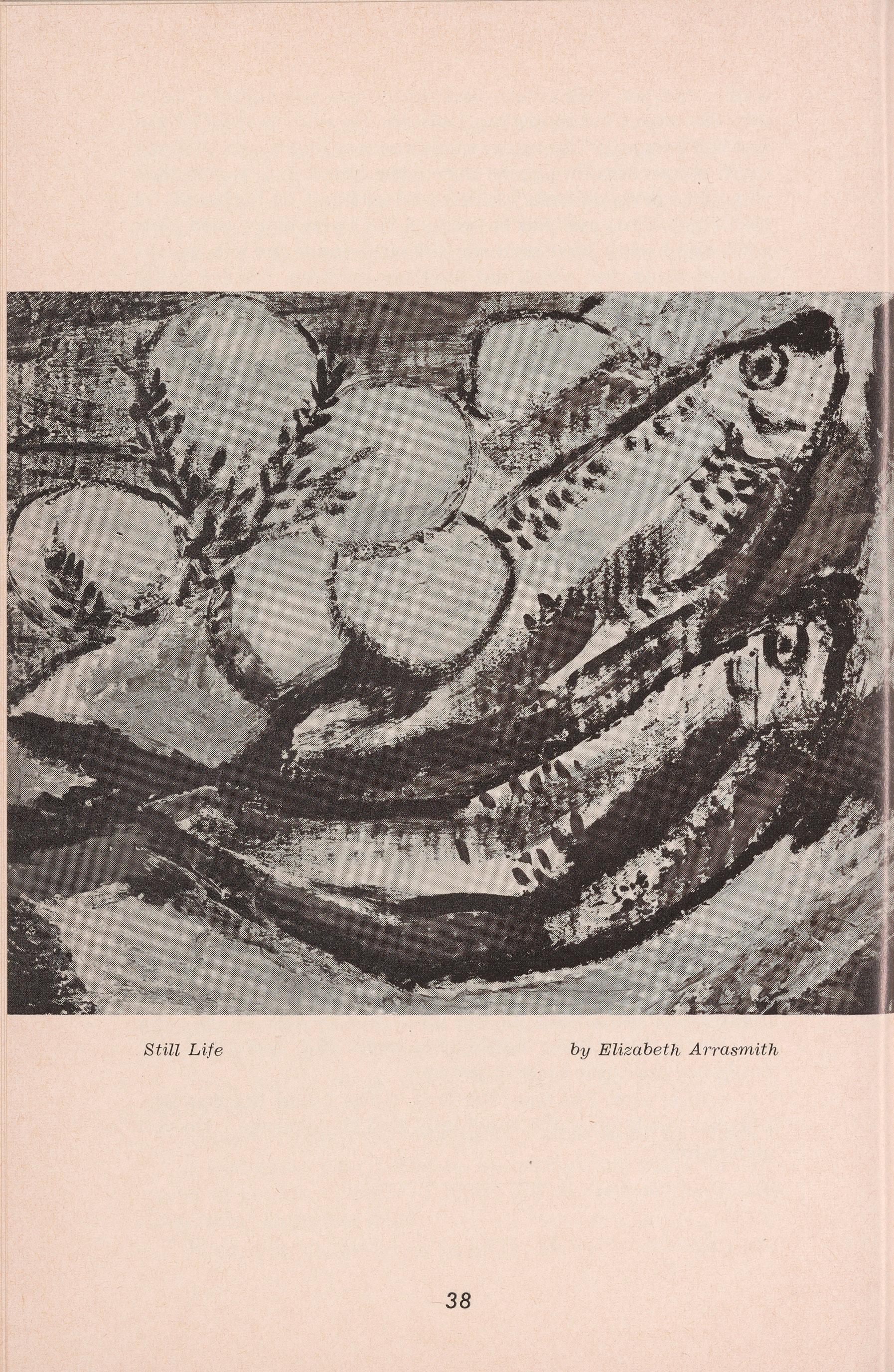
The winds of change bring snow, blow the powdered clouds around the sky and dappled gulls collage themselves against the formless world above Below, a spotted oak sits hunched above a solitary freckled cow, and now the speckled robins' eggs preserved from spring lie buried under piles of mottled leaves As man surveys, he sees it all at once, and then no more; he grasps with words, but it is gone, he looks for meaning or a lesson from the things he knows But groups and classes fade to gray, away into a world where rules are but exceptions.
-Dick Musgra ve
Parts of myself I hate; of all These, most, I guess, I hate the smallThe petty, and the hundred traits you ' d call Unmanly, and not like to make a god.
On easy ways I'd love to linger-waitBut ever pokes that bony finger-fateAnd fearing that, I take short route, quick rate, To keep a bit ahead of that cold prod.
I do not wait fair weather any moreSparrows on calm winds, eagles tempests soarNo-one lies best upon an easy whore Nor with tack-hammer, sinks a lightning rod.
-P eter Geohegan
Morning Is twilight colored. Frost glazes the earth Everywhere are cold grays, browns , and whites .
Fog
Hangs heavily on the shoulders of the River It plods under the weight .
Wafers of thin ice lay solemnly on the .surface Gray sky turns beige, then pink, then wine-crimson .
Fog
Burns away . The River moves Swiftly
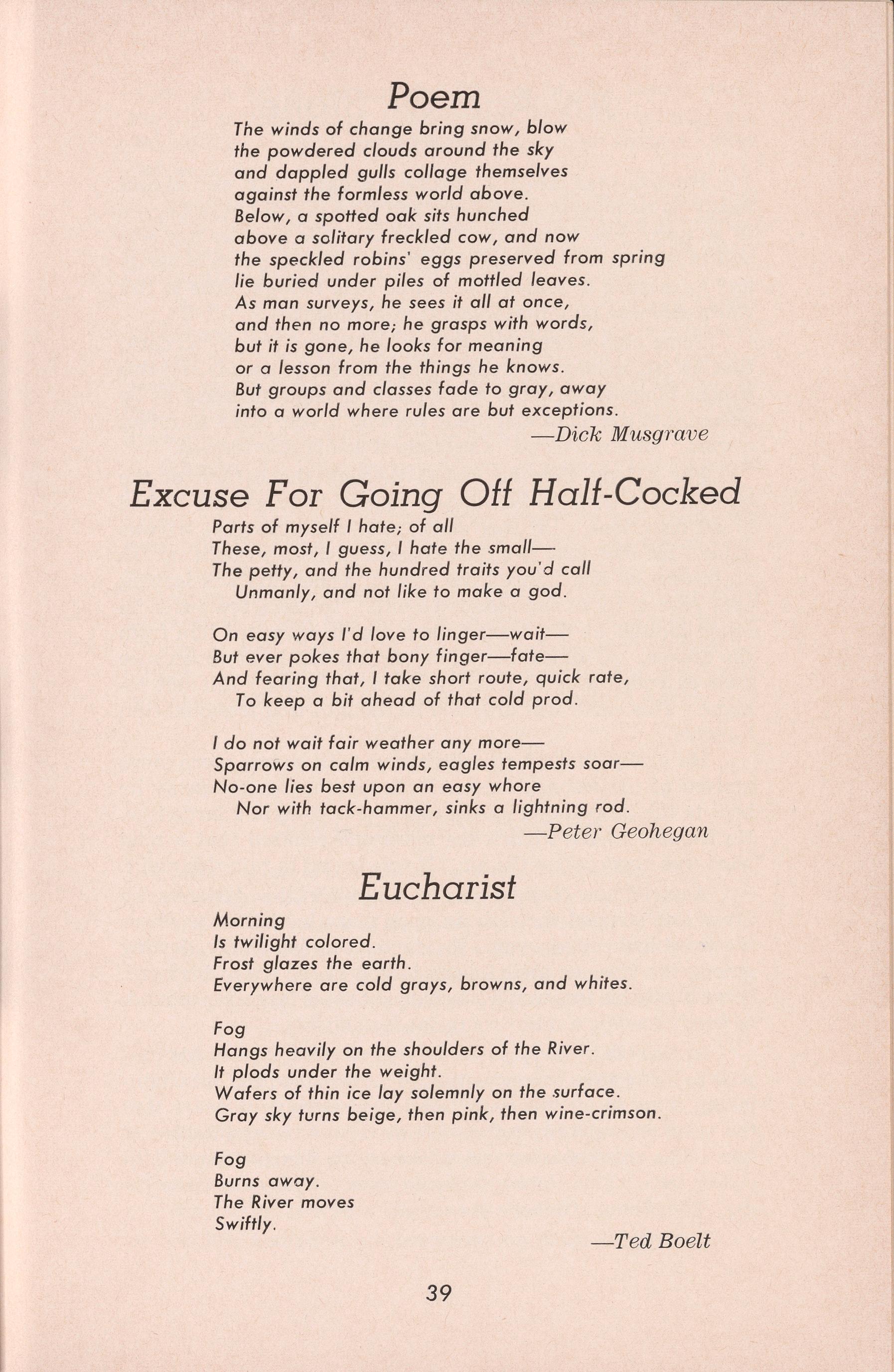
-T ed Bo elt
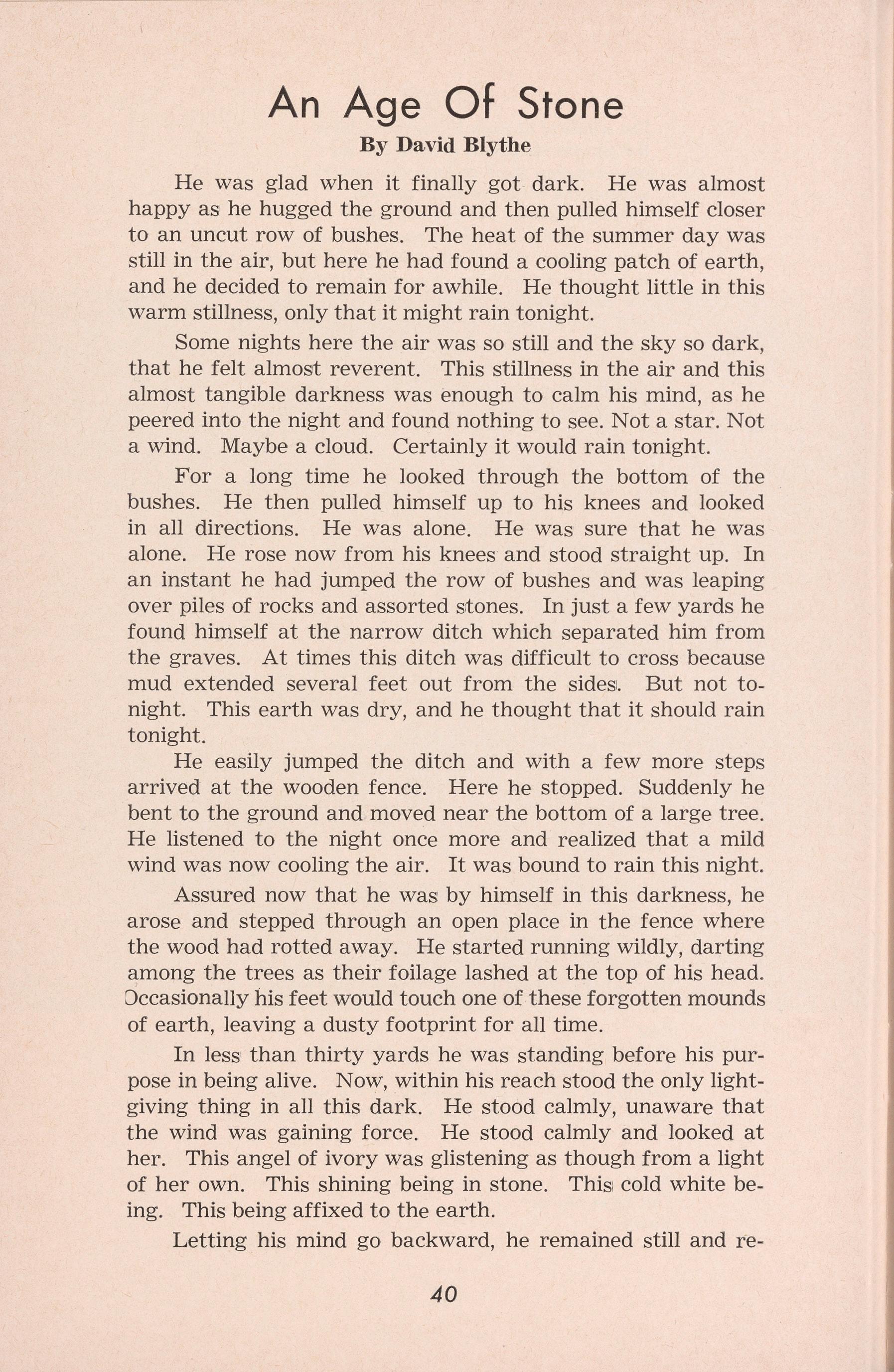
By David Blythe
He was glad when it finally got dark. He was almost happy as he hugged the ground and then pulled himself closer to an uncut row of bushes. The heat of the summer day was still in the air, but here he had found a cooling patch of earth, and he decided to remain for awhile. He thought little in this warm stillness, only that it might rain tonight.
Some nights here the air was so still and the sky so dark, that he felt almost reverent. This stillness in the air and this almost tangible darkness was enough to calm his mind, as he peered into the night and found nothing to see. Not a star. Not a wind. Maybe a cloud. Certainly it would rain tonight.
For a long time he looked through the bottom of the bushes. He then pulled himself up to his knees and looked in all directions. He was alone. He was sure that he was alone. He rose now from his knees and stood straight up. In an instant he had jumped the row of bushes and was leaping over piles of rocks and assorted stones. In just a few yards he found himself at the narrow ditch which separated him from the graves. At times this ditch was difficult to cross because mud extended several feet out from the sides 1 . But not tonight. This earth was dry, and he thought that it should rain tonight.
He easily jumped the ditch and with a few more steps arrived at the wooden fence. Here he stopped. Suddenly he bent to the ground and moved near the bottom of a large tree. He listened to the night once more and realized that a mild wind was now cooling the air. It was bound to rain this night.
Assured now that he was by himself in this darkness, he arose and stepped through an open place in the fence where the wood had rotted away. He started running wildly, darting among the trees as their foilage lashed at the top of his head. Occasionally his feet would touch one of these forgotten mounds of earth, leaving a dusty footprint for all time.
In less than thirty yards he was standing before his purpose in being alive. Now, within his reach stood the only lightgiving thing in all this dark. He stood calmly, unaware that the wind was gaining force. He stood calmly and looked at her. This angel of ivory was glistening as though from a light of her own. This shining being in stone. This : cold white being. This being affixed to the earth.
Letting his mind go backward, he remained still and re-
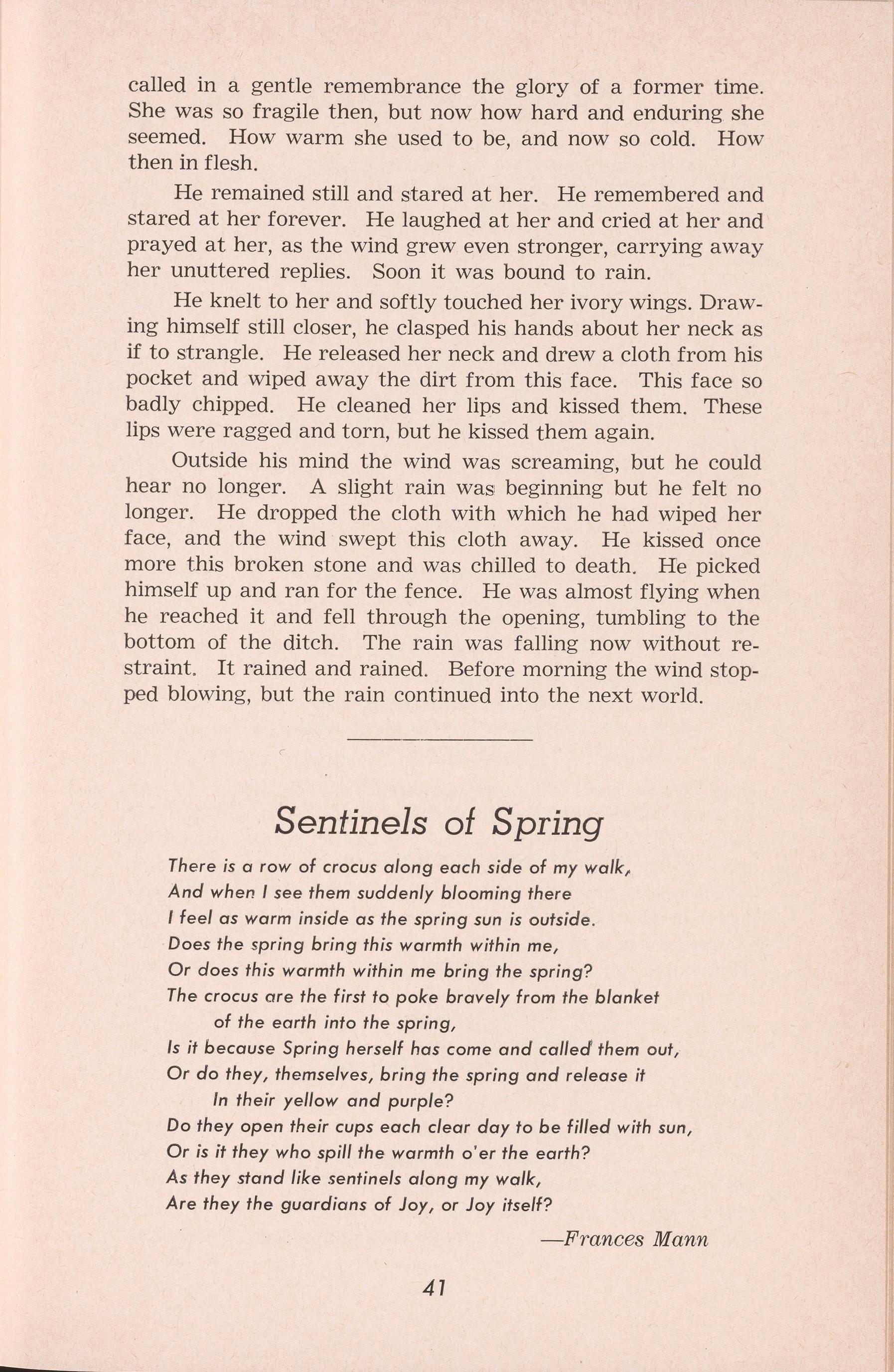
called in a gentle remembrance the glory of a former time. She was so fragile then, but now how hard and enduring she seemed. How warm she used to be, and now so cold. How then in flesh.
He remained still and stared at her. He remembered and stared at her forever. He laughed at her and cried at her and prayed at her, as the wind grew even stronger, carrying away her unuttered replies. Soon it was bound to rain.
He knelt to her and softly touched her ivory wings. Drawing himself still closer, he clasped his hands about her neck as if to strangle . He released her neck and drew a cloth from his pocket and wiped away the dirt from this face. This face so badly chipped. He cleaned her lips and kissed them. These lips were ragged and torn, but he kissed them again.
Outside his mind the wind was screaming, but he could hear no longer. A slight rain was beginning but he felt no longer . He dropped the cloth with which he had wiped her face , and the wind swept this cloth away. He kissed once more this broken stone and was chilled to death. He picked himself up and ran for the fence. He was almost flying when he reached it and fell through the opening, tumbling to the bottom of the ditch. The rain was falling now without restraint. It rained and rained . Before morning the wind stopped blowing , but the rain continued into the next world.
There is a row of crocus along each side of my walk , And when I see them suddenly blooming there I feel as warm inside as the spring sun is outside Does the spring bring this warmth within me, Or does this warmth within me bring the spring? The crocus are the first to poke bravely from the blanket of the earth into the spring, Is it because Spring herself has come and callee/ them out, Or do they, themselves, bring the spring and release it
In their yellow and purple? Do they open their cups each clear day to be filled with sun, Or is it they who spill the warmth o ' er the earth? As they stand like sentinels along my walk, Are they the guardians of Joy, or Joy itself?
-Frances Mann
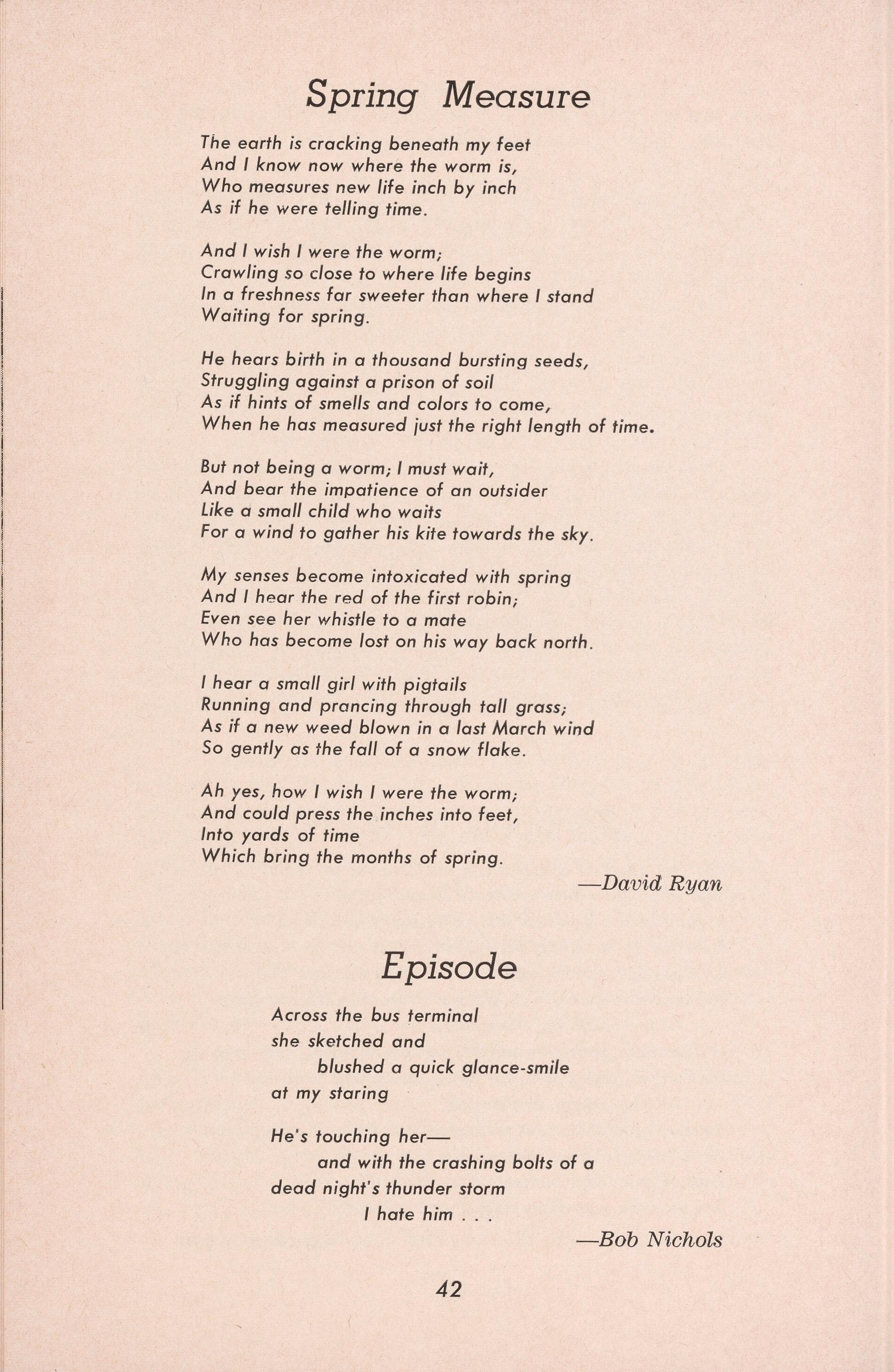
The earth is cracking beneath my feet
And I know now where the worm is, Who measures new life inch by inch
As if he were telling time .
And I wish I were the worm; Crawling so close to where life begins In a freshness far sweeter than where I stand Waiting for spring
He hears birth in a thousand bursting seeds, Struggling against a prison of soil
As if hints of smells and colors to come, When he has measured iust the right length of time.
But not being a worm; I must wait, And bear the impatience of an outsider
Like a small child who waits For a wind to gather his kite towards the sky
My senses become intoxicated with spring And I hear the red of the first robin; Even see her whistle to a mate Who has become lost on his way back north .
I hear a small girl with pigtails
Running and prancing through tall grass; As if a new weed blown in a last March wind So gently as the fall of a snow flake
Ah yes, how I wish I were the worm; And could press the inches into feet, Into yards of time Which bring the months of spring.
Across the bus terminal she sketched and blushed a quick glance-smile at my staring
He 's touching her-
-Da v id Ryan and with the crashing bolts of a dead night's thunder storm I hate him . .
-Bob Nichols
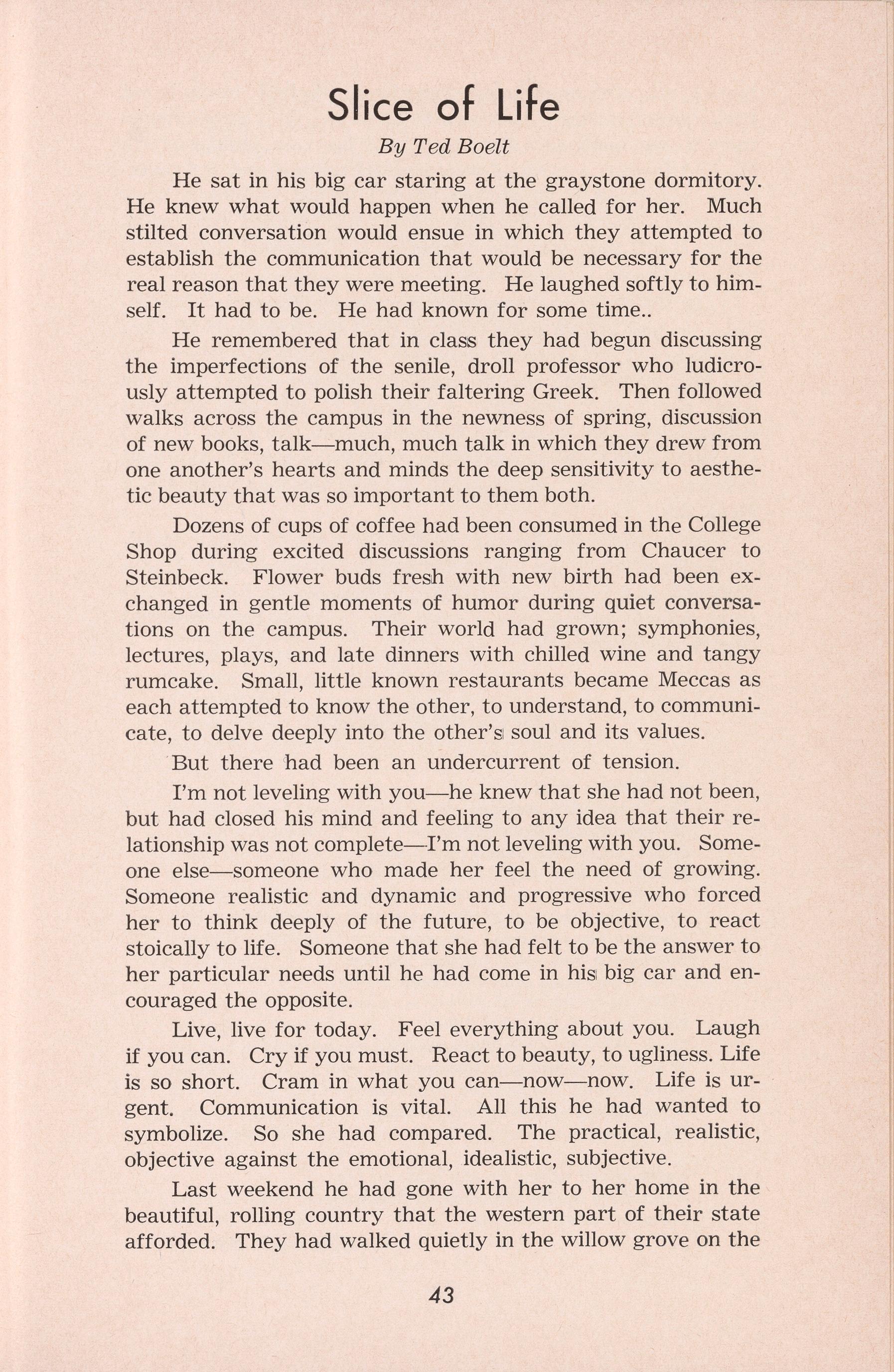
By Ted Boelt
He sat in his big car staring at the graystone dormitory. He knew what would happen when he called for her. Much stilted conversation would ensue in which they attempted to establish the communication that would be necessary for the real reason that they were meeting. He laughed softly to himself. It had to be. He had known for some time ..
He remembered that in class they had begun discussing the imperfections of the senile, droll professor who ludicrously attempted to polish their faltering Greek. Then followed walks across the campus in the newness of spring, discuss~on of new books, talk-much, much talk in which they drew from one another's hearts and minds the deep sensitivity to aesthetic beauty that was so important to them both.
Dozens of cups of coffee had been consumed in the College Shop during excited discussions ranging from Chaucer to Steinbeck. Flower buds fresh with new birth had been exchanged in gentle moments of humor during quiet conversations on the campus. Their world had grown; symphonies, lectures, plays, and late dinners with chilled wine and tangy rumcake. Small, little known restaurants became Meccas as each attempted to know the other, to understand, to communicate, to delve deeply into the other's 1soul and its values.
·But there had been an undercurrent of tension.
I'm not leveling with you-he knew that she had not been, but had closed his mind and feeling to any idea that their relationship was not complete-I'm not leveling with you. Someone else-someone who made her feel the need of growing . Someone realistic and dynamic and progressive who forced her to think deeply of the future, to be objective, to react stoically to life. Someone that she had felt to be the answer to her particular needs until he had come in his 1big car and encouraged the opposite.
Live, live for today. Feel everything about you. Laugh if you can. Cry if you must. React to beauty, to ugliness . Life is so short. Cram in what you can-now-now. Life is urgent. Communication is vital. All this he had wanted to symbolize. So she had compared. The practical , realistic , objective against the emotional, idealistic, subjective .
Last weekend he had gone with her to her home in the beautiful, rolling country that the western part of their state afforded. They had walked quietly in the willow grove on the
bank of the stream adjacent to her home. He had known joy at their communication, their sensitivity to life, their minds reachtoward one another. But there had been an undercurrent. He had broken a sprig of white bridal wreath and ceremoniously presented it to her as though it were a dozen longstemmed American Beauties. She had laughed that mild, lilting laugh that only she mastered, and received it as graciously as Queen Victoria herself.
He stared at the graystone dormitory. Today is Wednesday-he had known many defeats since the weekend. His ego was battered; his idealism wounded. The cycle was down. So sihe had compared, and because she wanted-what was the word she used? Polarity, a contrast to her own ideas of subjectivism-he knew her decision before she spoke it, and the reason that she had told him to call for her. Spring had taken a temporary vacation and the cold weather supported a bleak sky.
As he sat in his big car, he saw the sprig of bridal wreath on the floormat where it had dropped four days earlier. It was withered and brown. He laughed resignedly to himself. One more defeat-but in spite of even this, he knew that he would ever be an idealist.

Alone
And lacking scent
The single cedar stands
Of three that Friday's only once
Embraced upon a naked hilltop skull,
A noontide hour nightime blackened shadow
Not of sun but freezing darkness born,
The stagnant burden of creation-choosing creature 's Constant life be-cursing wages,
Brimful cup that could not pass the lips
Of one that hung upon the cedar crying
Black beneath the silent Other
Black where only conscience could have moaned
Its lack and louder groaning agony
Black beneath the heaving heaven's
Blood-indulging hell-unfeeling clouds
That turned their backs upon the twisting God-forsaken
Death-bread taking for the bride of life
And rolling out the star-dice for his cloak . Creation called a corpse.
-Charles P. Barrett
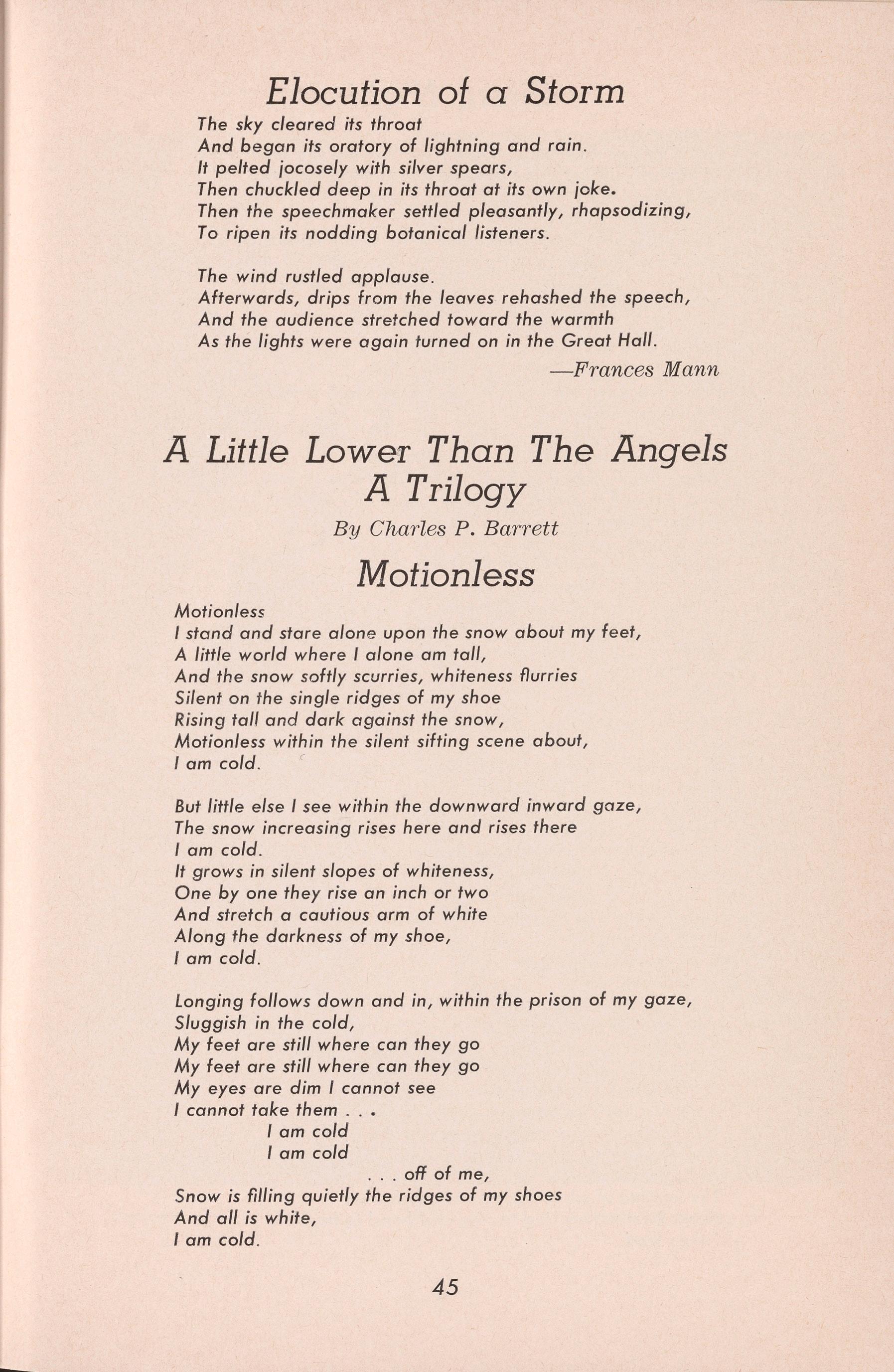
The sky cleared its throat And began its oratory of lightning and rain . It pelted jocosely with silver spears, Then chuckled deep in its throat at its own joke. Then the speechmaker settled pleasantly, rhapsodizing, To ripen its nodding botanical listeners.
The wind rustled applause. Afterwards, drips from the leaves rehashed the speech, And the audience stretched toward the warmth As the lights were again turned on in the Great Hall . -Franc es Mann
By Charl es P. Barrett
Motionless I stand and stare alone upon the snow about my feet, A little world where I alone am tall, And the snow softly scurries, whiteness flurries Silent on the single ridges of my shoe Rising tall and dark against the snow, Motionless within the silent sifting scene about, I am cold .
But little else I see within the downward inward gaze, The snow increasing rises here and rises there I am cold . It grows in silent slopes of whiteness, One by one they rise an inch or two And stretch a cautious arm of white Along the darkness of my shoe, I am cold .
Longing follows down and in, within the prison of my gaze, Sluggish in the cold, My feet are still where can they go
My feet are still where can they go
My eyes are dim I cannot see I cannot take them .•
I am cold
I am cold off of me, Snow is filling quietly the ridges of my shoes And all is white, I am cold
Unreal night
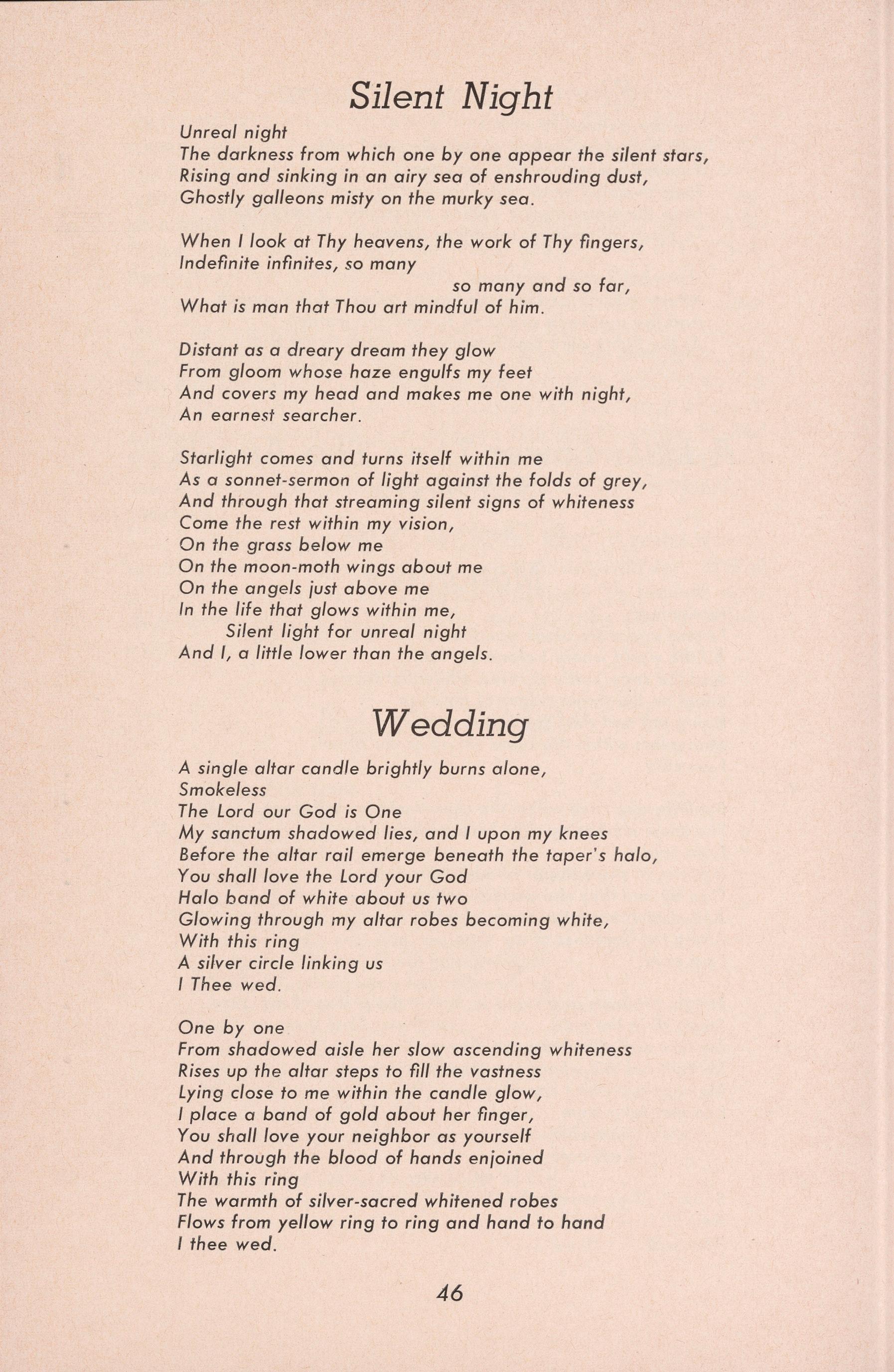
The darkness from which one by one appear the silent stars , Rising and sinking in an airy sea of enshrouding dust, Ghostly galleons misty on the murky sea .
When I look at Thy heavens, the work of Thy fingers , Indefinite infinites, so many so many and so far, What is man that Thou art mindful of him .
Distant as a dreary dream they glow
From gloom whose haze engulfs my feet
And covers my head and makes me one with night ,
An earnest searcher .
Starlight comes and turns itself within me
As a sonnet-sermon of light against the folds of grey ,
And through that streaming silent signs of whiteness
Come the rest within my vision,
On the grass below me
On the moon-moth wings about me
On the angels iust above me
In the life that glows within me, Silent light for unreal night
And I, a little lower than the angels.
A single altar candle brightly burns alone , Smokeless
The Lord our God is One
My sanctum shadowed lies, and I upon my knees
Before the altar rail emerge beneath the taper 's halo, You shall love the Lord your God
Halo band of white about us two
Glowing through my altar robes becoming white,
With this ring
A silver circle linking us
I Thee wed
One by one
From shadowed aisle her slow ascending whiteness
Rises up the altar steps to fill the vastness
Lying close to me within the candle glow,
I place a band of gold about her finger, You shall love your neighbor as yourself
And through the blood of hands enioined
With this ring
The warmth of silver-sacred whitened robes
Flows from yellow ring to ring and hand to hand
I thee wed
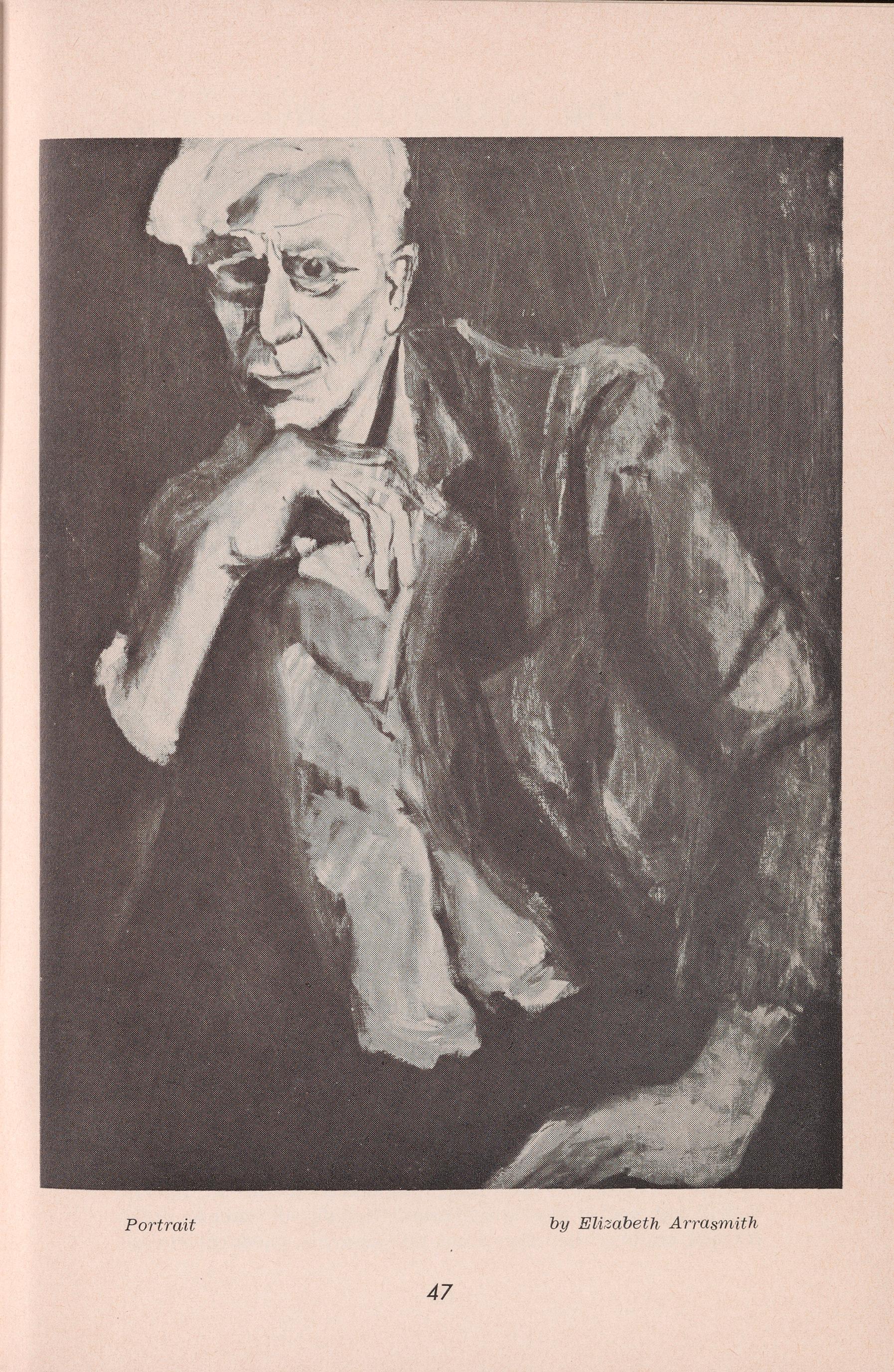
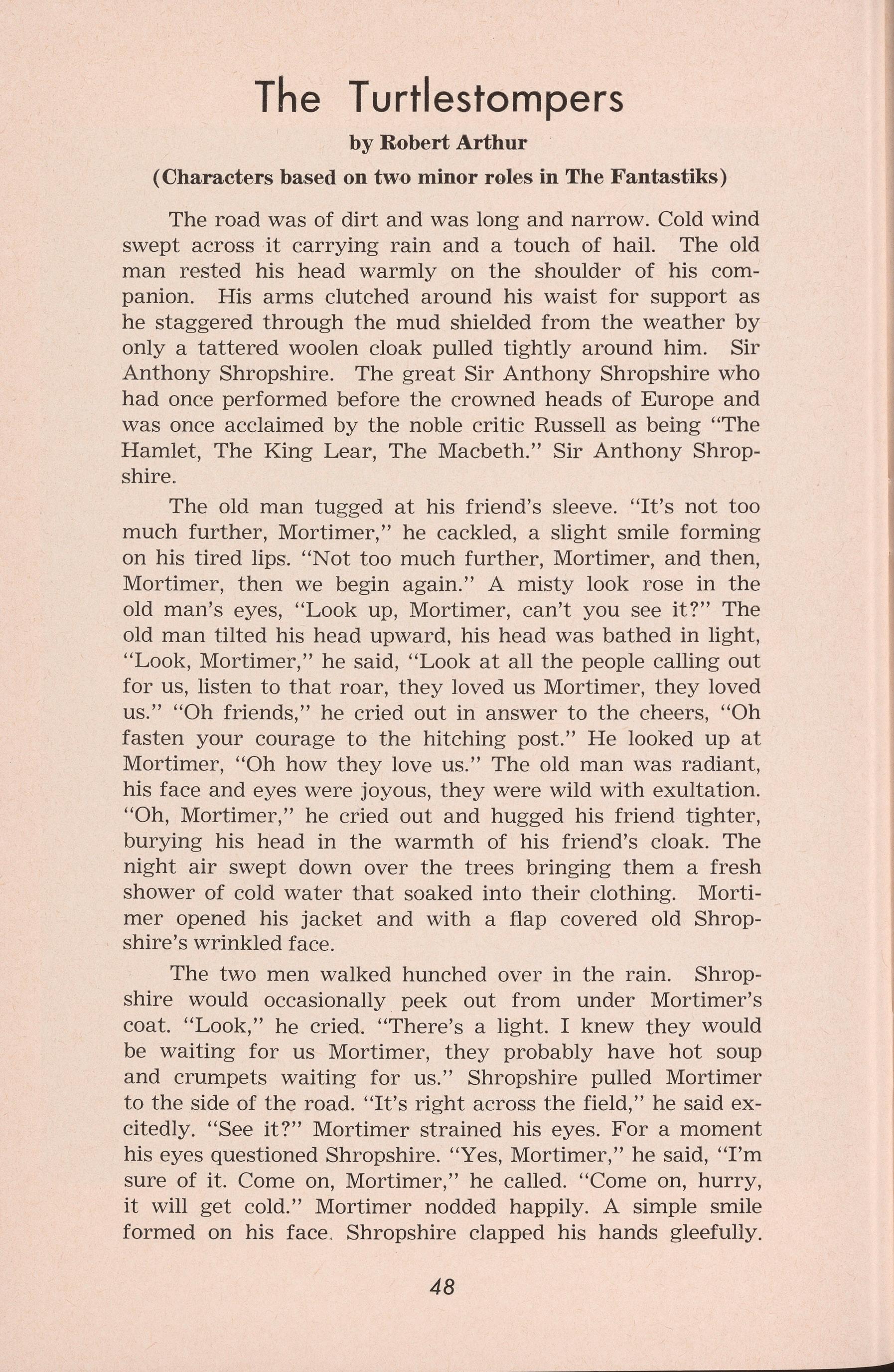
by Robert Arthur
( Characters based on two minor roles in The Fantastiks)
The road was of dirt and was long and narrow. Cold wind swept across it carrying rain and a touch of hail. The old man rested his head warmly on the shoulder of his companion. His arms clutched around his waist for support as he staggered through the mud shielded from the weather by only a tattered woolen cloak pulled tightly around him. Sir Anthony Shropshire. The great Sir Anthony Shropshire who had once performed before the crowned heads of Europe and was once acclaimed by the noble critic Russell as being "The Hamlet, The King Lear, The Macbeth." Sir Anthony Shropshire .
The old man tugged at his friend's sleeve. "It's not too much further, Mortimer," he cackled, a slight smile forming on his tired lips . "Not too much further, Mortimer, and then, Mortimer, then we begin again." A misty look rose in the old man's eyes, "Look up, Mortimer, can't you see it?" The old man tilted his head upward, his head was bathed in light , "Look, Mortimer," he said, "Look at all the people calling out for us, listen to that roar, they loved us Mortimer, they loved us." "Oh friends," he cried out in answer to the cheers, "Oh fasten your courage to the hitching post ." He looked up at Mortimer, "Oh how they love us." The old man was radiant, his face and eyes were joyous, they were wild with exultation. "Oh, Mortimer," he cried out and hugged his friend tighter, burying his head in the warmth of his friend's cloak. The night air swept down over the trees bringing them a fresh shower of cold water that soaked into their clothing. Mortimer opened his jacket and with a flap covered old Shropshire's wrinkled face .
The two men walked hunched over in the rain. Shropshire would occasionally . peek out from under Mortimer's coat. "Look," he cried. "There's a light. I knew they would be waiting for us Mortimer, they probably have hot soup and crumpets waiting for us." Shropshire pulled Mortimer to the side of the road. "It's right across the field," he said excitedly. "See it?" Mortimer strained his eyes . For a moment his eyes questioned Shropshire. "Yes, Mortimer," he said, "I'm sure of it. Come on, Mortimer," he called. "Come on, hurry, it will get cold." Mortimer nodded happily. A simple smile formed on his face . Shropshire clapped his hands gleefully .
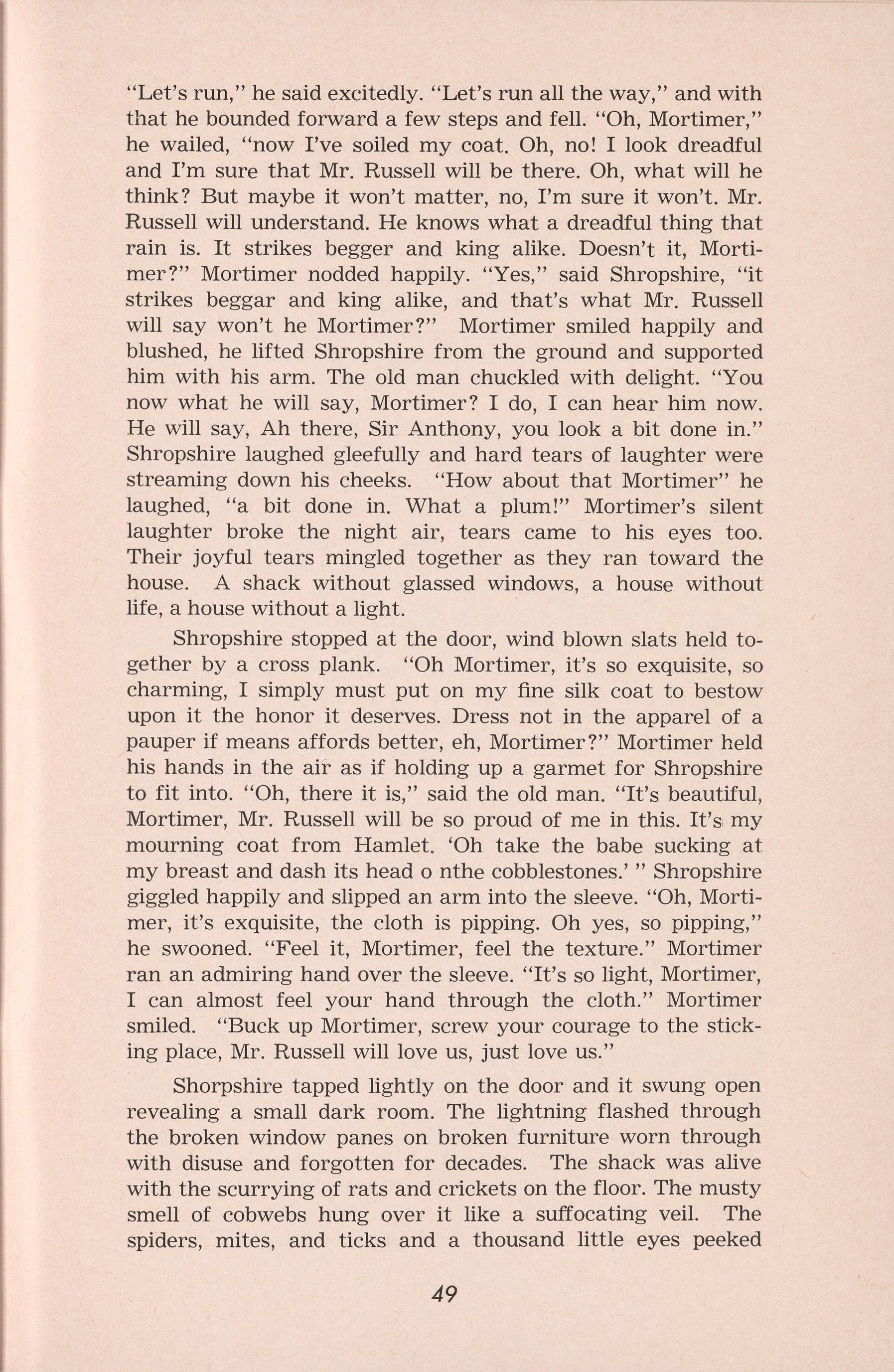
"Let's run," he said excitedly. "Let's run all the way," and with that he bounded forward a few steps and fell. "Oh, Mortimer," he wailed, "now I've soiled my coat. Oh, no! I look dreadful and I'm sure that Mr. Russell will be there. Oh, what will he think? But maybe it won't matter, no, I'm sure it won't. Mr. Russell will understand. He knows what a dreadful thing that rain is. It strikes begger and king alike. Doesn't it, Mortimer?" Mortimer nodded happily. "Yes," said Shropshire, "it strikes beggar and king alike, and that's what Mr. Russell will say won't he Mortimer?" Mortimer smiled happily and blushed, he lifted Shropshire from the ground and supported him with his arm . The old man chuckled with delight. "You now what he will say, Mortimer? I do, I can hear him now . He will say, Ah there, Sir Anthony, you look a bit done in." Shropshire laughed gleefully and hard tears of laughter were streaming down his cheeks. "How about that Mortimer" he laughed, "a bit done in. What a plum!" Mortimer's silent laughter broke the night air, tears came to his eyes too. Their joyful tears mingled together as they ran toward the house. A shack without glassed windows, a house without life, a house without a light.
Shropshire stopped at the door, wind blown slats held together by a cross plank. "Oh Mortimer , it's so exquisite, so charming, I simply must put on my fine silk coat to bestow upon it the honor it deserves . Dress not in the apparel of a pauper if means affords better, eh, Mortimer?" Mortimer held his hands in the air as if holding up a garmet for Shropshire to fit into. "Oh, there it is," said the old man. "It's beautiful , Mortimer, Mr. Russell will be so proud of me in this. It's , my mourning coat from Hamlet . 'Oh take the babe sucking at my breast and dash its head o nthe cobblestones.' " Shropshire giggled happily and slipped an arm into the sleeve "Oh, Mortimer, it's exquisite, the cloth is pipping. Oh yes, so pipping," he swooned. "Feel it, Mortimer, feel the texture." Mortimer ran an admiring hand over the sleeve. "It's so light, Mortimer, I can almost feel your hand through the cloth." Mortimer smiled. "Buck up Mortimer, screw your courage to the sticking place, Mr. Russell will love us, just love us "
Shorpshire tapped lightly on the door and it swung open revealing a small dark room. The lightning flashed through the broken window panes on broken furniture worn through with disuse and forgotten for decades The shack was alive with the scurrying of rats and crickets on the floor The musty smell of cobwebs hung over it like a suffocating veil. The spiders, mites, and ticks and a thousand little eyes peeked
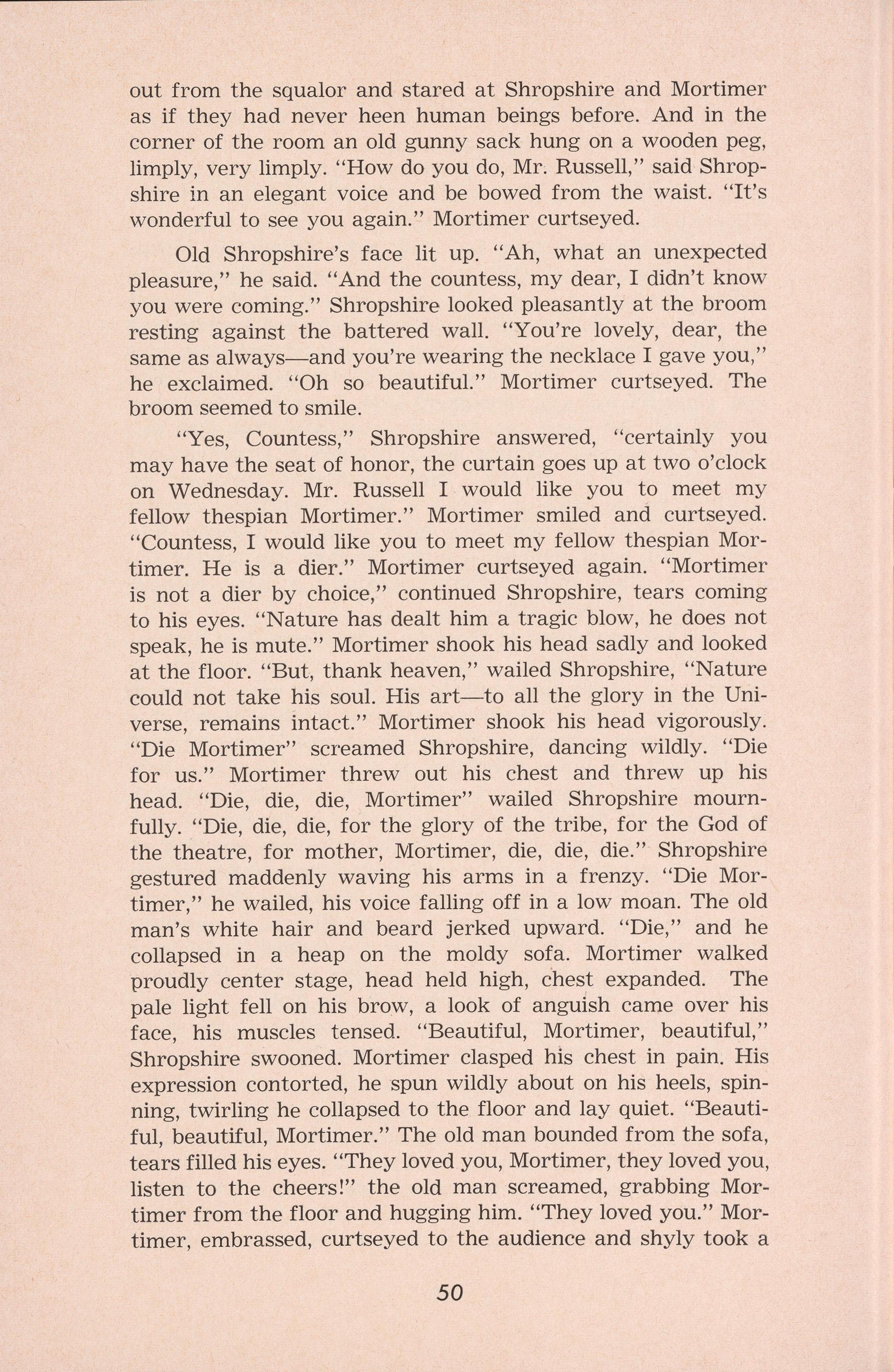
out from the squalor and stared at Shropshire and Mortimer as if they had never heen human beings before. And in the corner of the room an old gunny sack hung on a wooden peg, limply, very limply. "How do you do, Mr. Russell," said Shropshire in an elegant voice and be bowed from the waist. "It's wonderful to see you again." Mortimer curtseyed.
Old Shropshire's face lit up. "Ah, what an unexpected pleasure," he said. "And the countess, my dear, I didn't know you were coming." Shropshire looked pleasantly at the broom resting against the battered wall. "You're lovely, dear, the same as always-and you're wearing the necklace I gave you," he exclaimed. "Oh so beautiful." Mortimer curtseyed. The broom seemed to smile.
"Yes, Countess," Shropshire answered, "certainly you may have the seat of honor, the curtain goes up at two o'clock on Wednesday. Mr. Russell I would like you to meet my fellow thespian Mortimer." Mortimer smiled and curtseyed. "Countess, I would like you to meet my fellow thespian Mortimer. He is a dier." Mortimer curtseyed again. "Mortimer is not a dier by choice," continued Shropshire, tears coming to his eyes. "Nature has dealt him a tragic blow, he does not speak, he is mute." Mortimer shook his head sadly and looked at the floor. "But, thank heaven," wailed Shropshire, "Nature could not take his soul. His art-to all the glory in the Universe, remains intact." Mortimer shook his head vigorously. "Die Mortimer" screamed Shropshire, dancing wildly. "Die for us." Mortimer threw out his chest and threw up his head. "Die, die, die, Mortimer" wailed Shropshire mournfully. "Die, die, die, for the glory of the tribe, for the God of the theatre, for mother, Mortimer, die, die, die." Shropshire gestured maddenly waving his arms in a frenzy. "Die Mortimer," he wailed, his voice falling off in a low moan. The old man's white hair and beard jerked upward. "Die," and he collapsed in a heap on the moldy sofa. Mortimer walked proudly center stage, head held high, chest expanded. The pale light fell on his brow, a look of anguish came over his face, his muscles tensed. "Beautiful, Mortimer, beautiful," Shropshire swooned. Mortimer clasped his chest in pain. His expression contorted, he spun wildly about on his heels, spinning, twirling he collapsed to the floor and lay quiet. "Beautiful, beautiful, Mortimer." The old man bounded from the sofa, tears filled his eyes. "They loved you, Mortimer, they loved you, listen to the cheers!" the old man screamed, grabbing Mortimer from the floor and hugging him. "They loved you." Mortimer, embrassed, curtseyed to the audience and shyly took a

seat on the sofa. Shropshire, exhausted, took a seat beside him.
Shropshire exhalted deeply, "Ah, Mr. Russell and Countess Eleanor, one must relax and catch one's breath after a performance such at that. Well, Mr. Russell, I suppose you want to know all about my next performance. Imagine, Mr. Russell, this will be the crowning triumph of my career, Seventy-seven years on the stage waiting for this. I can hear their cheers now, rising and swelling like a tidal wave devouring a mountain then rising then rising then rising, -rising to the moon." A light flashed in the old man's eyes. "Oh, they'll love me," he shouted. The old man looked up and caught Mortimer's eyes. Mortimer extended a long brown finger and pointed to his chest pleadingly. "Not yet, Mortimer," said Shropshire. "Oh I shall pour my soul into the part. Oh there never bloomed a rose so red." Mortimer repeated the gesture frantically. Shropshire ignored the gesture. "It shall be like Anglewood, like Thames, like the royal court itself -and they shall throw flowers, hundreds and hundreds of roses, red, white. Oh roses, roses, I shall be knee deep in roses." Excitement rose in his voice, his eyes were dreaming, glistening with vision. Mortimer's hand had become a fist, he was pounding his chest madly and weeping with the blows. His mouth was forming words, his tears fell from his eyes and ran into his silent lips, "me, me, me." Shropshire threw his hands high over his head, "Oh thank you, thank you, thank you." The fists pounded, "me, me, me." The old actor brought his eyes back to the earth. "I'm sorry Mortimer, I'm sorry, don't cry, don't cry Mortimer, I'll tell them, don't cry." Shropshire turned his gaze to the empty room. "Please excuse Mortimer, he's sensitive, Mortimer is a weeper." The old man turned back to his friends. "I'll tell them about you, Mortimer, don't cry. Mortimer wants me to tell you about him, and I must, I don't want to leave him out." Shropshire got up from the sofa and walked very slowly to center stage, he held his head up into the light with an expression of immeasurable sadness. The music sounded, grew louder and built into a loud crescendo of sweetness and then died down slowly into a sad symphony of silence. "Ladies and gentlemen, Countess and Mr. Russell, my friend Mortimer." Shropshire wailed mournfully and extended his arm in a magnificent gesture to Mortimer who was noislessly weeping on the couch. "Mortimer the weeper," Shropshire bowed his head. "Mortimer's mother did not love him."
Mortimer wept.

"Because he was a mute, because he was a mute."
Mortimer wept.
"No one loved Mortimer, the white man did not love Mortimer.''
Mortimer wept.
"Because his skin was red."
Tears of anguish flooded over Mortimer, he threw off his coat revealing red skin and his emaciated body. His bony arms covered his head and he fell face down sobbing on the floor . His heart broken in a thousand places, his chest heaving.
"The white man slapped Mortimer, the Indian slapped Mortimer. Oh, alas, the Indian mother slapped Mortimer, and said, 'My son, my son is not Keitchewee, my son is not my son, he is not a Turtlestomper, he is not a Turtlestomper. A Turtlestomper speaks, slap him, slap him, slap him, he does not speak.' "
Mortimer turned over and held his hands to the audience, his lips moved, "Please, please, please, please, love me, love me, love me." But no sound . Why didn't they know, why didn't they see, why didn't they hear? It was clear to him. "Love me, love me, love me."
"Mortimer, you waited in the rain, you waited and asked them silently to take you back , didn't you Mortimer, you loved them Mortimer, Mortimer waited but they didn't come back, he wanted his mother's soft skin, her hair, and her tenderness.''
Mortimer's red, swollen eyes faced the audience pleading. A look of hopelessness settled on Shropshire's face . "Oh there was no pity for Mortimer, no love, no pity, no pity, no pity, no pity, no pity, he should be dead and then they would love him, they would love him and cry out in sorrow 'Oh Mortimer, oh Mortimer, where have you gone, Oh Mortimer.' So die, Mortimer, die."
Mortimer's head fell to one side. No noise It lay in a pool of his tears.
Shropshire's voice became soft and mournful, the lights dimmed into a mellow darkness. He spoke directly to the audience. "Oh pity Mortimer, pity Mortimer, pity Mortimer for he is dead. Pity him, Countess, pity him, Mr. Russell. Oh pity Mortimer, oh pity the Turtlestomper for he is dead."
Shropshire bent over Mortimer and stroked his arm. "It's alright, Mortimer. It's alright. I told them, they know now." Mortimer got to his feet still sobbing. Shropshire threw his arm around the Indian's shoulders. "Let's go to sleep now

Mortimer, let's go to bed. Good night, Mr. Russell, good night, Countess." The two old and tired bodies lay down on the sofa. The rain and wind beat down on the shack swaying it with their power but the warmth of their bodies lulled them to sleep.
Shropshire rose early and went to the window, the sun's rays were beaming through the window. "Mortimer, it's a lovely day," he exclaimed. Mortimer stirred and opened his eyes smiling at his friend. Shropshire beckoned the drowsy figure to the window, "Look Mortimer, there is the theatre." Mortimer look out the window at a large grassy field. It sloped upward from the cabin window and at the end of the slope there was a large boulder worn flat on the top. "And there Mortimer, there is the stage." The old man's eyes widened in excitement. "Mortimer, we had better hurry and dress, people are ?tarting to arrive already." The Indian scurried from the window and began frantically adjusting his feather in front of a piece of broken glass. It set up straight and tall a foot over his head making his sallow face seem pointed. Mortimer smiled at himself and slowly changed his expression into one of pain. A huge smile broke across his simple face at the sight and he silently laughed delightedly. "You look fine Mortimer, just beautiful," Shropshire called. "Oh look at my gowns, aren't they just divine?" Mortimer nodded happily and looked at the worn rags clinging loosely to Shropshire's withered body. "Oh Mortimer, they love me in these clothes." Mortimer nodded. "Oh, all the crowned heads will be there. Lord Chamberlain just came in, look Mortimer, there he is sitting in the first row. We must not keep them waiting too long. Quick, Mortimer, let me use the mirror. Mortimer moved aside and Shropshire smiled in front of the mirror. "Oh, Mortimer, we can still do it, they will love us, it will be just like the past. Senile, they said, we'll show them, Mortimer. I will be great, elegant. Have not I always been elegant? Am I not The Hamlet? Has not the power of my King Lear attracted the attention of the Queen herself? Oh, Mortimer, they said I was old, yet they still demand me, I am still the light, the glory, the power. And I'm deep, Mortimer, I remember the lines Mortimer, yes, I remember the lines. 'Oh what a rogue and pleasant slave am I, why forthere fools light the way of dusky death my pagan in a creed outworn,' " The mirror held the image of an old wrinkled face, the hollows under the eyes were dark, sad and deep. His gray hair hung down to his shoulders in matted streams, his scraggly beard reeked of cheap wine and age. "I'm beautiful Mortimer, beautiful. Oh
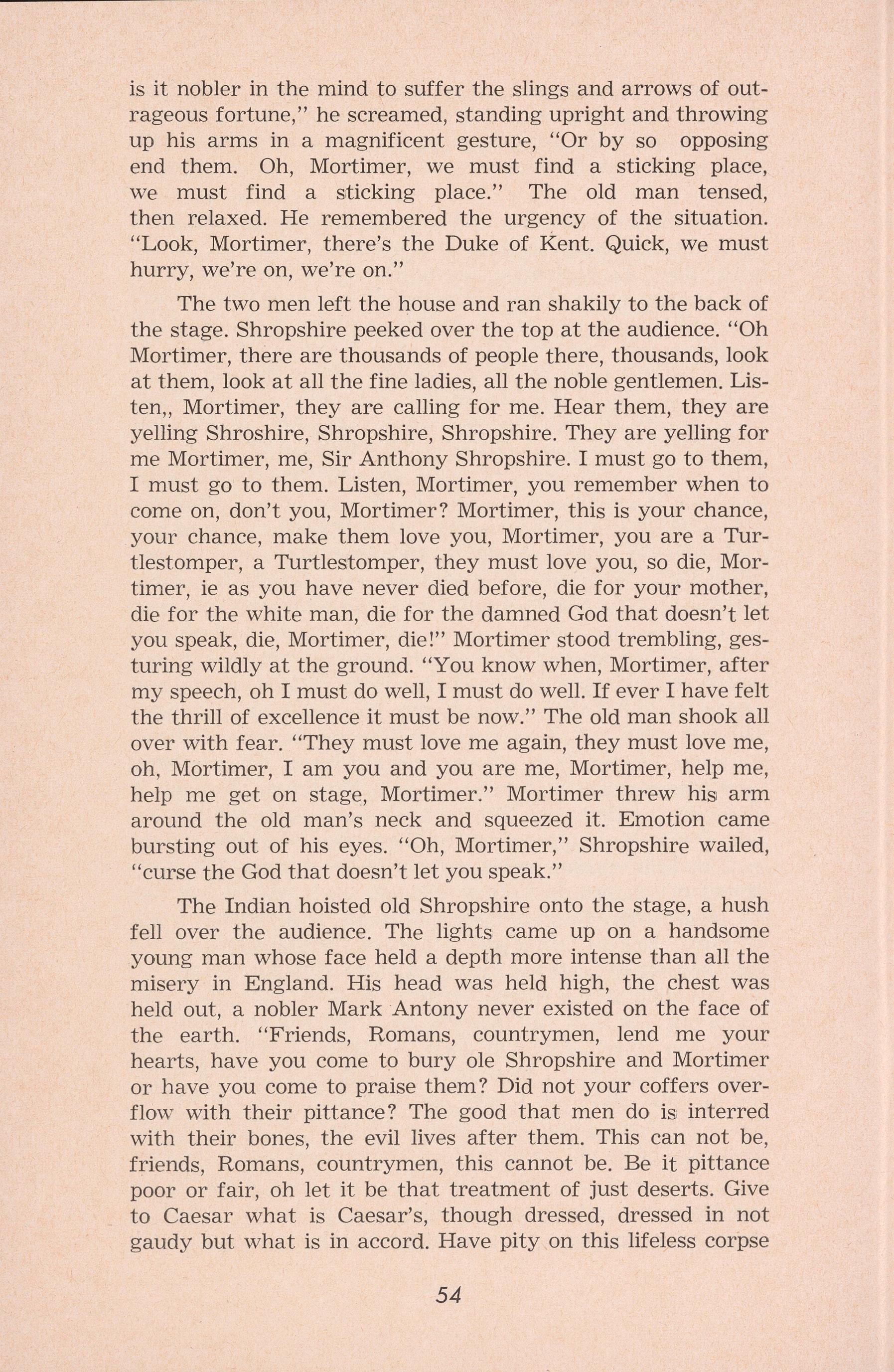
is it nobler in the mind to suffer the slings and arrows of outrageous fortune," he screamed, standing upright and throwing up his arms in a magnificent gesture, "Or by so opposing end them . Oh, Mortimer, we must find a sticking place, we must find a sticking place ." The old man tensed, then relaxed . He remembered the urgency of the situation. "Look, Mortimer, there's the Duke of Kent. Quick, we must hurry, we're on, we're on."
The two men left the house and ran shakily to the back of the stage. Shropshire peeked over the top at the audience . "Oh Mortimer, there are thousands of people there, thousands, look at them, look at all the fine ladies, all the noble gentlemen. Listen,, Mortimer, they are calling for me. Hear them, they are yelling Shroshire, Shropshire, Shropshire . They are yelling for me Mortimer, me, Sir Anthony Shropshire. I must go to them, I must go to them . Listen, Mortimer, you remember when to come on, don't you, Mortimer? Mortimer, this is your chance, your chance, make them love you, Mortimer, you are a Turtlestomper, a Turtles:tomper, they must love you, so die, Mortimer, ie as you have never died before, die for your mother, die for the white man, die for the damned God that doesn't let you speak, die, Mortimer, die!" Mortimer stood trembling, gesturing wildly at the ground. "You know when, Mortimer, after my speech, oh I must do well, I must do well. If ever I have felt the thrill of excellence it must be now." The old man shook all over with fear. "They must love me again, they must love me, oh, Mortimer, I am you and you are me, Mortimer, help me, help me get on stage, Mortimer." Mortimer threw his 1 arm around the old man's neck and squeezed it. Emotion came bursting out of his eyes. "Oh, Mortimer," Shropshire wailed, "curse the God that doesn't let you speak."
The Indian hoisted old Shropshire onto the stage, a hush fell over the audience. The lights came up on a handsome young man whose face held a depth more intense than all the misery in England. His head was held high, the chest was held out, a nobler Mark Antony never existed on the face of the earth. "Friends, Romans, countrymen, lend me your hearts, have you come to bury ole Shropshire and Mortimer or have you come to praise them? Did not your coffers overflow with their pittance? The good that men do is interred with their bones, the evil lives after them. This can not be, friends, Romans, countrymen, this cannot be. Be it pittance poor or fair, oh let it be that treatment of just deserts. Give to Caesar what is Caesar's, though dressed, dressed in not gaudy but what is in accord. Have pity on this lifeless corpse

that lies before me. Et tu Brute. Slay Brutus," the old man screamed, "slay Brutusi, slay Brutus, slay Brutus." The lights focused on the imploring body of Mark Antony. He made a gesture beginning at the stage floor with his hands and sweeping to the heavens itself. "And if this fails, if this fails and avails us not we must find a sticking place." The old man screamed, "we must find a sticking place." The music went up and crashed at the peak of his movement. His voice became drawnout and mournful. "Mortimer, he wailed, his hands clasped under his chin, his eyes reached toward the sky, "Mortimer." The music stopped suddenly, the old man's head bowed, his lips were silent. The audience was moved, they shouted their cheers of sorrow, their voices swamped the auditorium. "Mortimer," they called, "Mortimer." Mortimer moved to the top of the rock. A quiet came over the multitude. Mortimer poised center stage, no one dared move, no one dared speak. Mortimer started and then stopped. Could it be true? Could there be a little voice coming from the woods? No it couldn't but it was, it was singing a child's song. Closer and closer it came. How dare it interrupt! Mortimer and Shropshire stared in the direction of the woods. A small girl came bounding out and crossed to the middle of the field. She was gayly singing to herself. Shropshire watched with disbelief. "I say there little girl," he called out. "Little girl, you are interrupting the performance." The little girl looked around her, he looked at the woods, the lifeless boulder, the daffodils at her feet.
"What performance, sir?" she asked innocently "Why, our perfromance," yelled Shropshire, perturbed. "All the people out there want to see our performance."
"What people, sir?" she asked.
Shropshire was beside himself with anxiety, he fairly screamed. "All the people out there, you little idiot, all the people right where you're standing."
"There are no people here, sir."
"Yes, yes, there are, thousands, there's the countess and there's Mr. Russell and look at all the fine ladies and fine gentlemen."
"I beg your pardon, sir, there are no people here."
"Yes, yes there are, they must be, of course there are, Oh they must be here."
"There are no people here, sir," the frightened little girl said meekly and ran into the woods. Shropshire looked stunned. "There are no people here," he said.
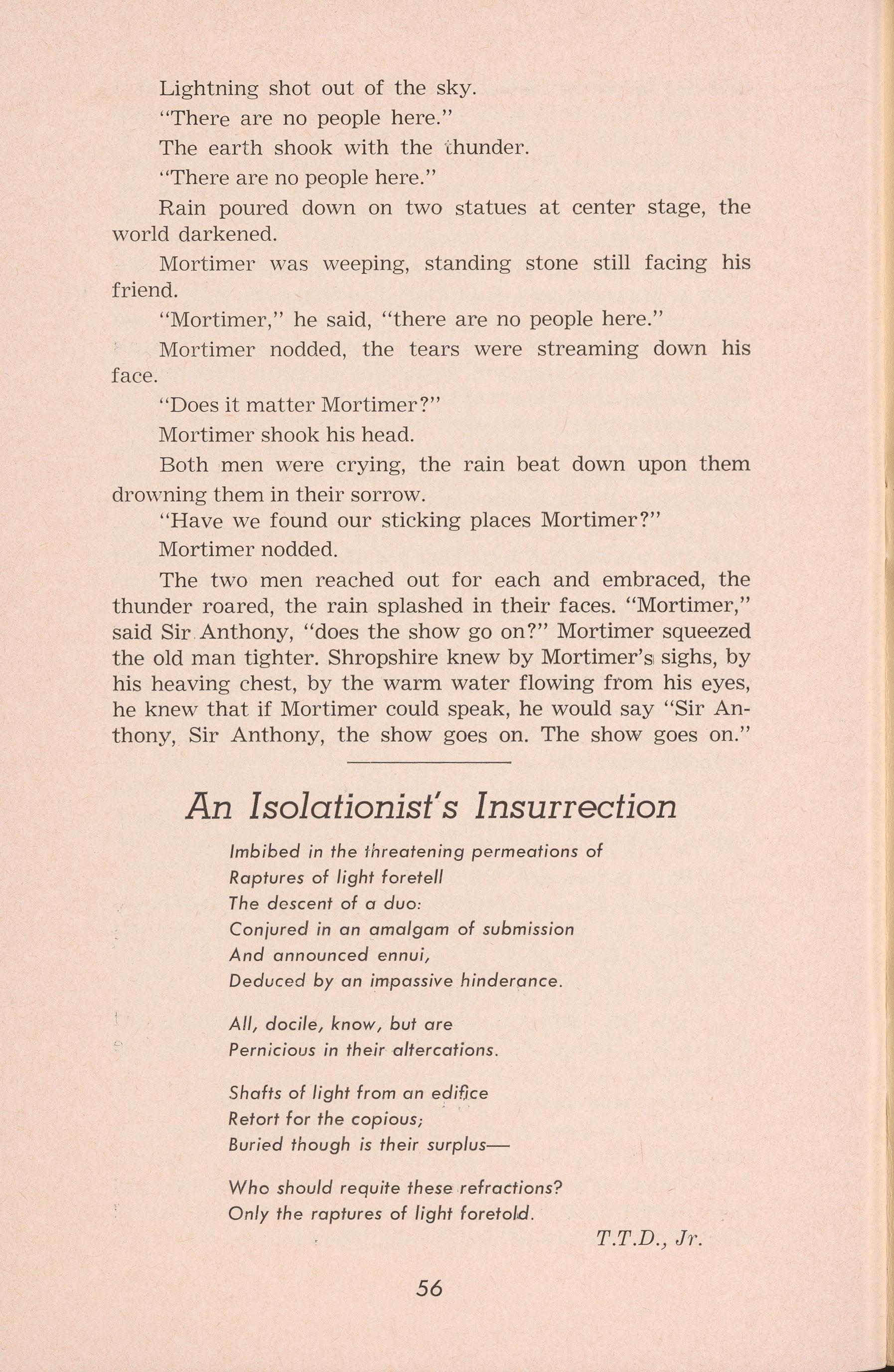
Lightning shot out of the sky.
"There are no people here."
The earth shook with the thunder.
"There are no people here."
Rain poured down on two statues at center stage, the world darkened.
"Mortimer," he said, "there are no people here."
Mortimer nodded, the tears were streaming down his
Mortimer was weeping, standing stone still facing his friend. face.
"Does it matter Mortimer?"
Mortimer shook his head.
Both men were crying, the rain beat down upon them drowning them in their sorrow.
"Have we found our sticking places Mortimer?"
Mortimer nodded.
The two men reached out for each and embraced, the thunder roared, the rain splashed in their faces. "Mortimer," said Sir Anthony, "does the show go on?" Mortimer squeezed the old man tighter. Shropshire knew by Mortimer's 1sighs, by his heaving chest, by the warm water flowing from his eyes, he knew that if Mortimer could speak, he would say "Sir Anthony, Sir Anthony, the show goes on. The show goes on."
Imbibed in the threatening permeations of Raptures of light foretell
The descent of a duo:
Conjured in on amalgam of submission
And announced ennu~
Deduced by on impassive hinderonce .
All, docile, know, but are Pernicious in their altercations.
Shafts of light from on edif}ce
Retort for the copious;
Buried though is their surplus-
Who should requite these refractions?
Only the raptures of light foretold .
T.T.D., Jr.

